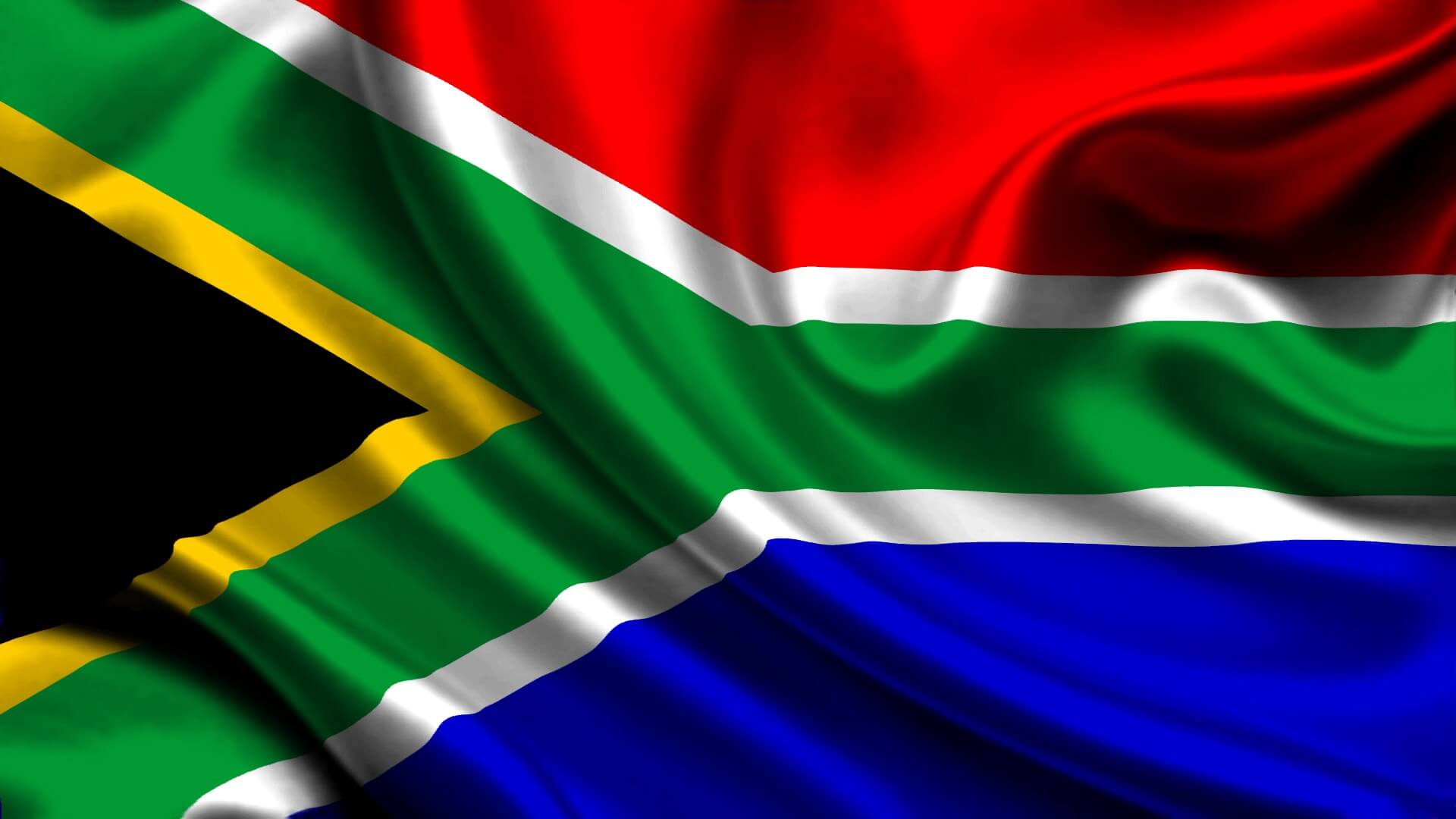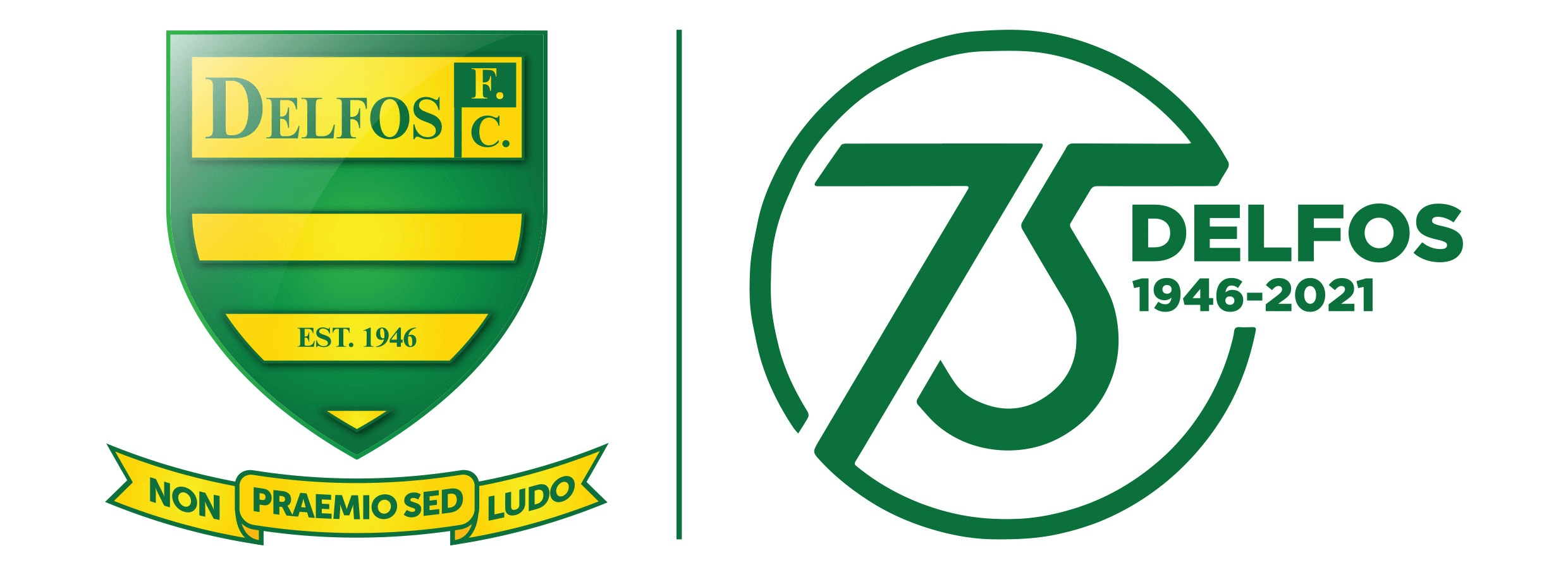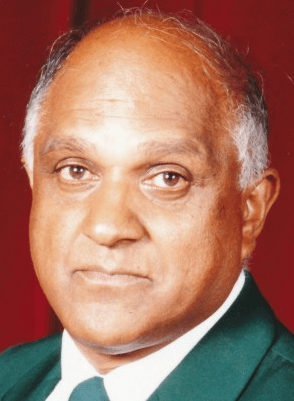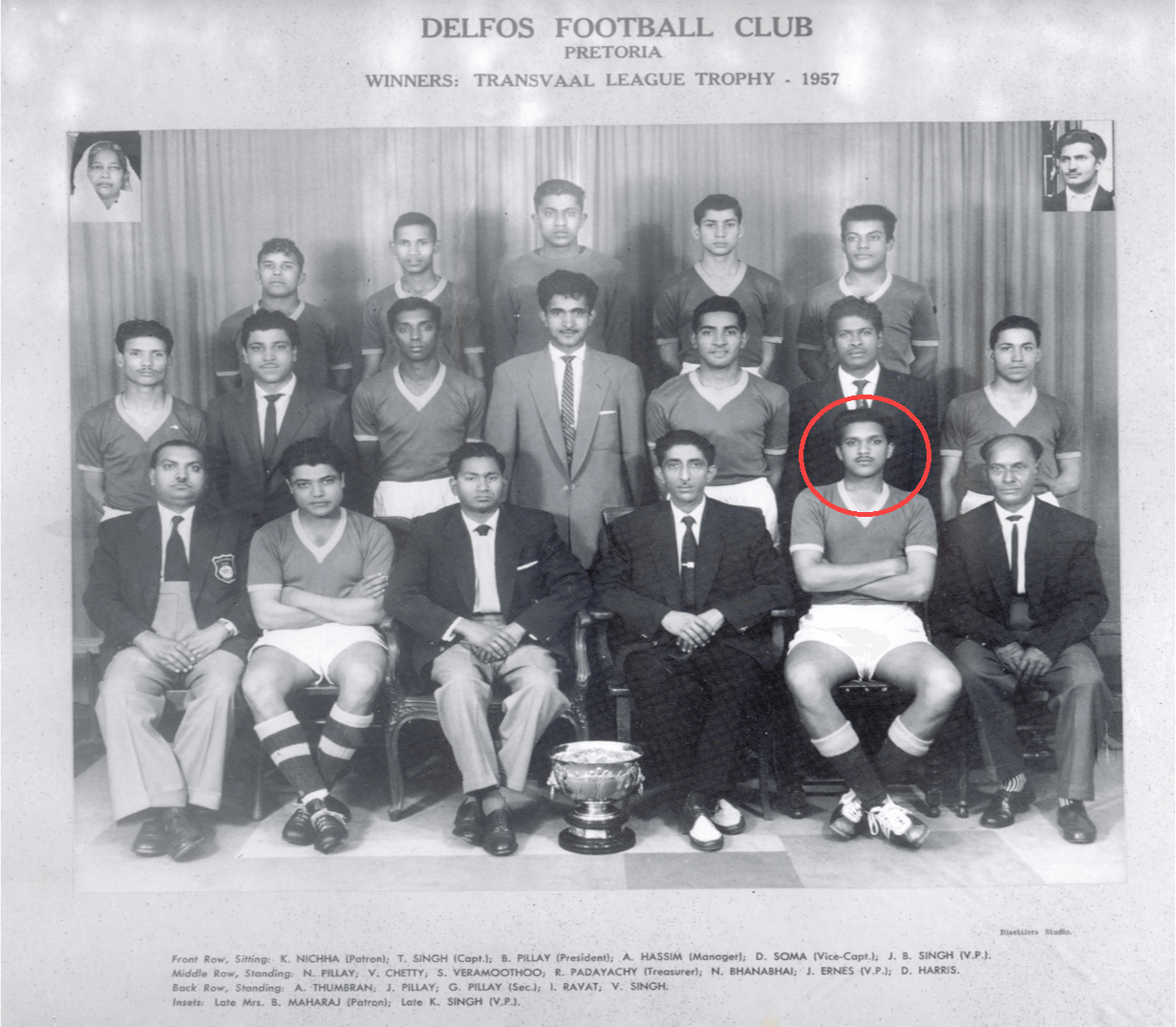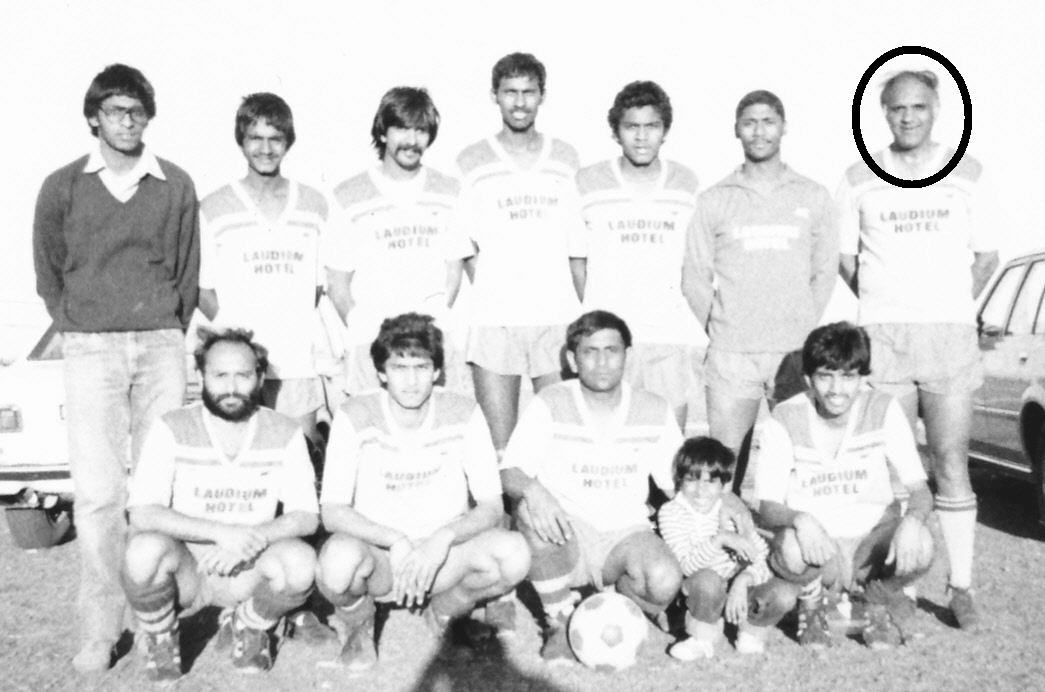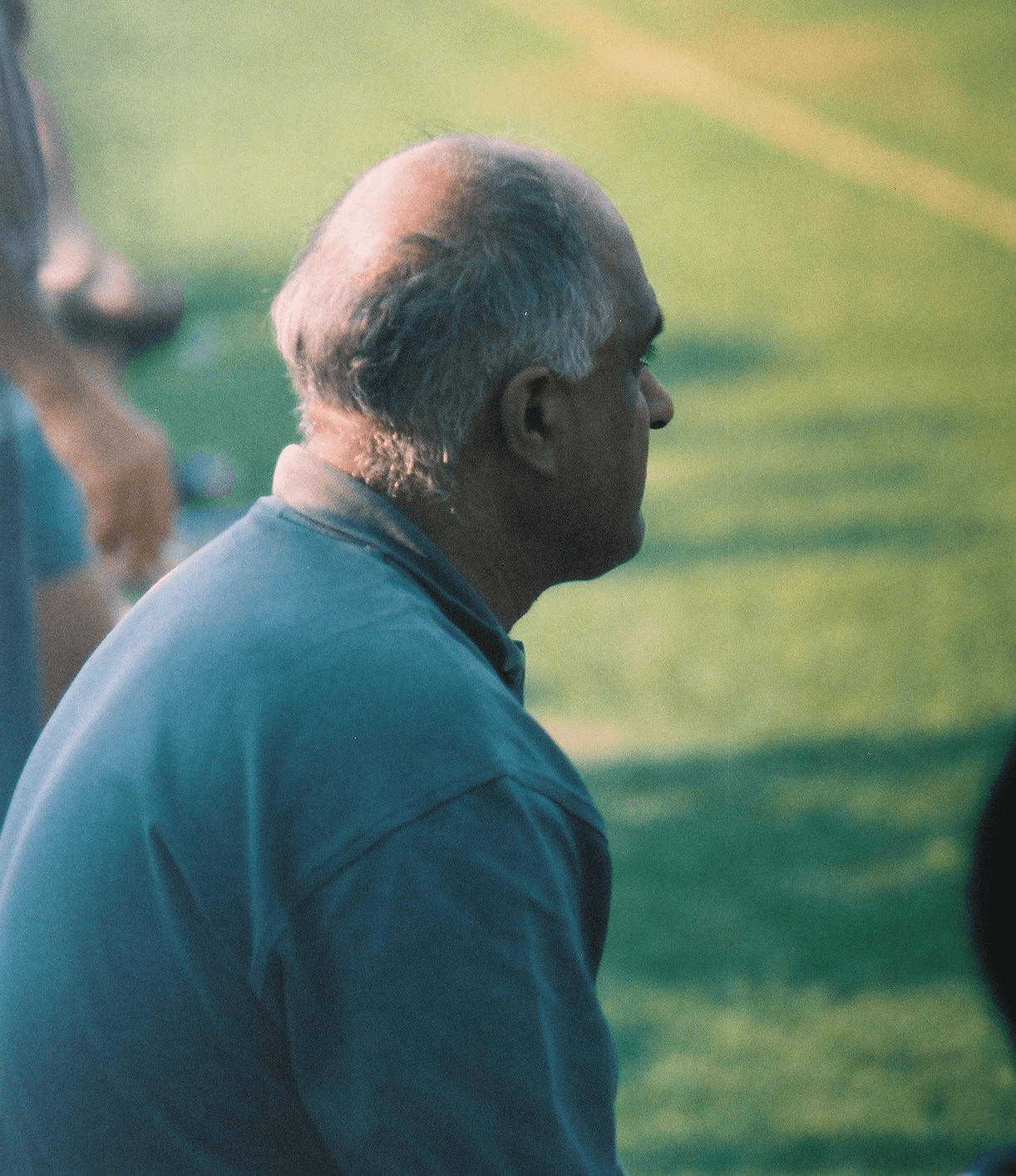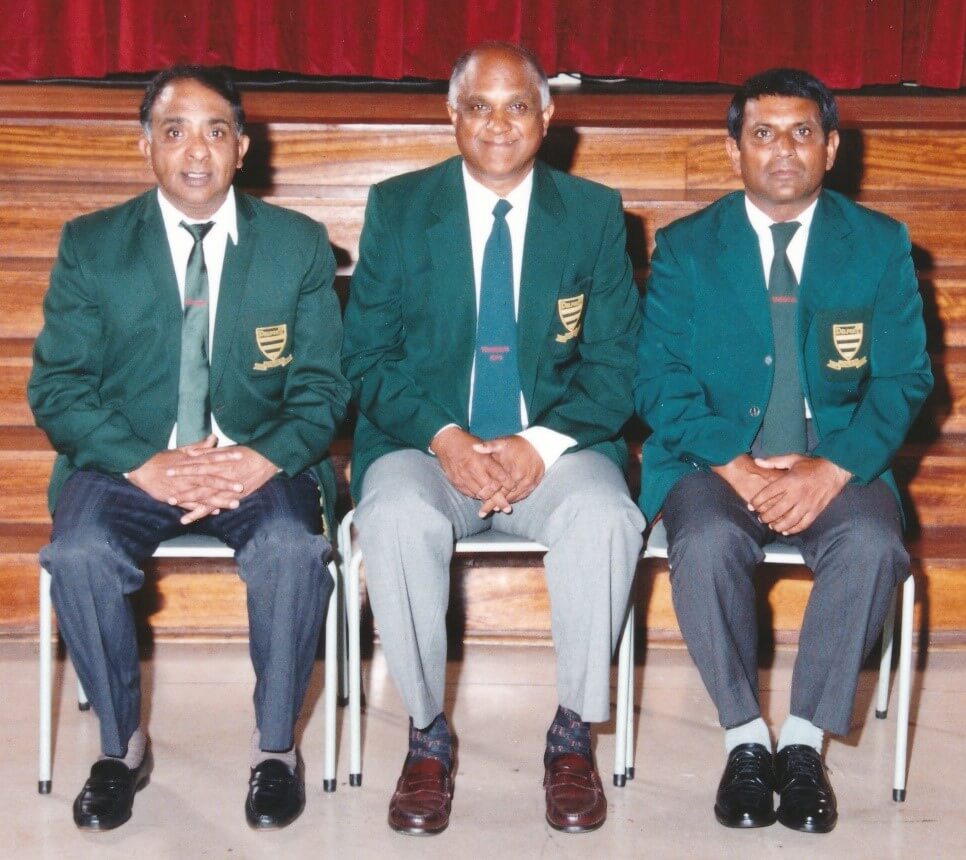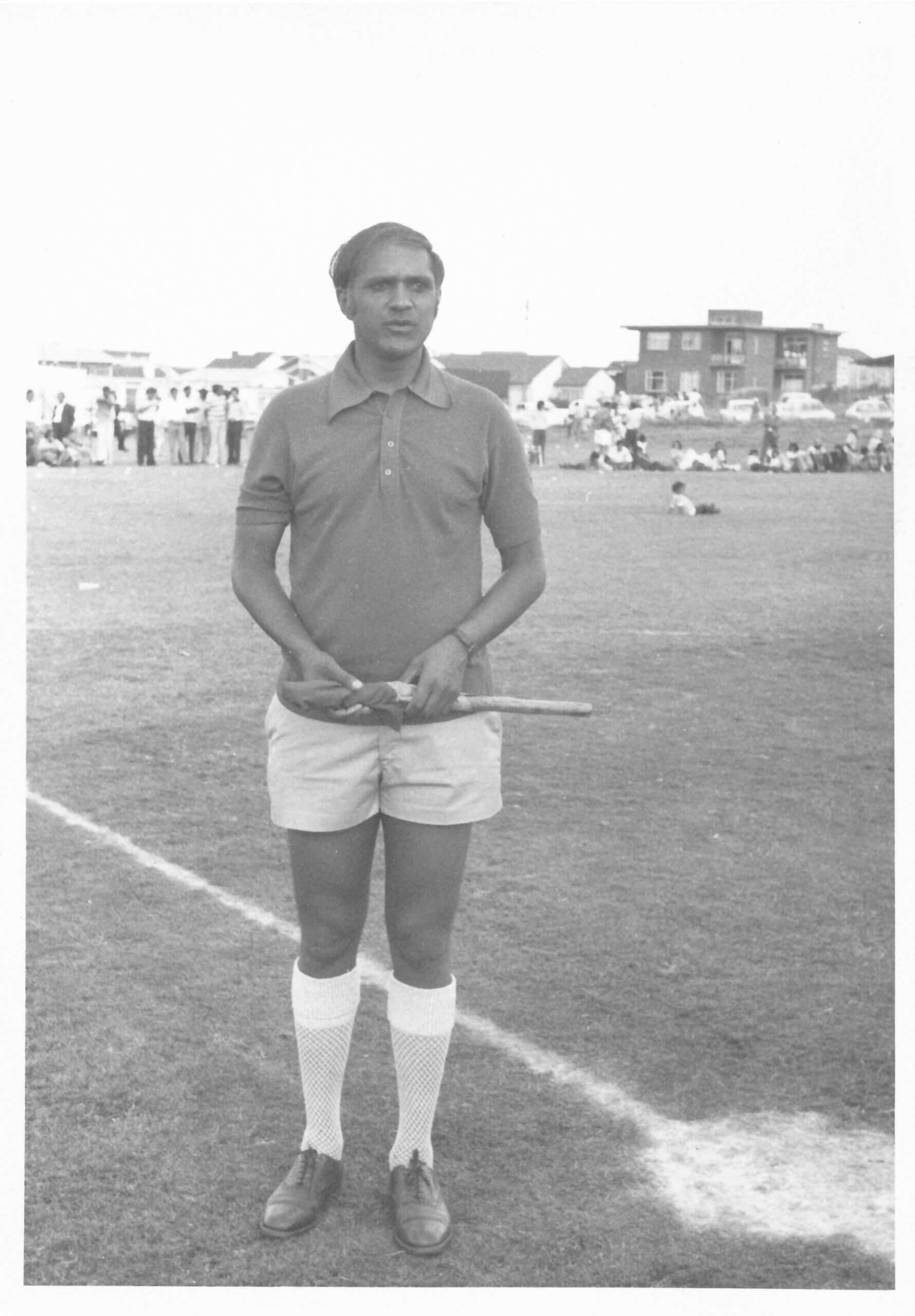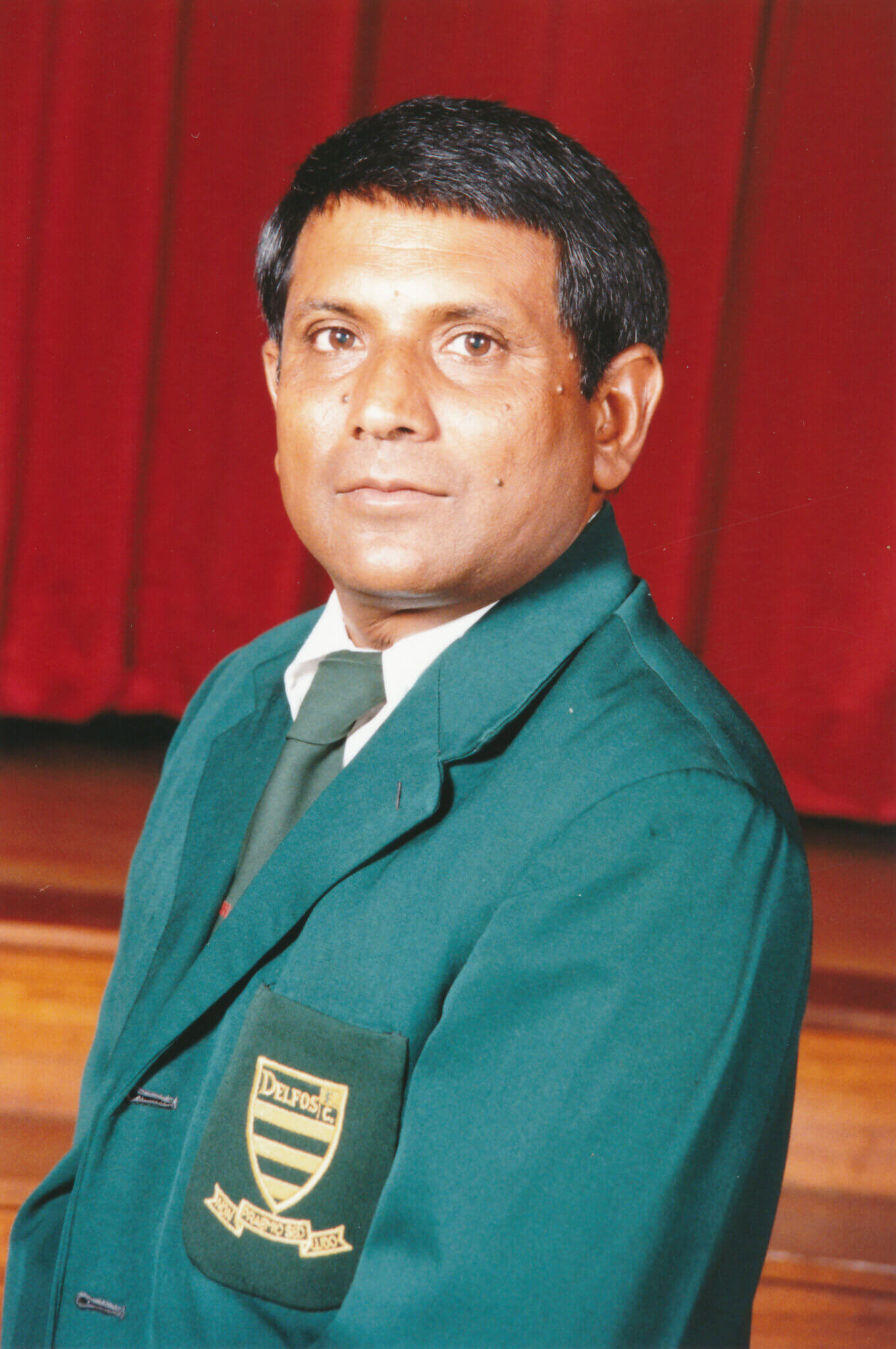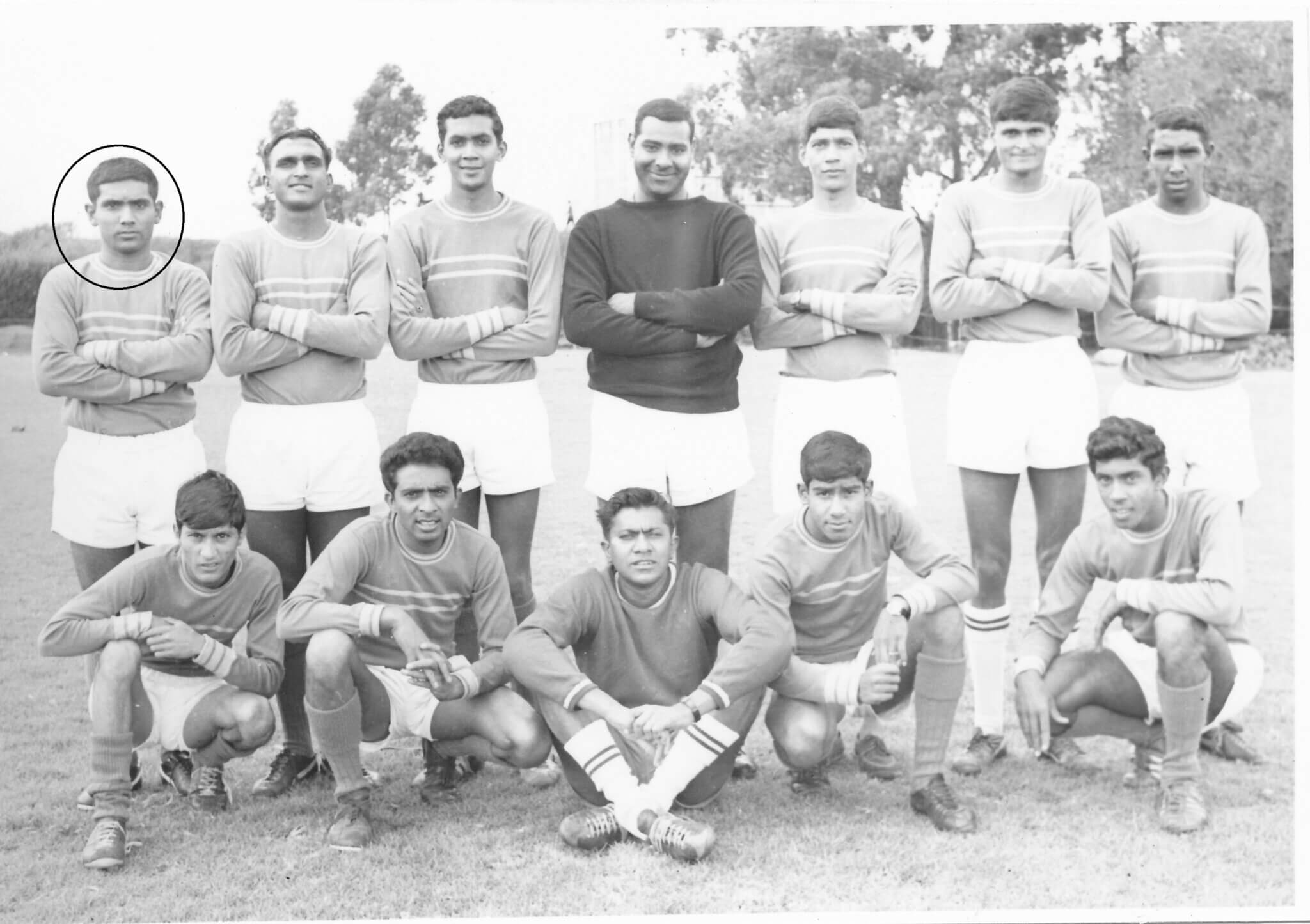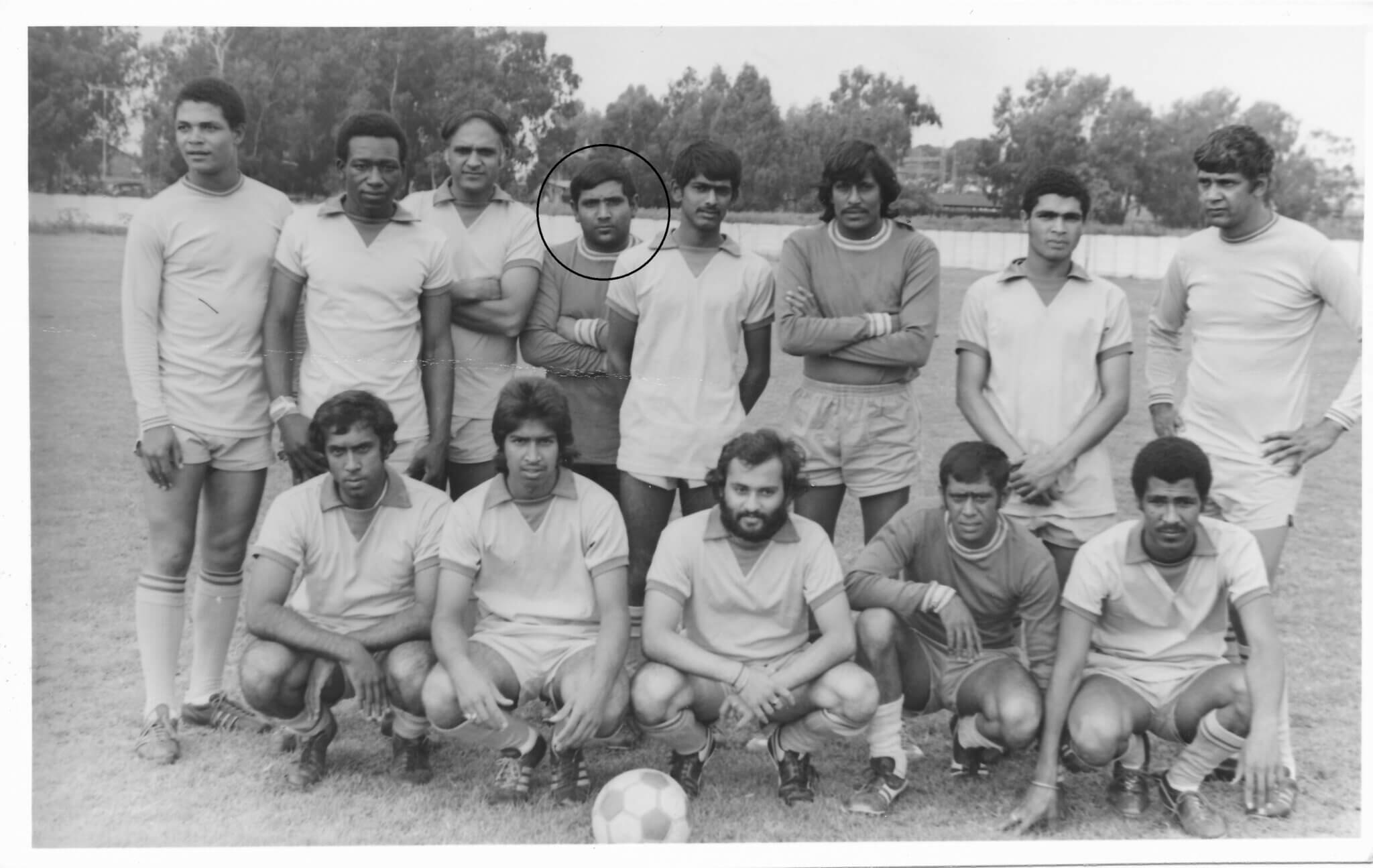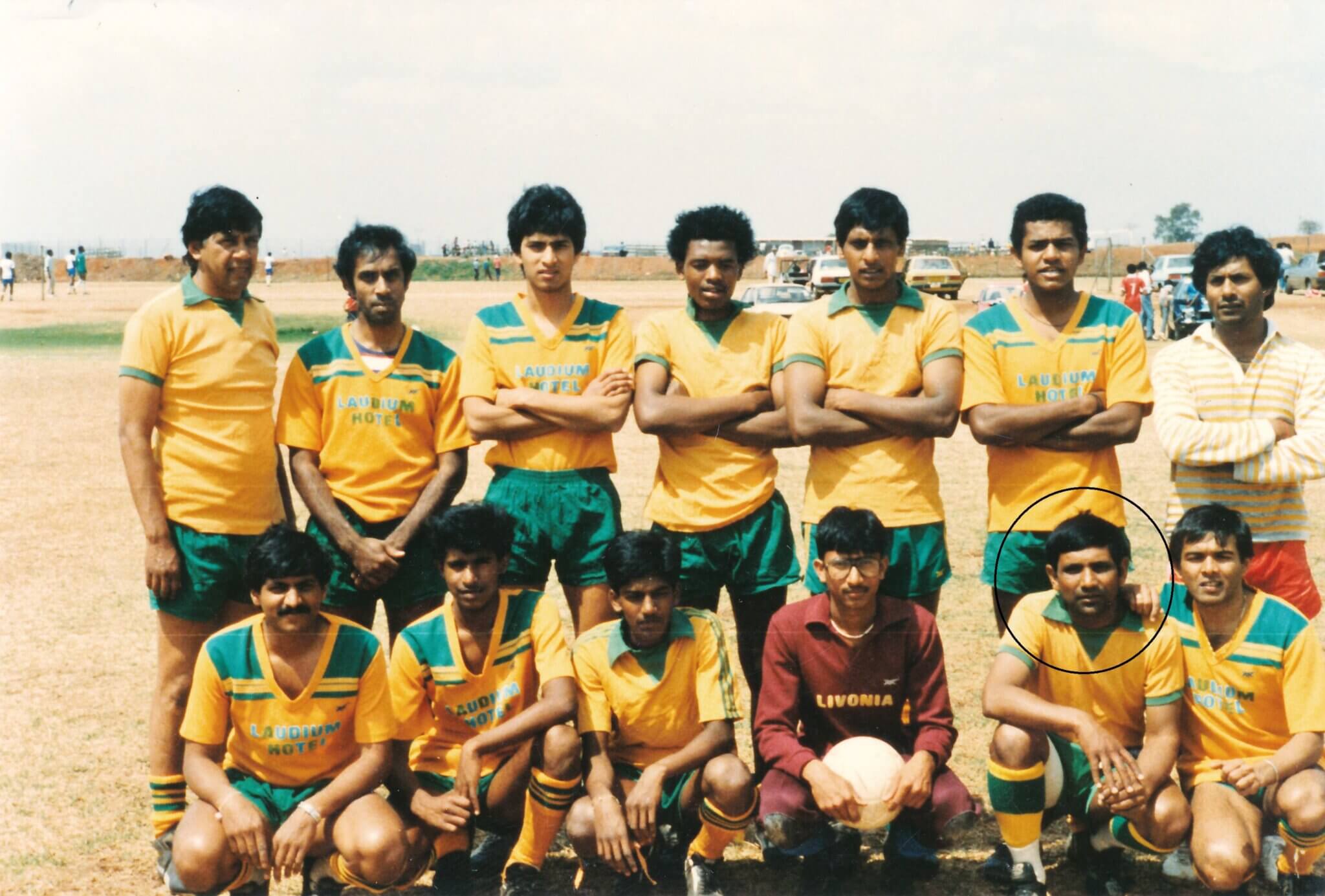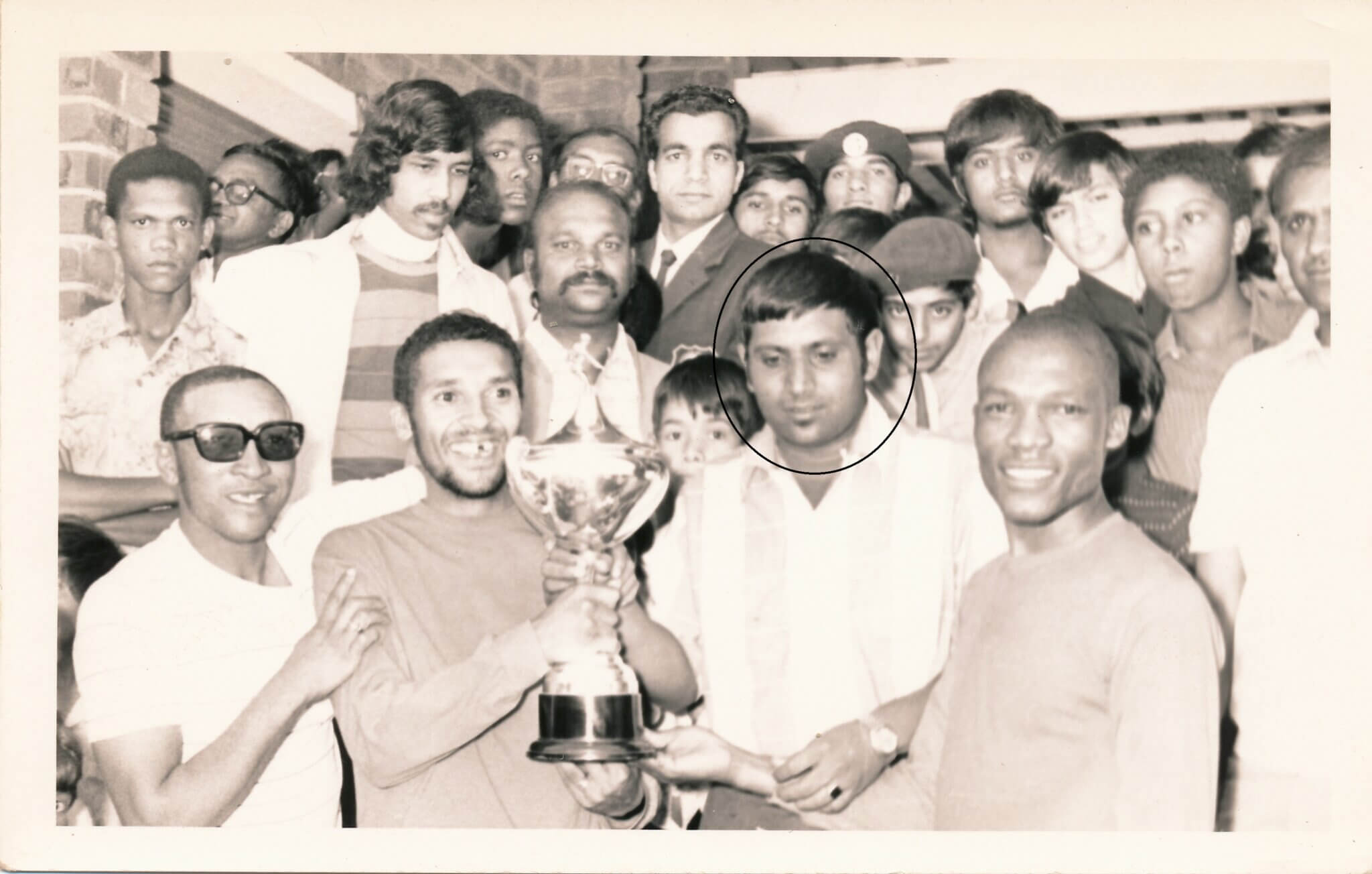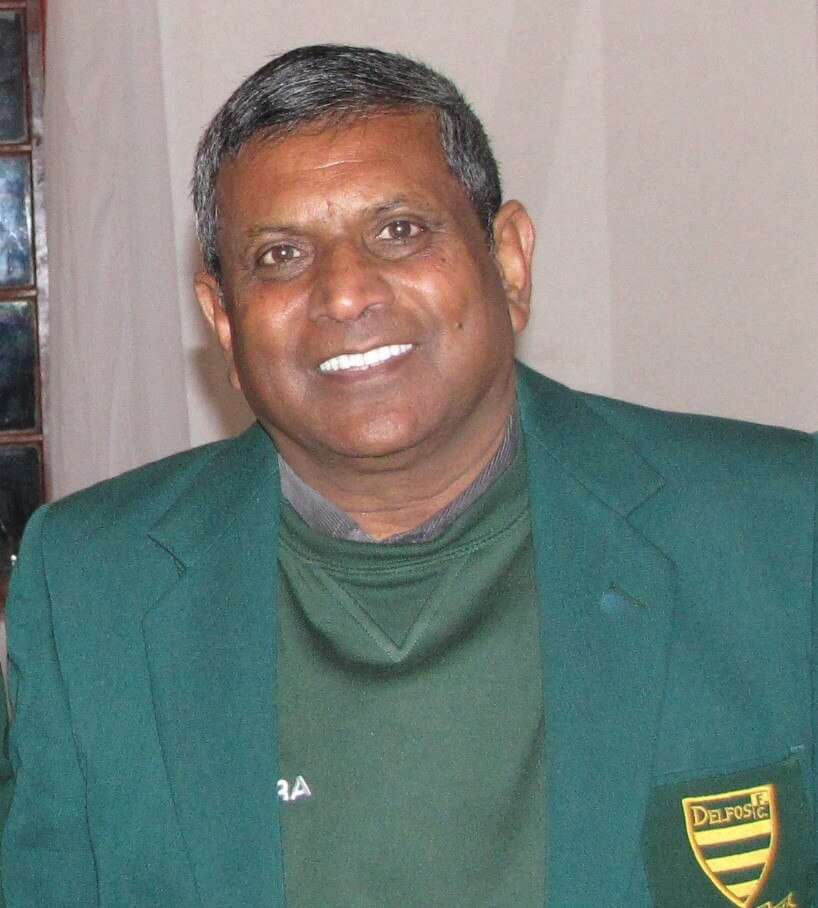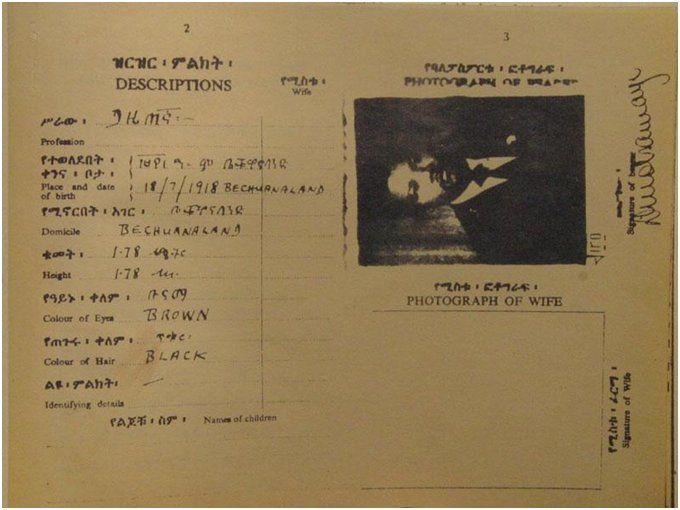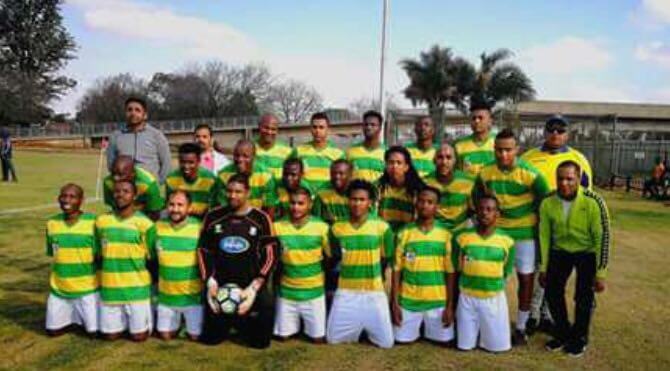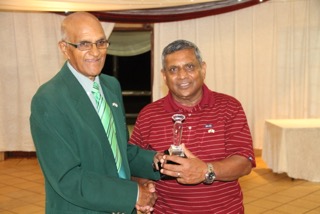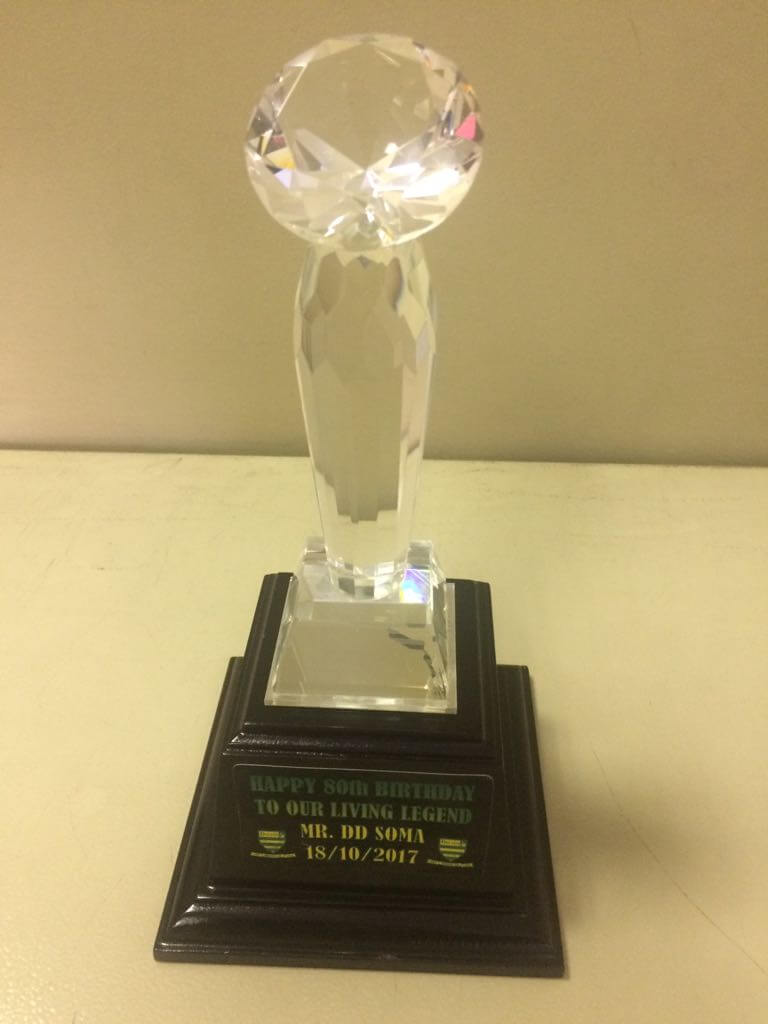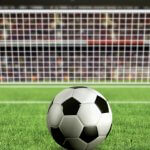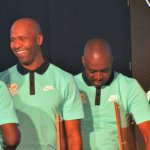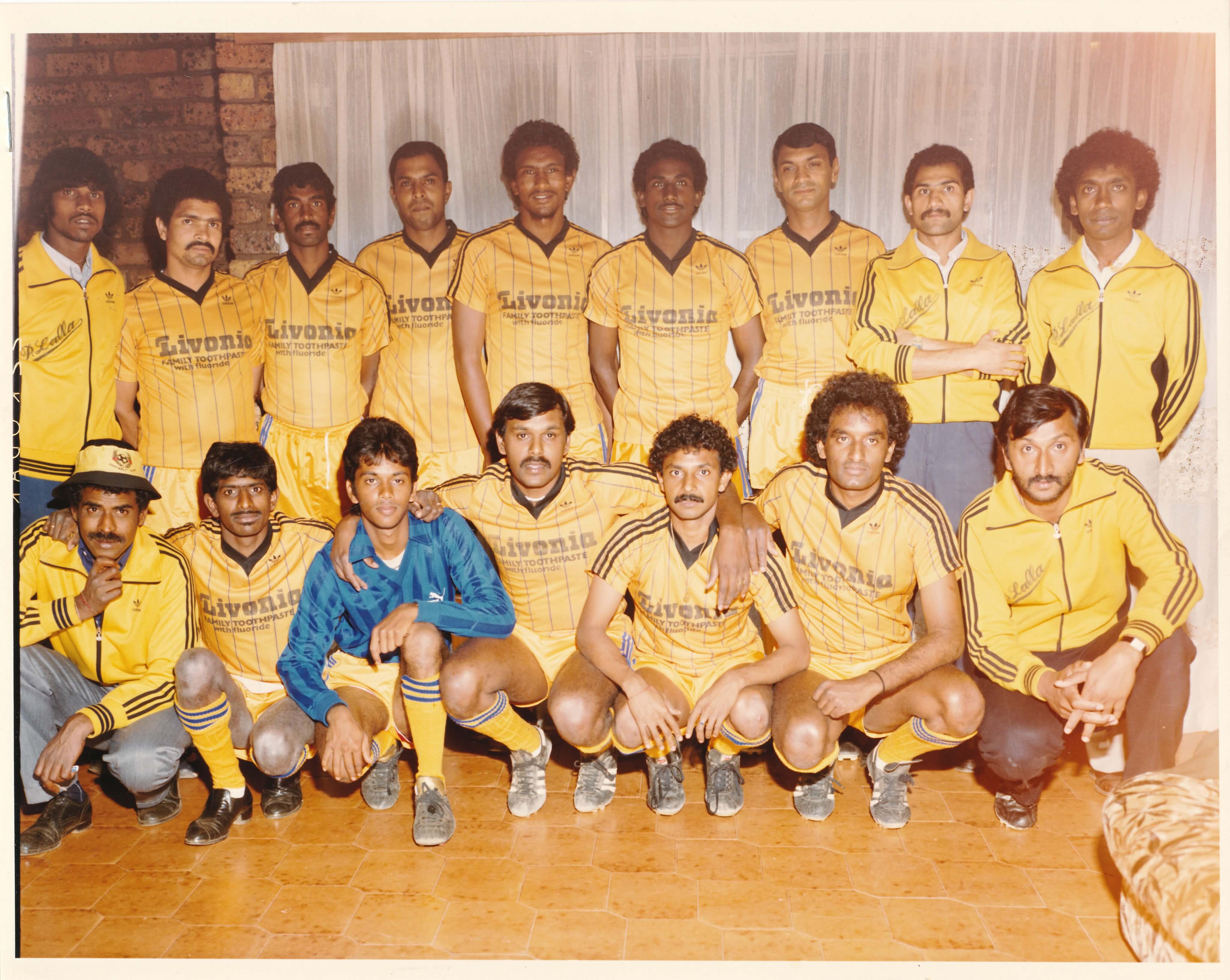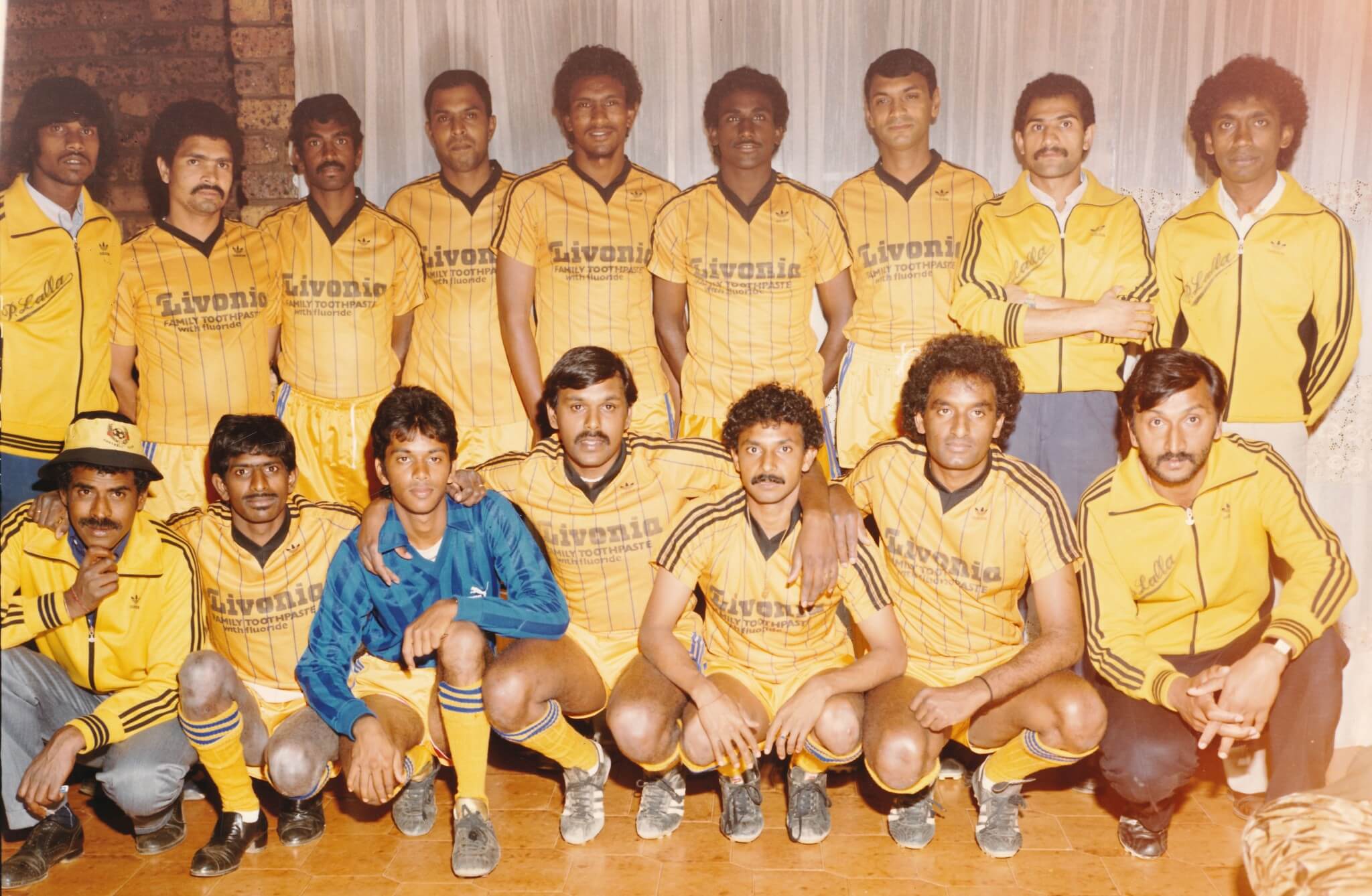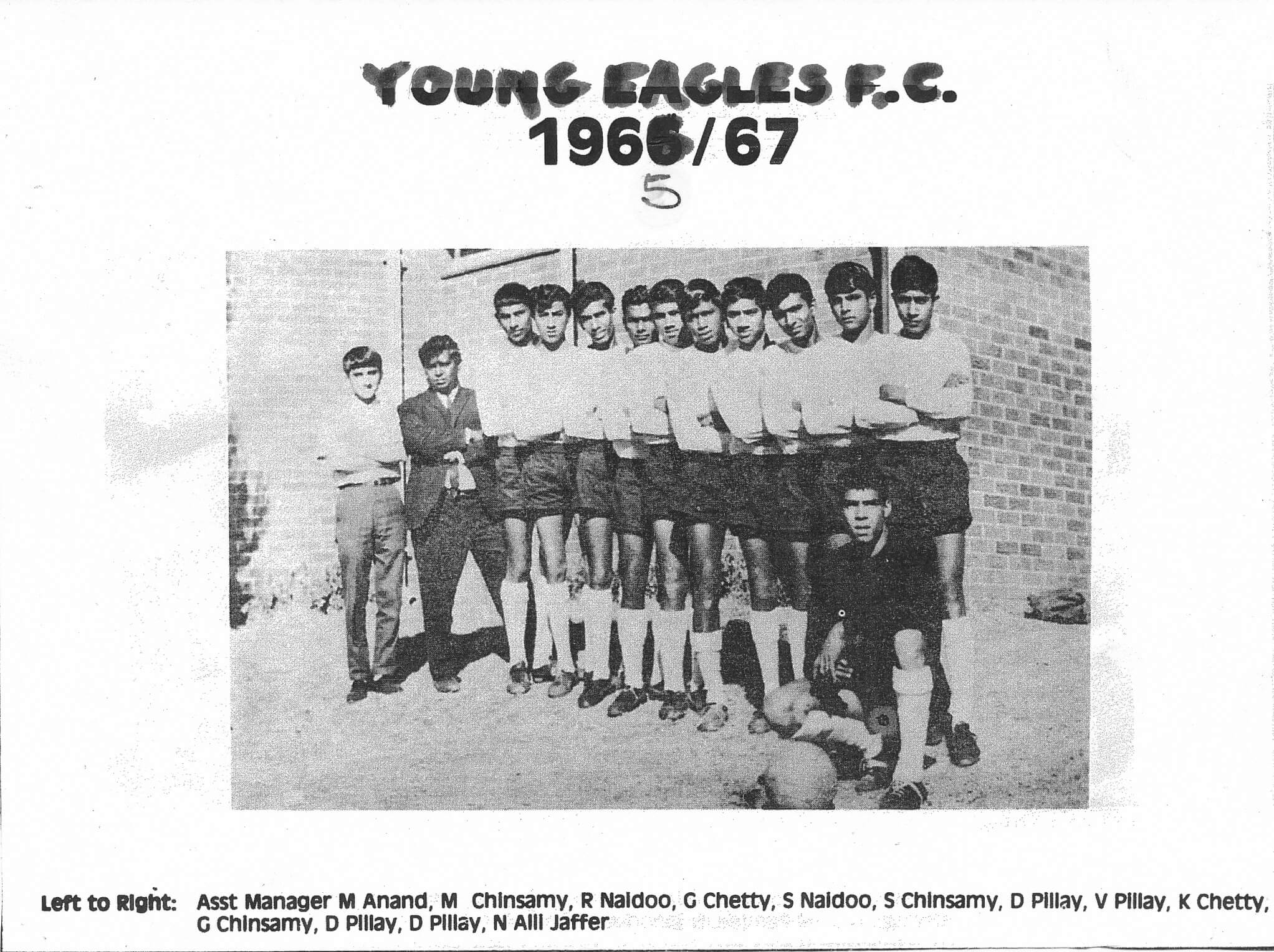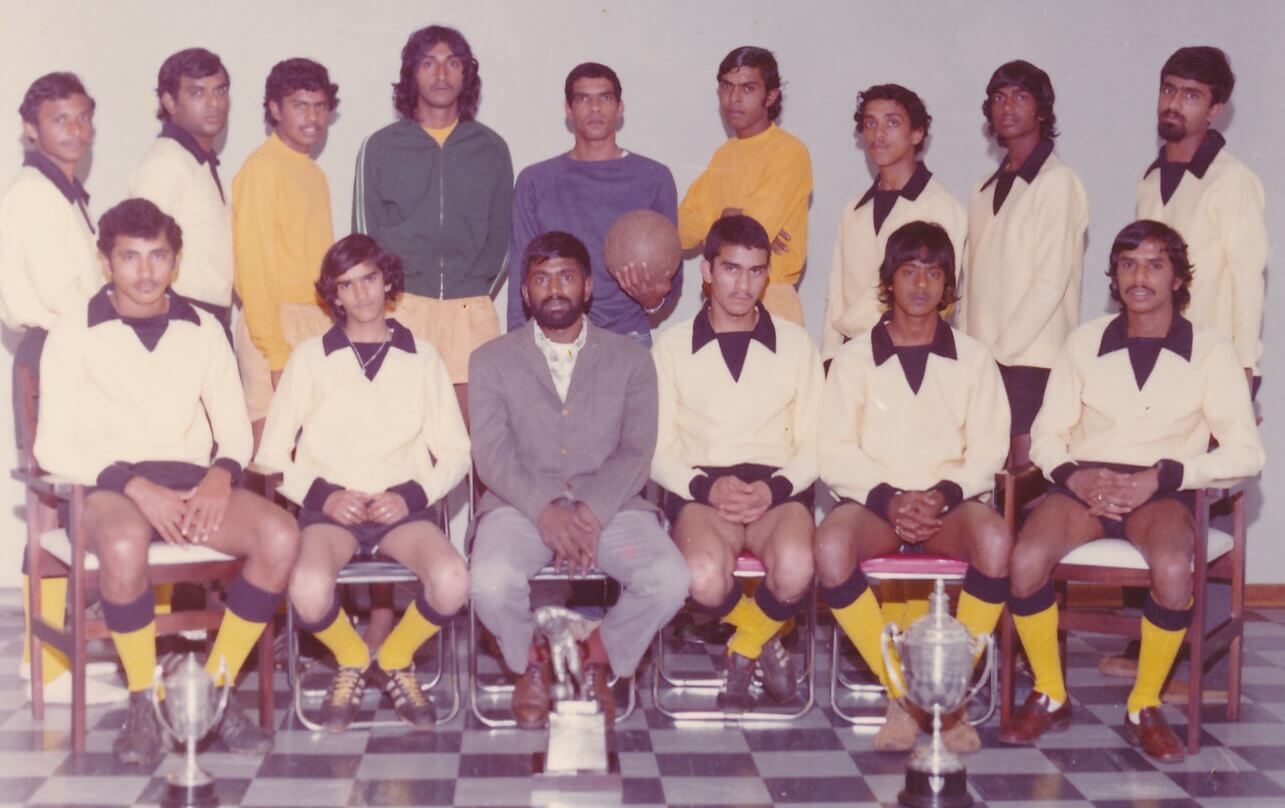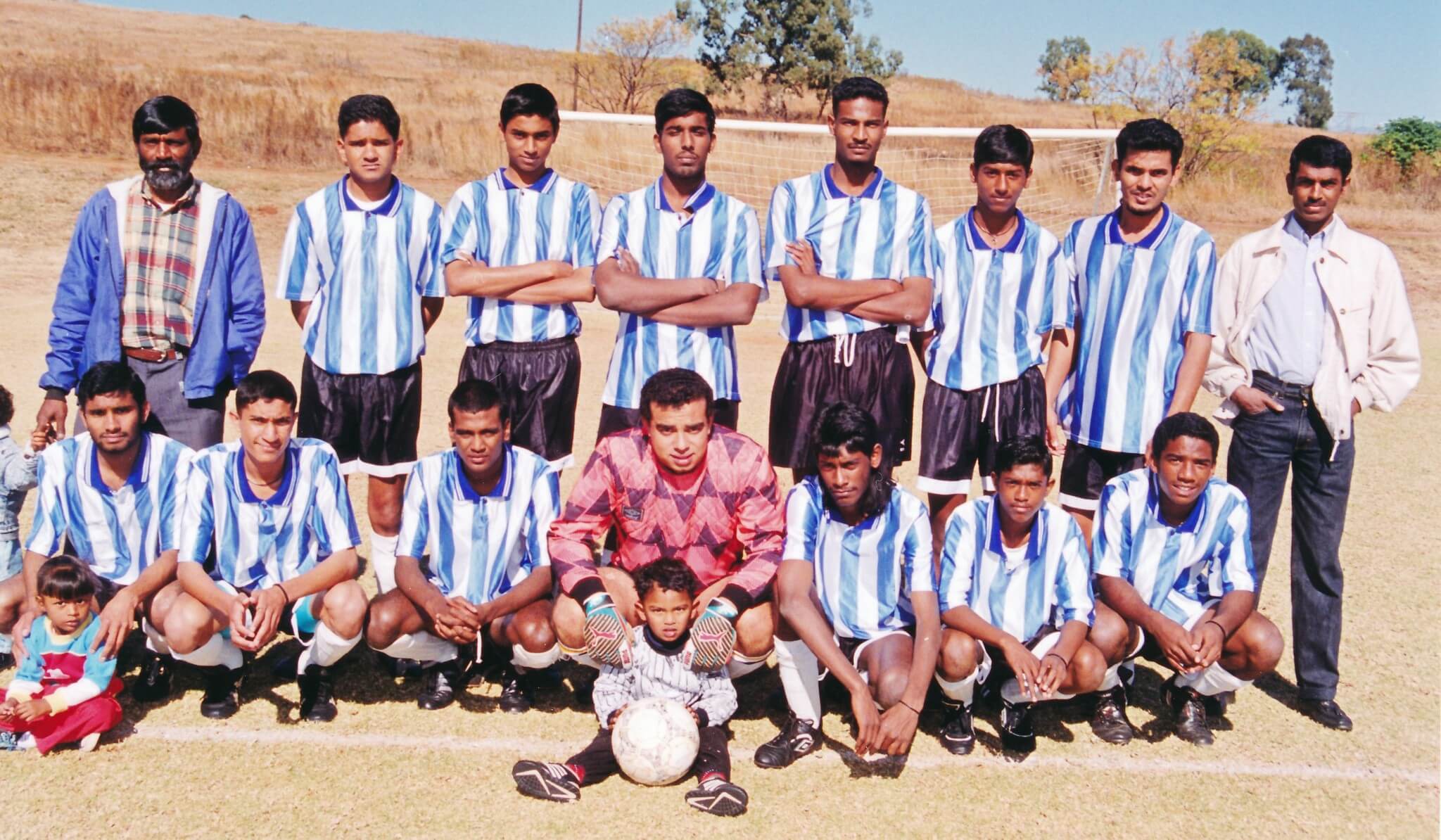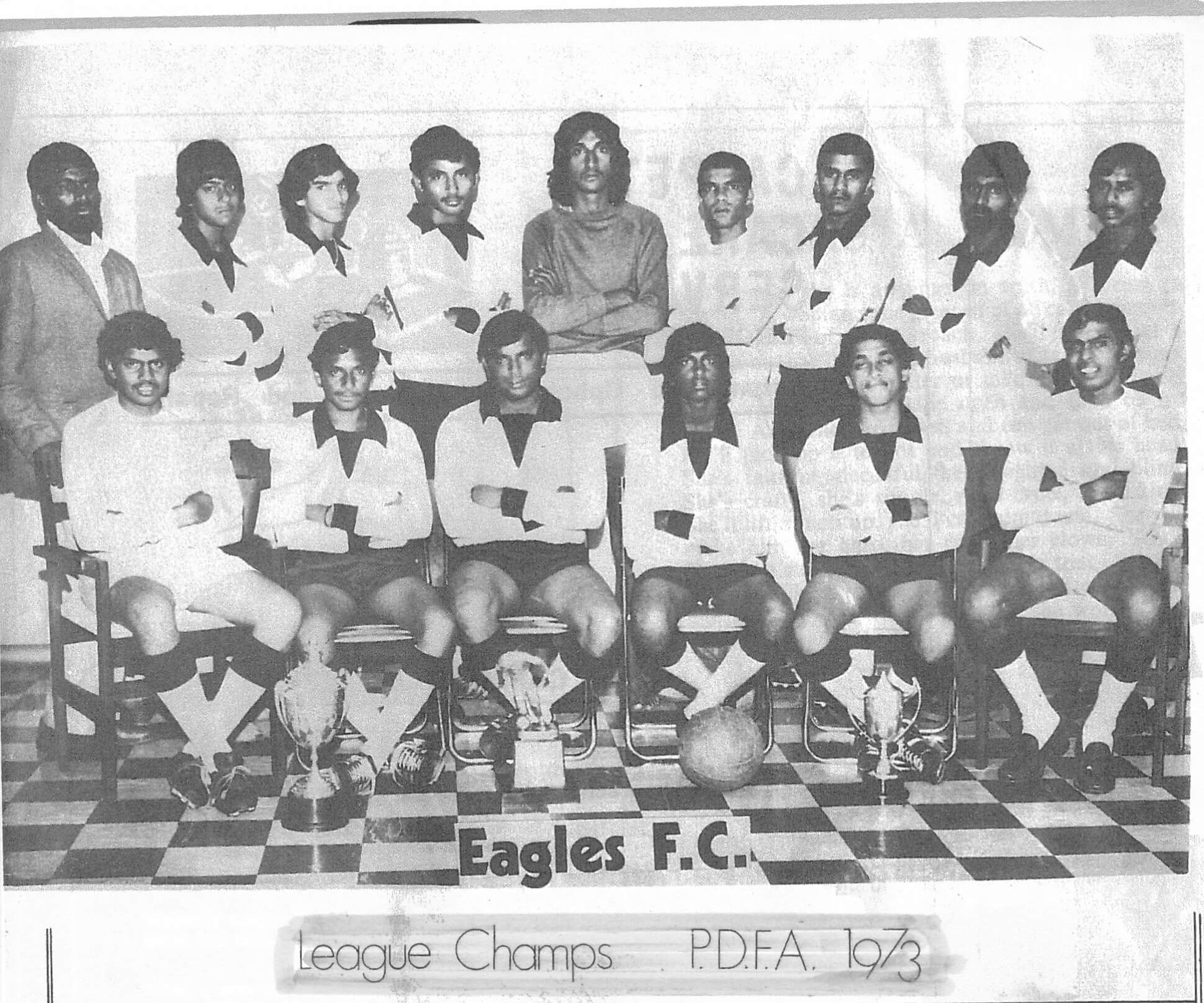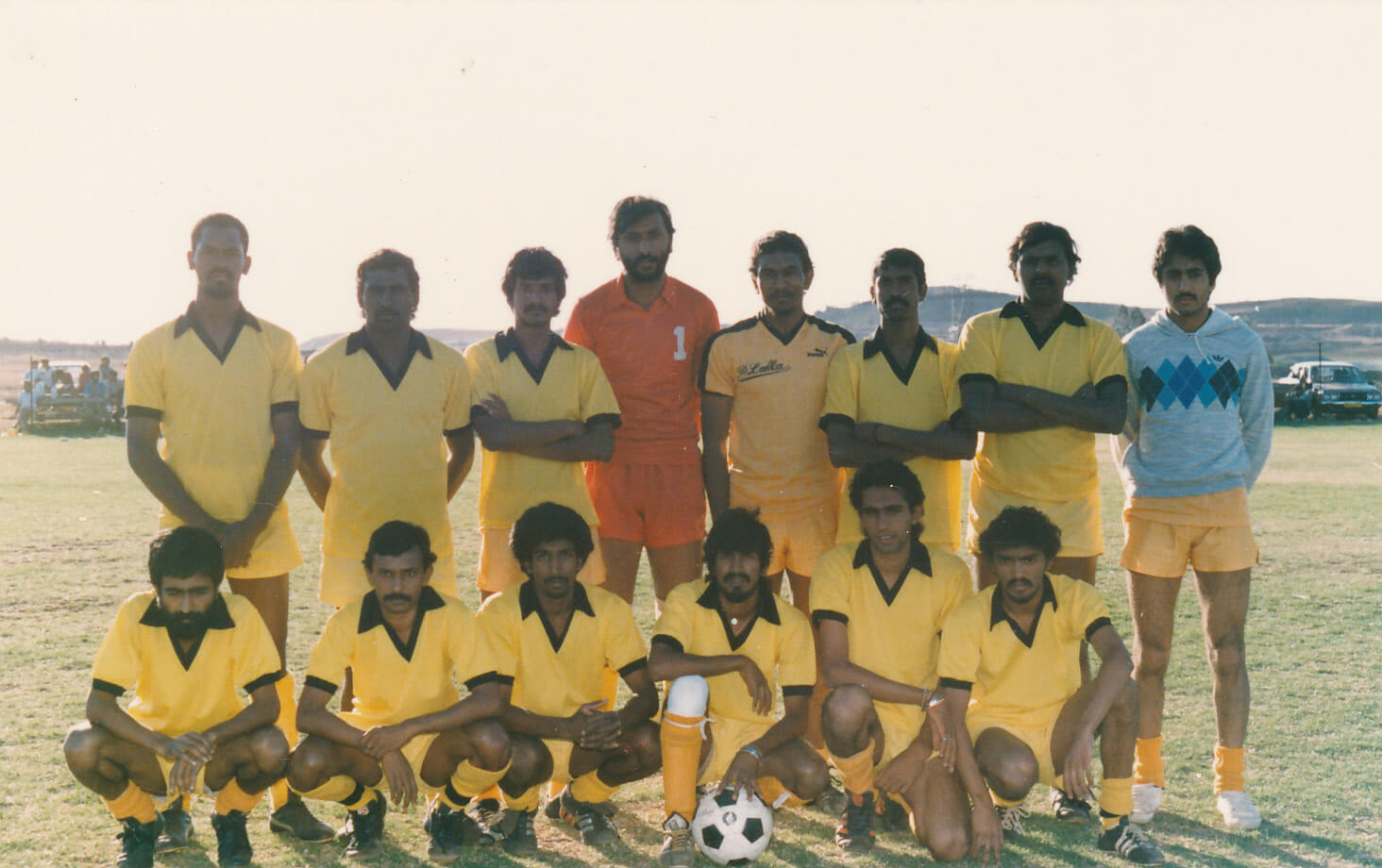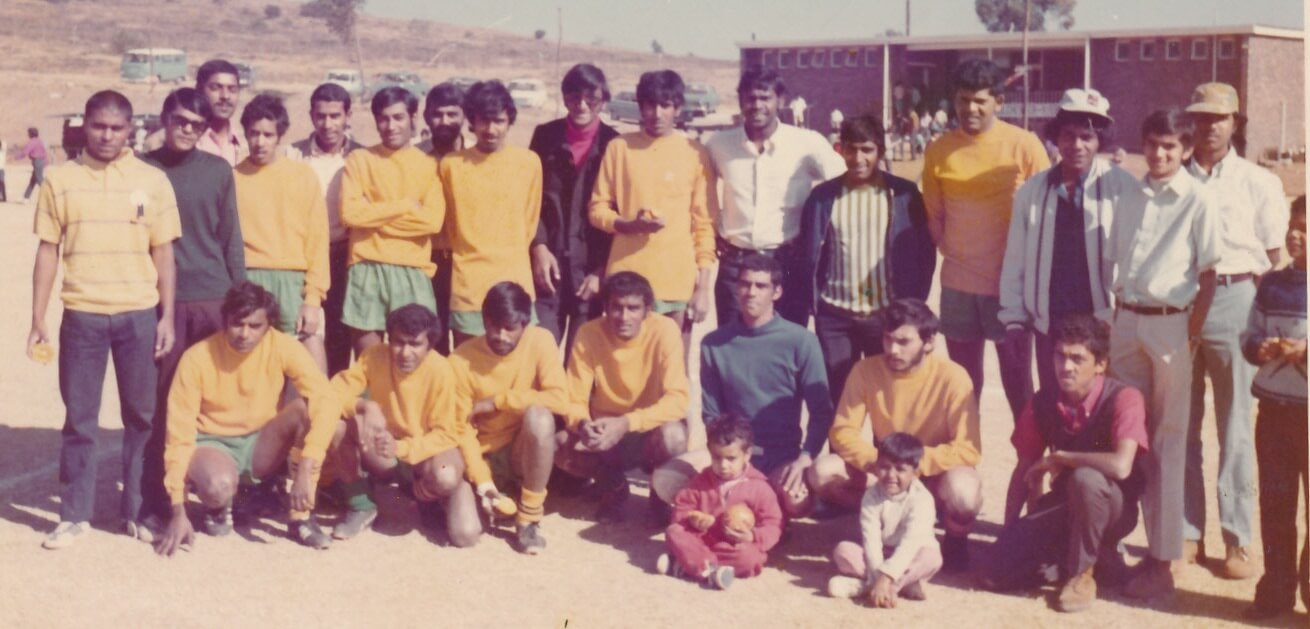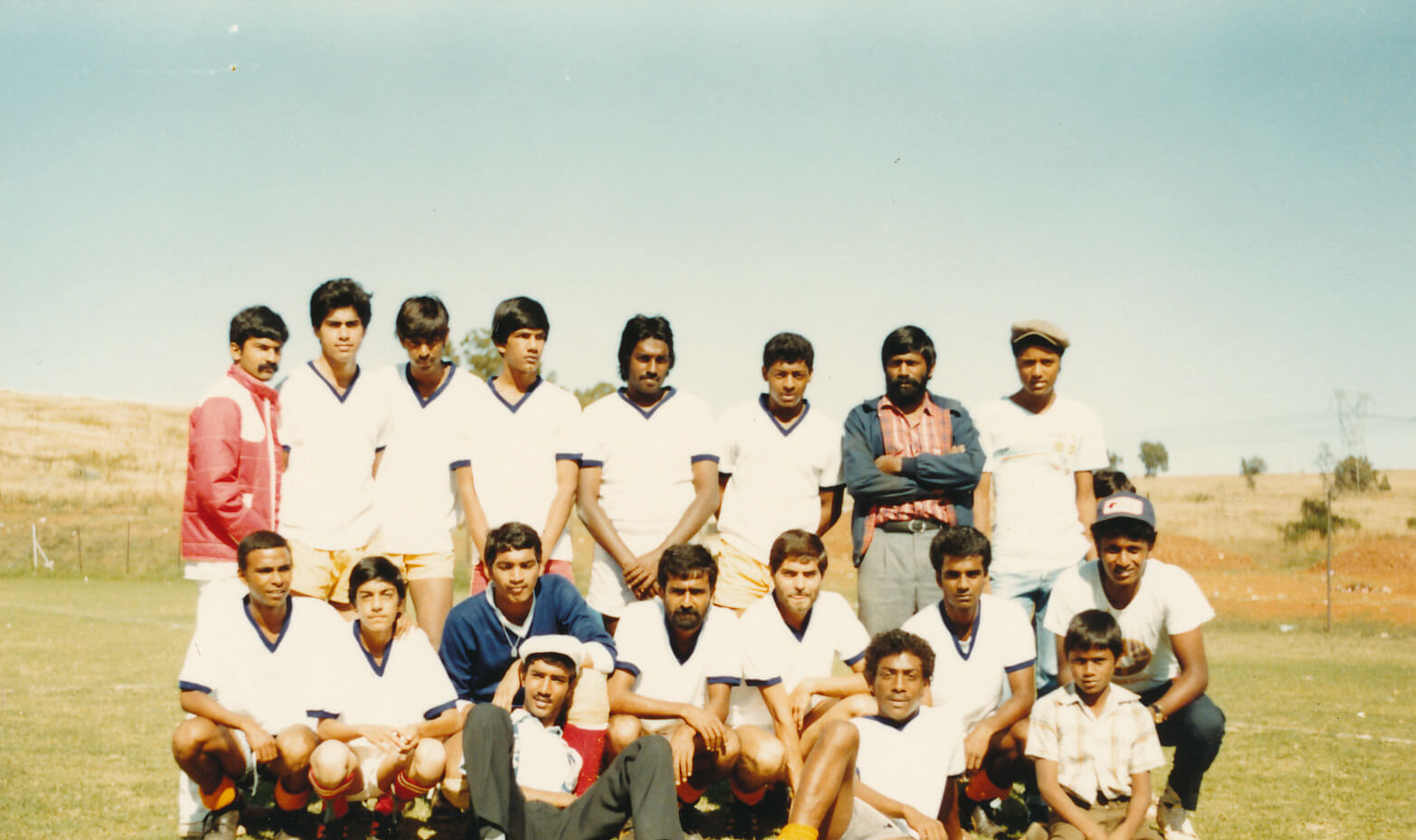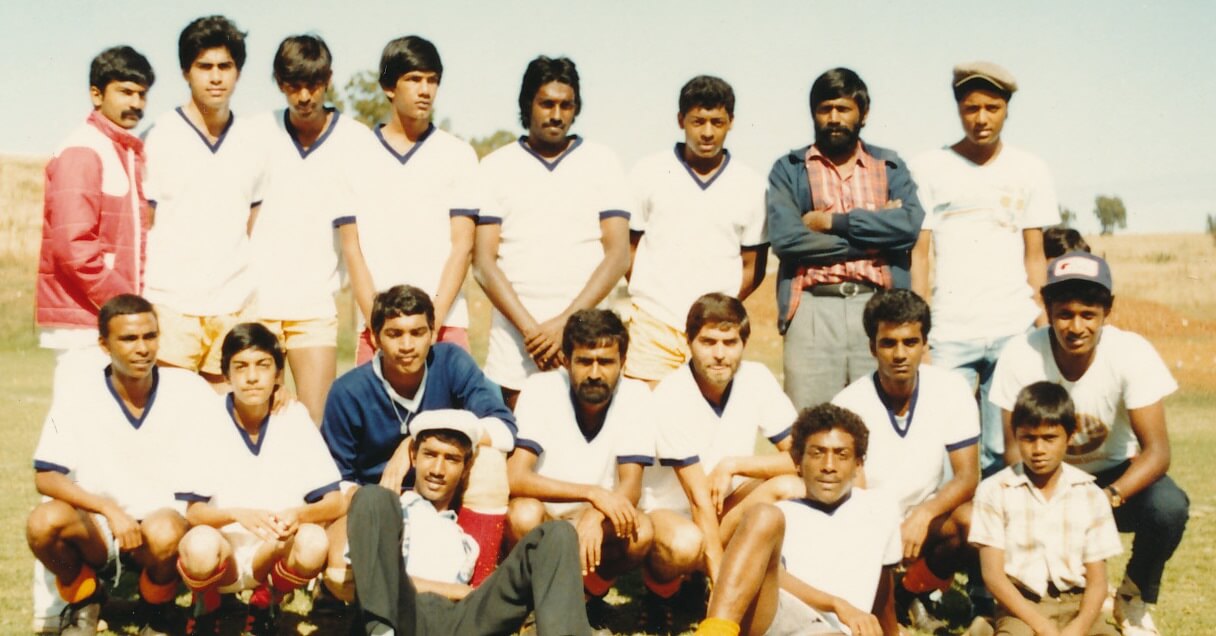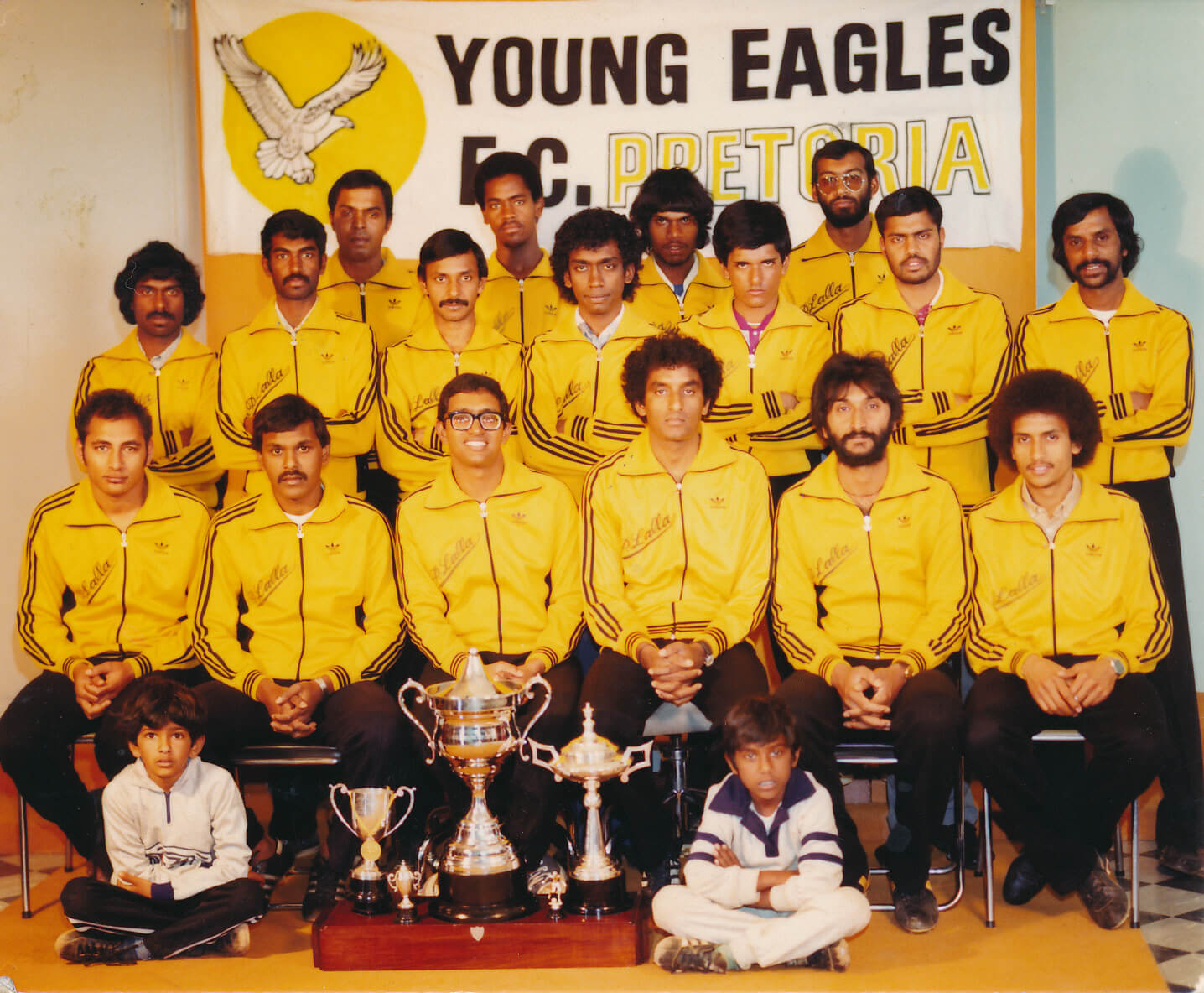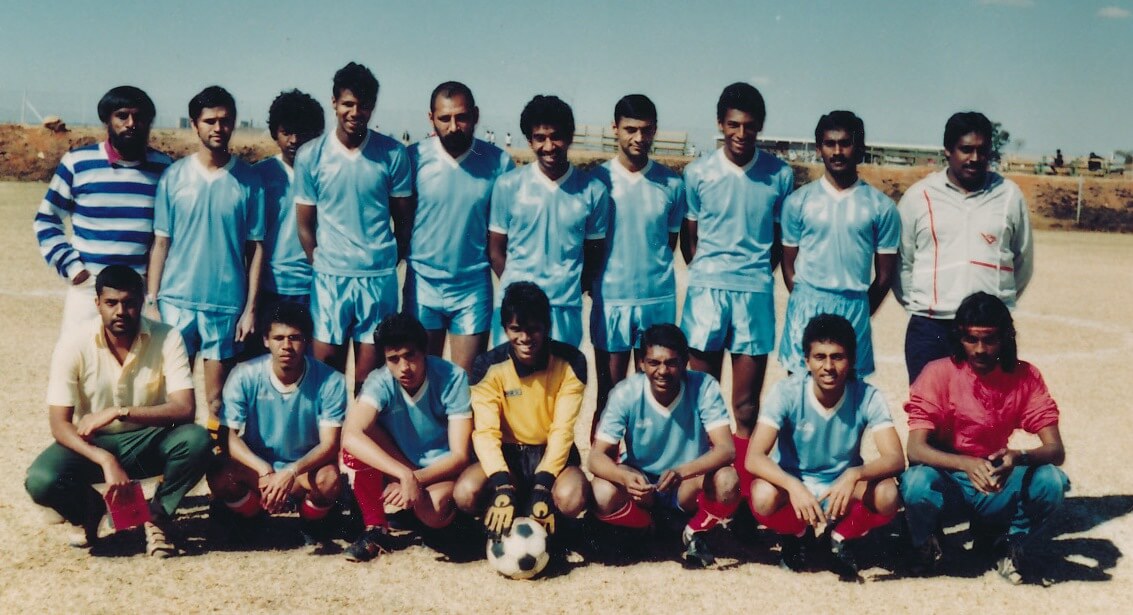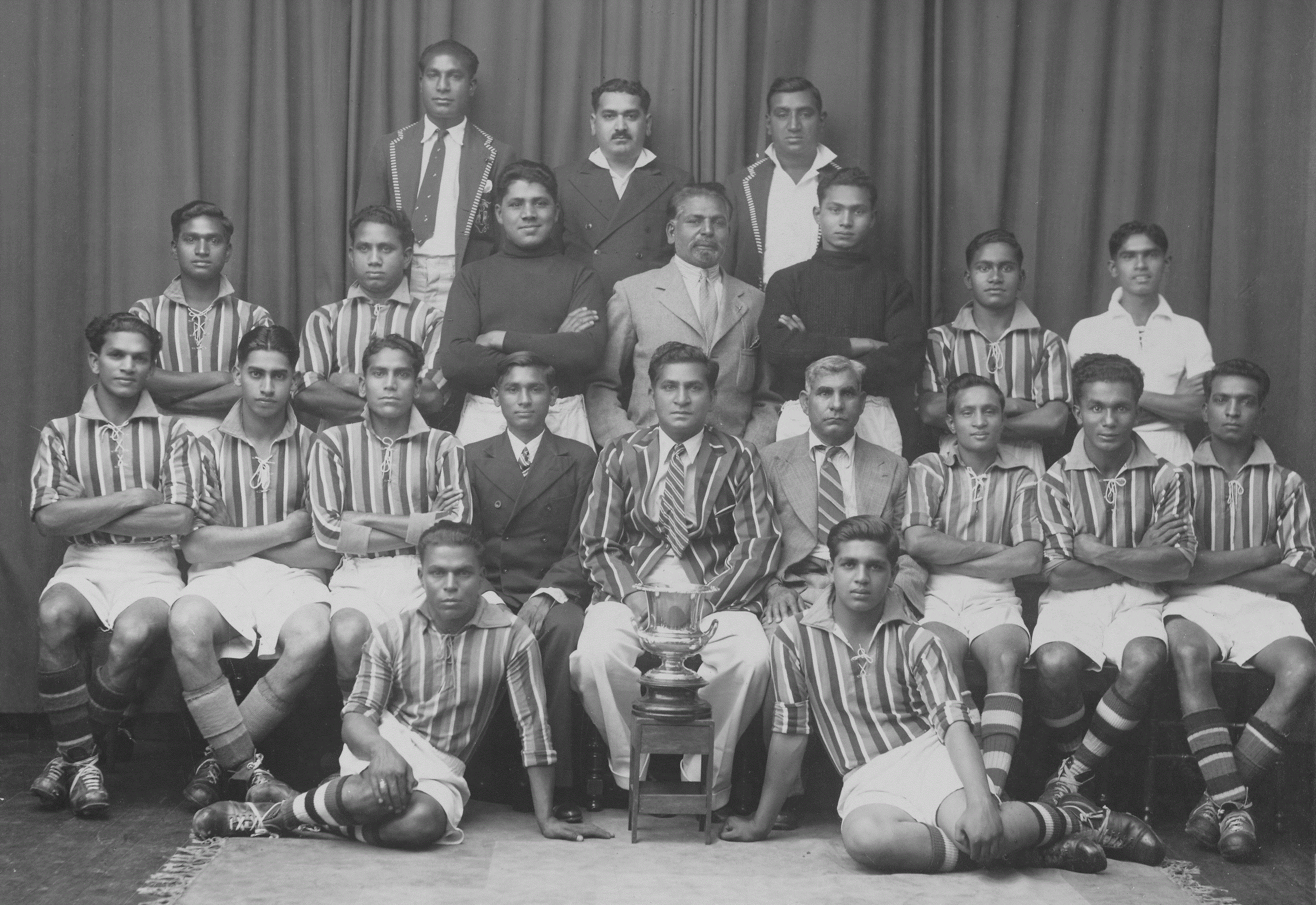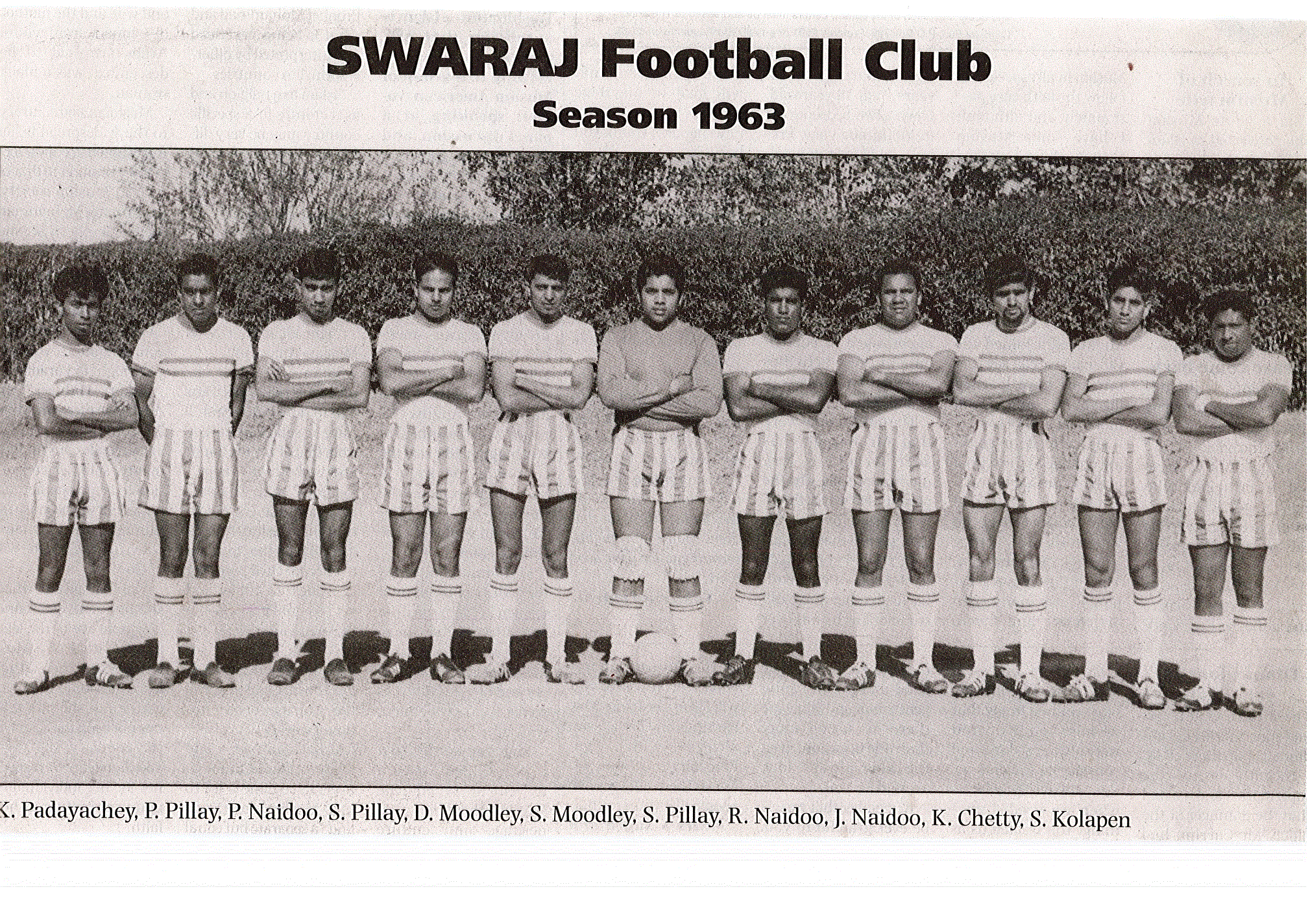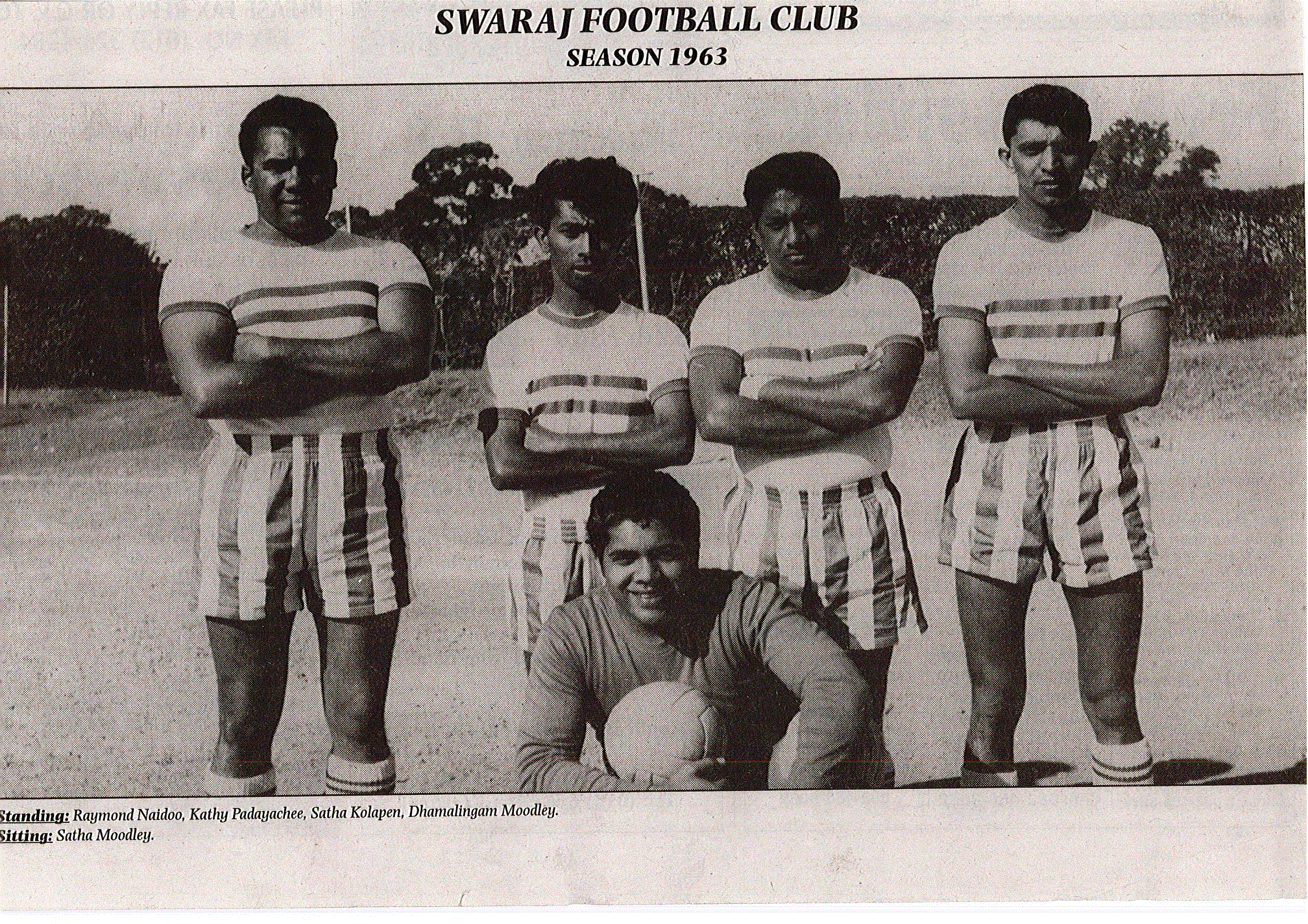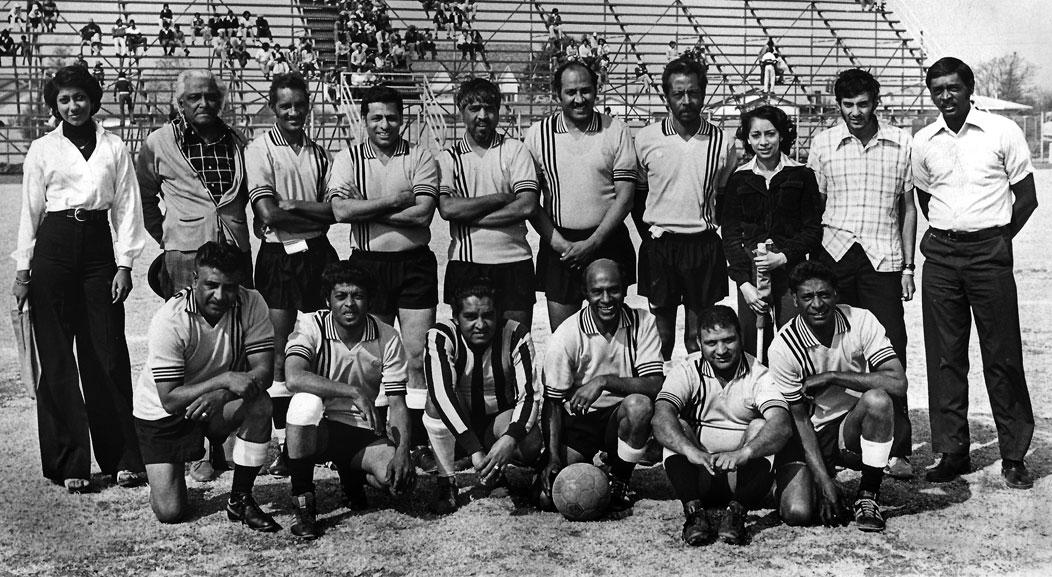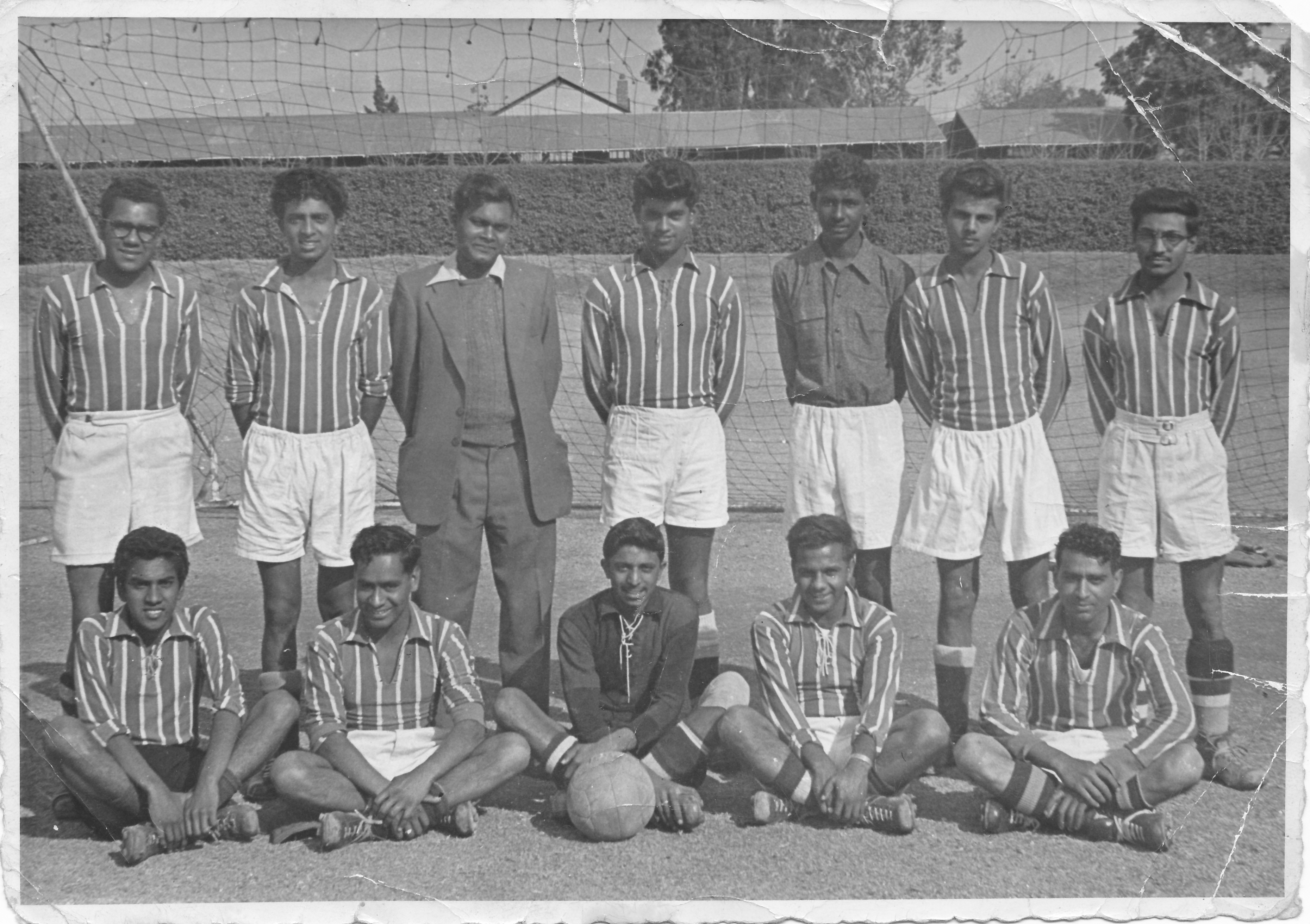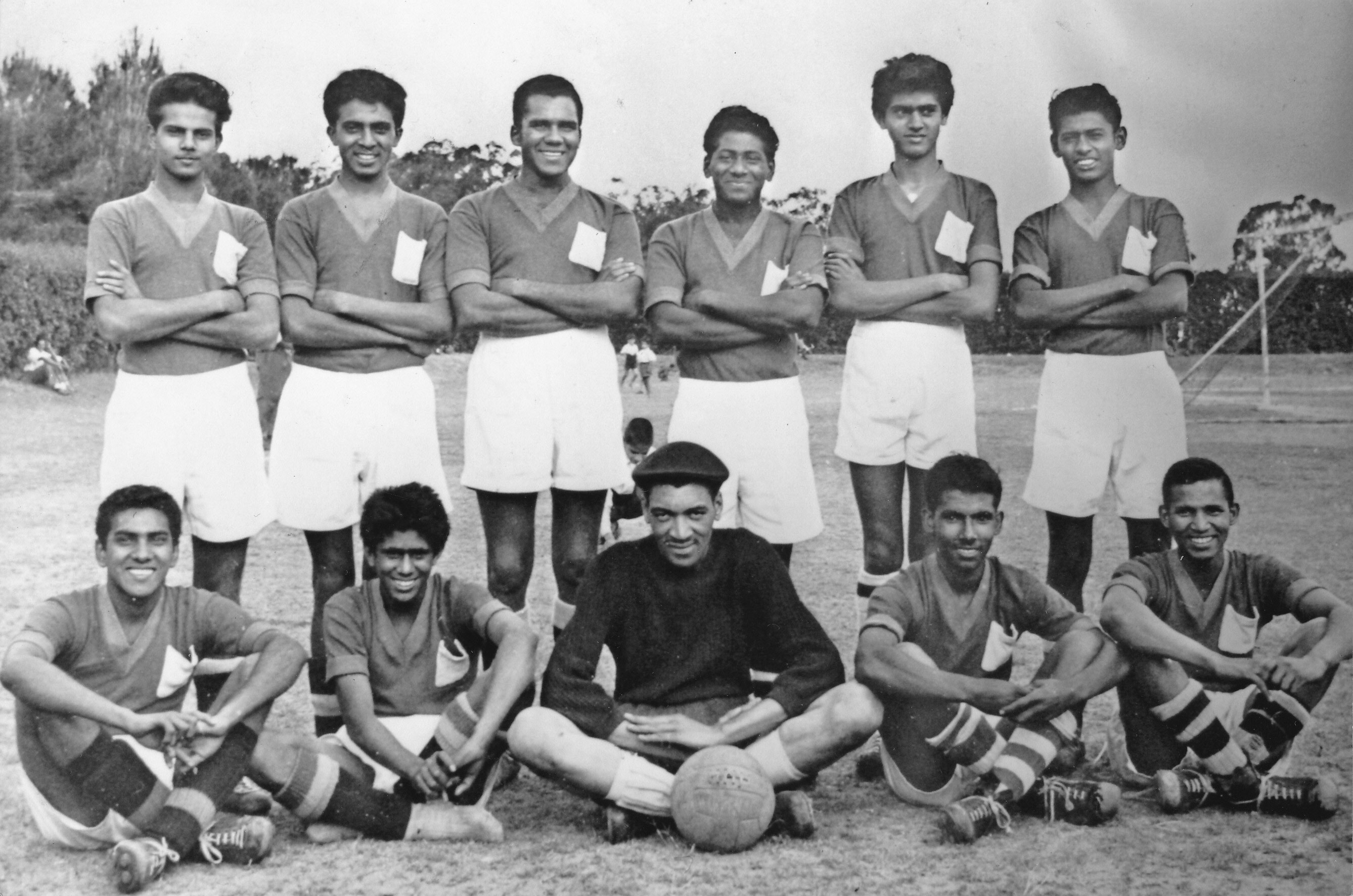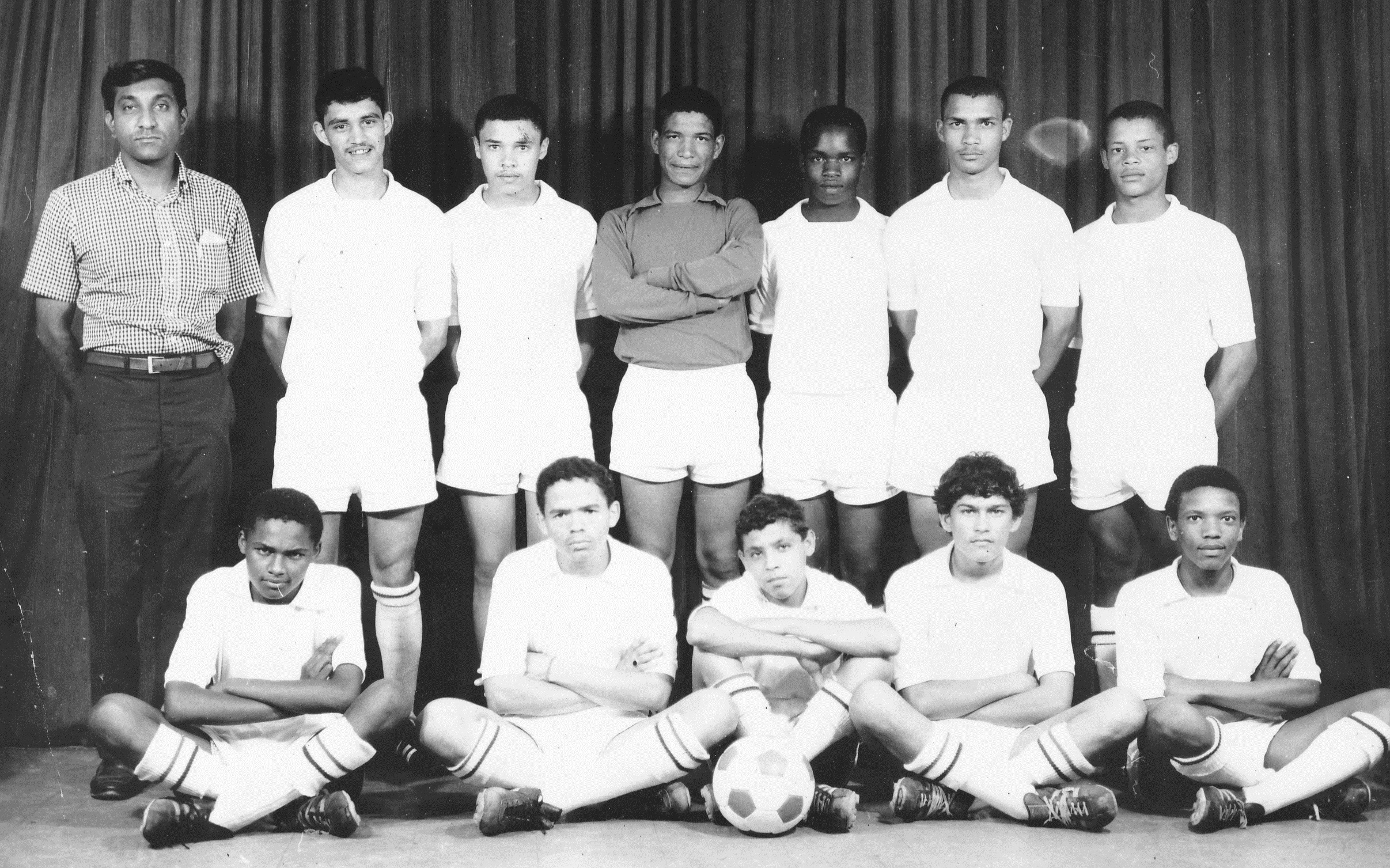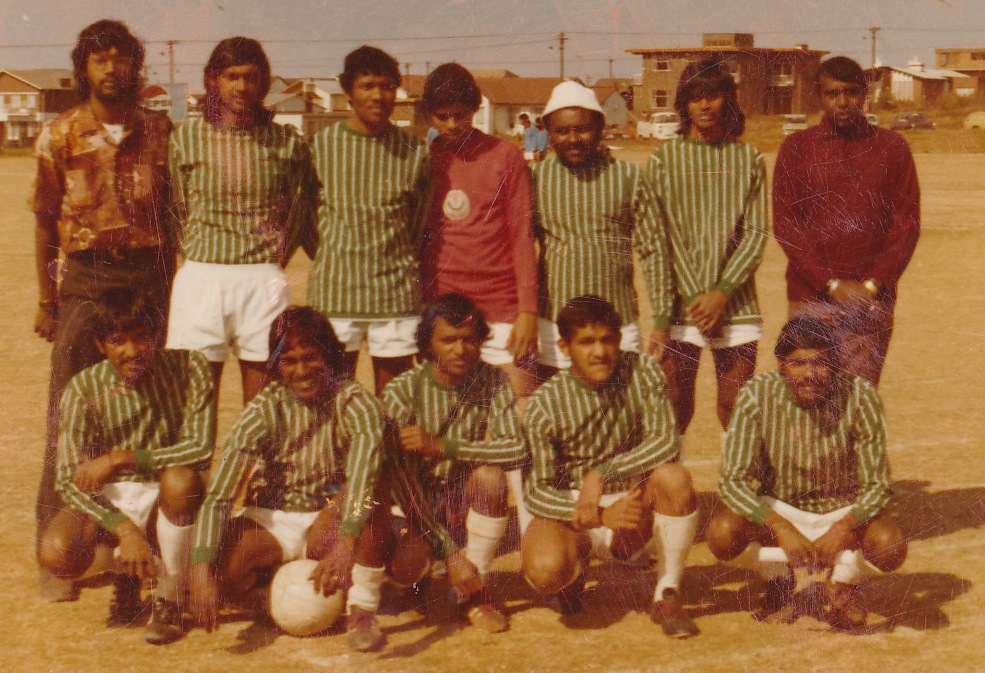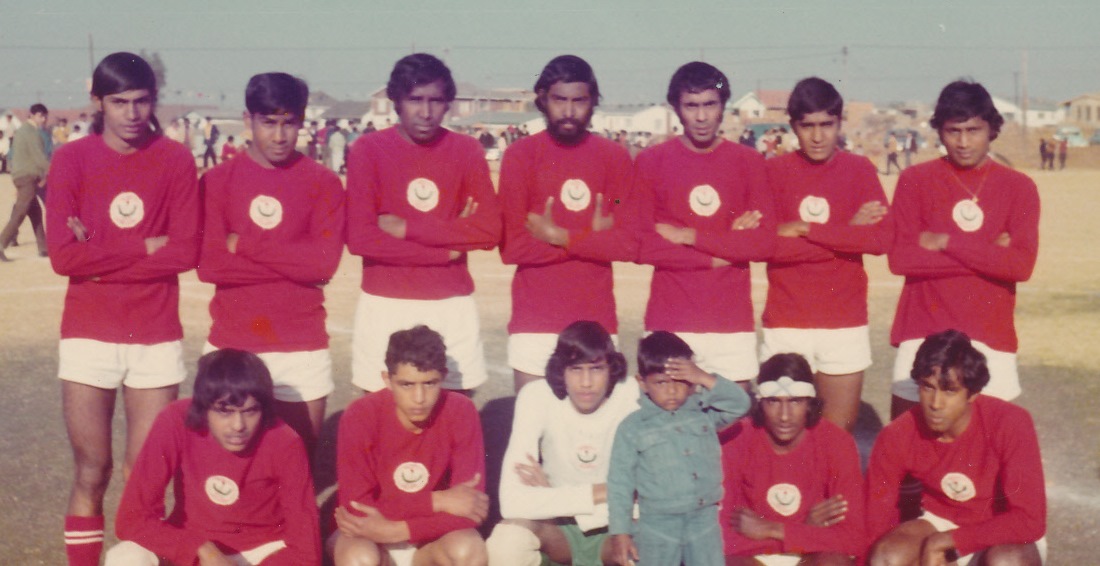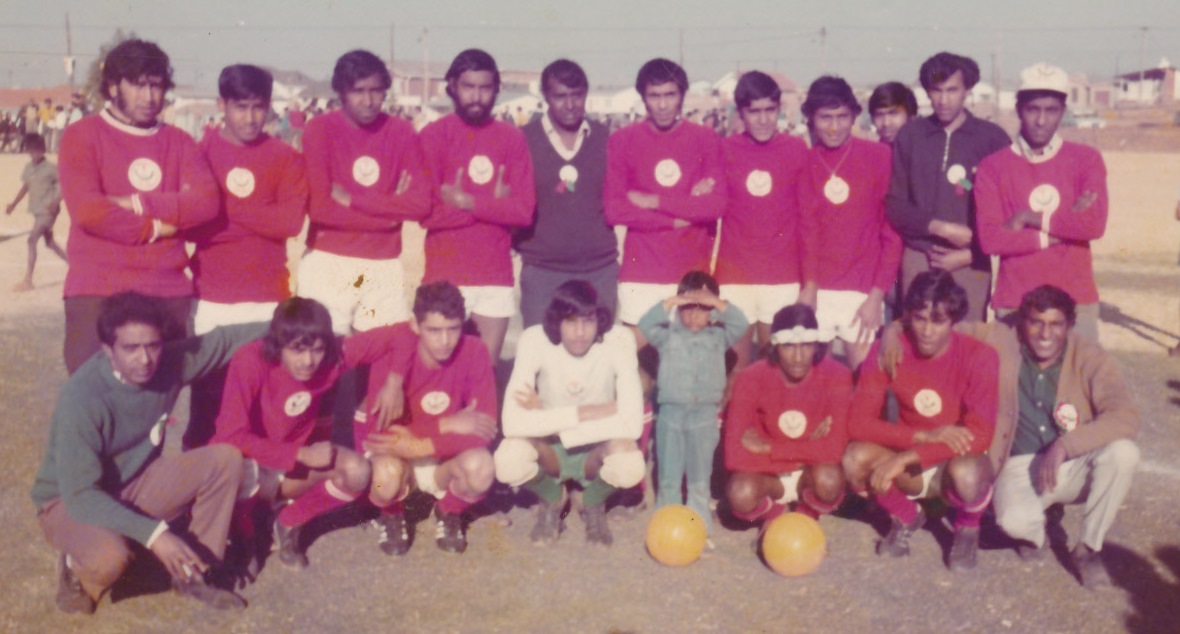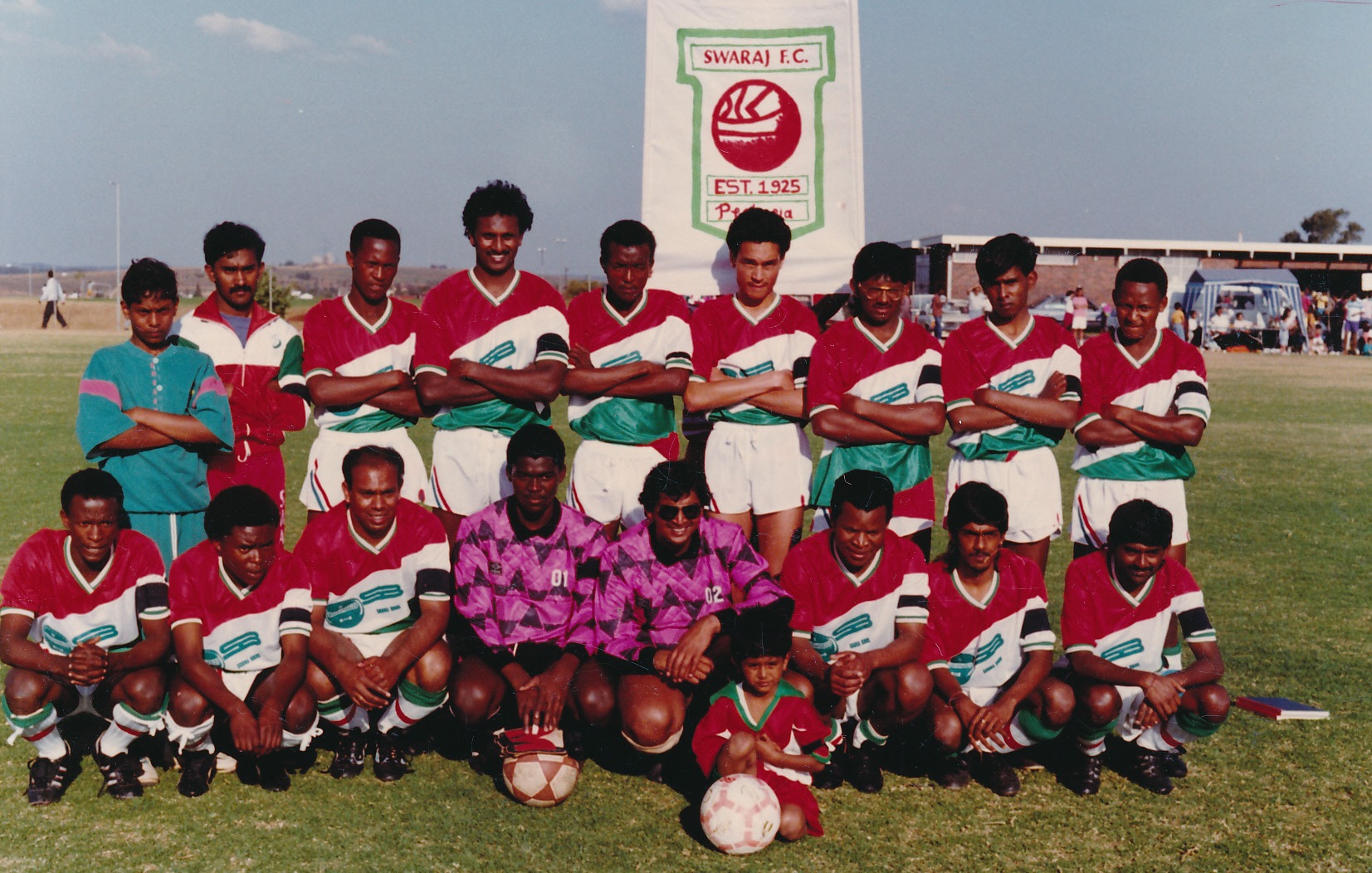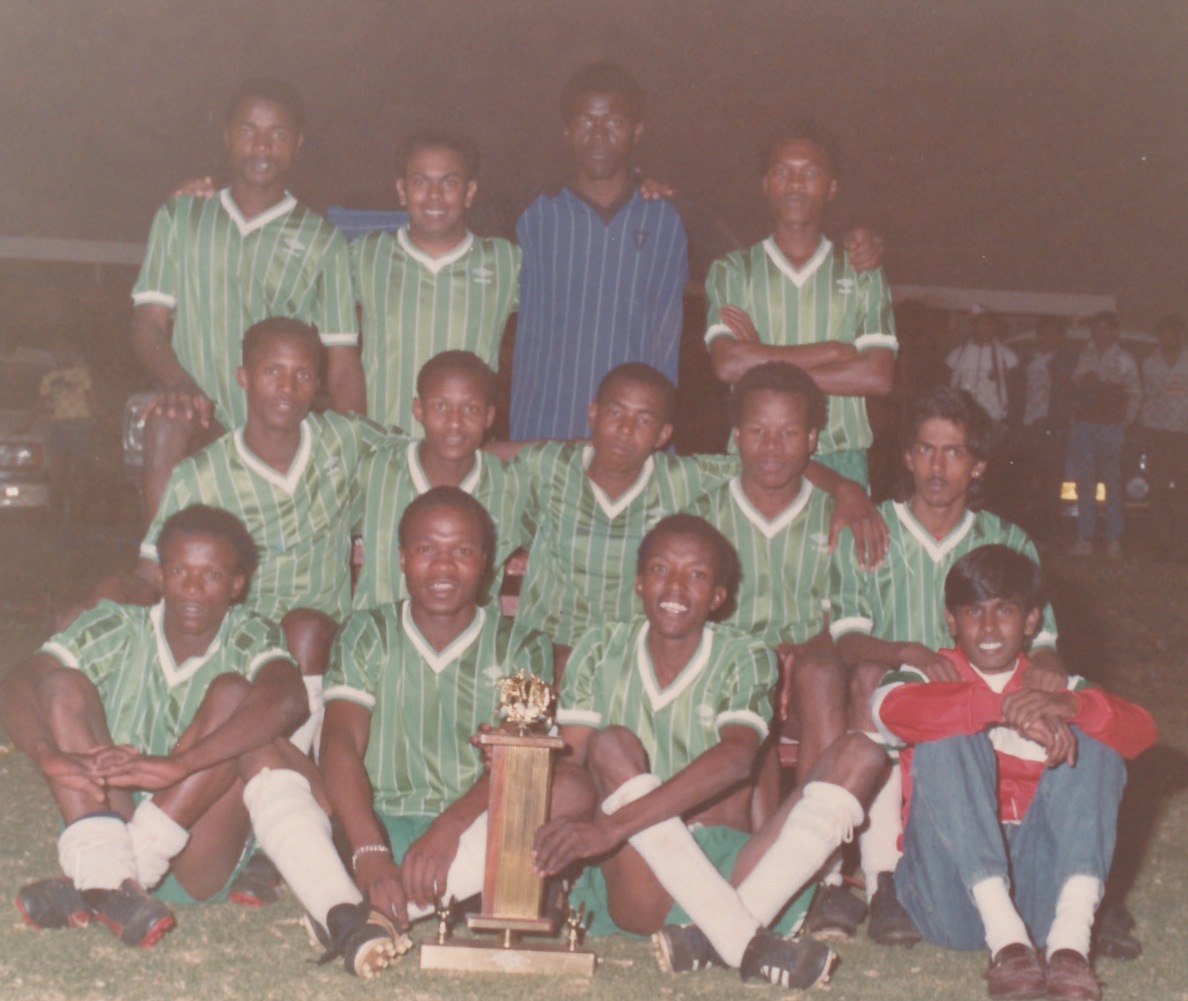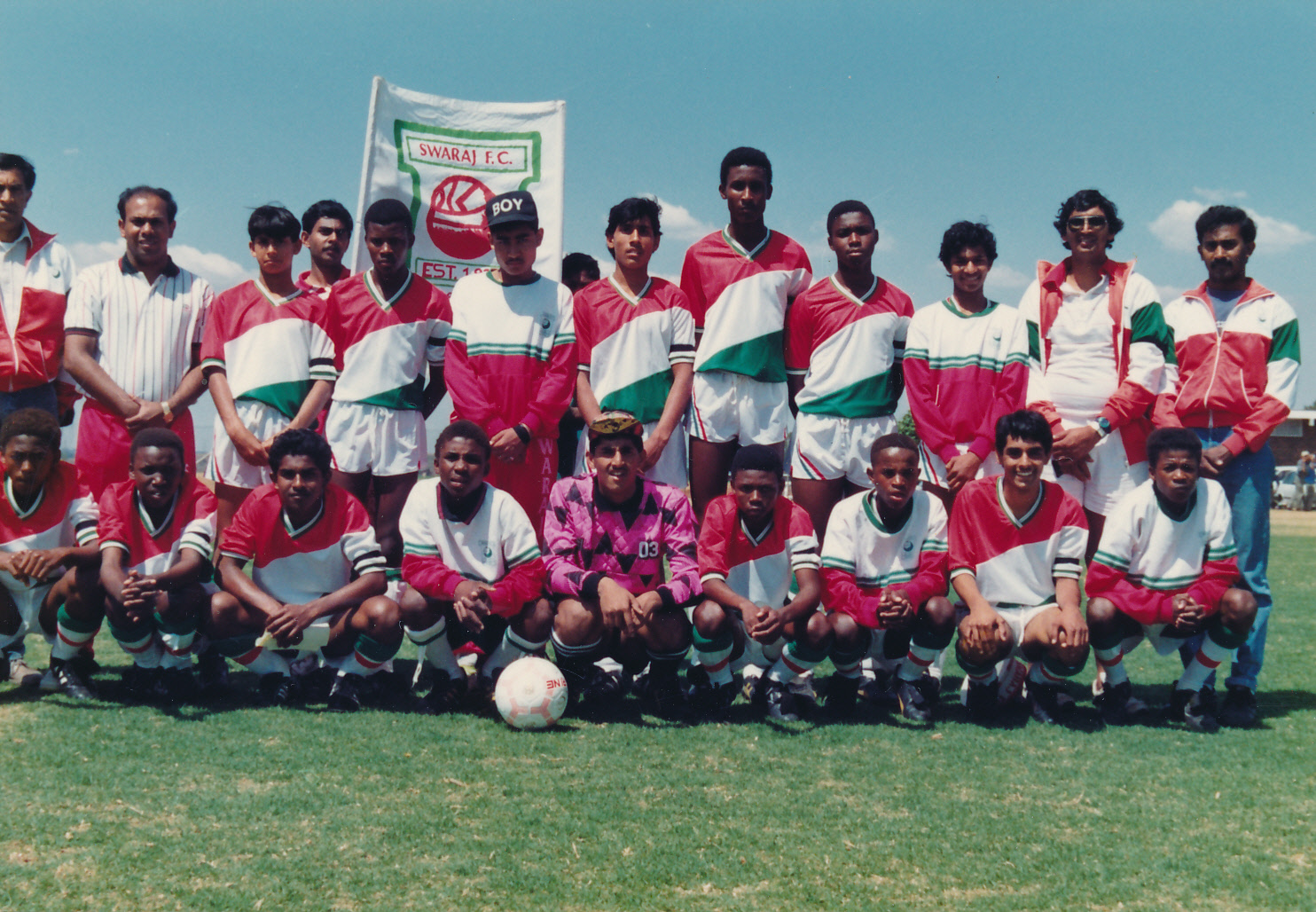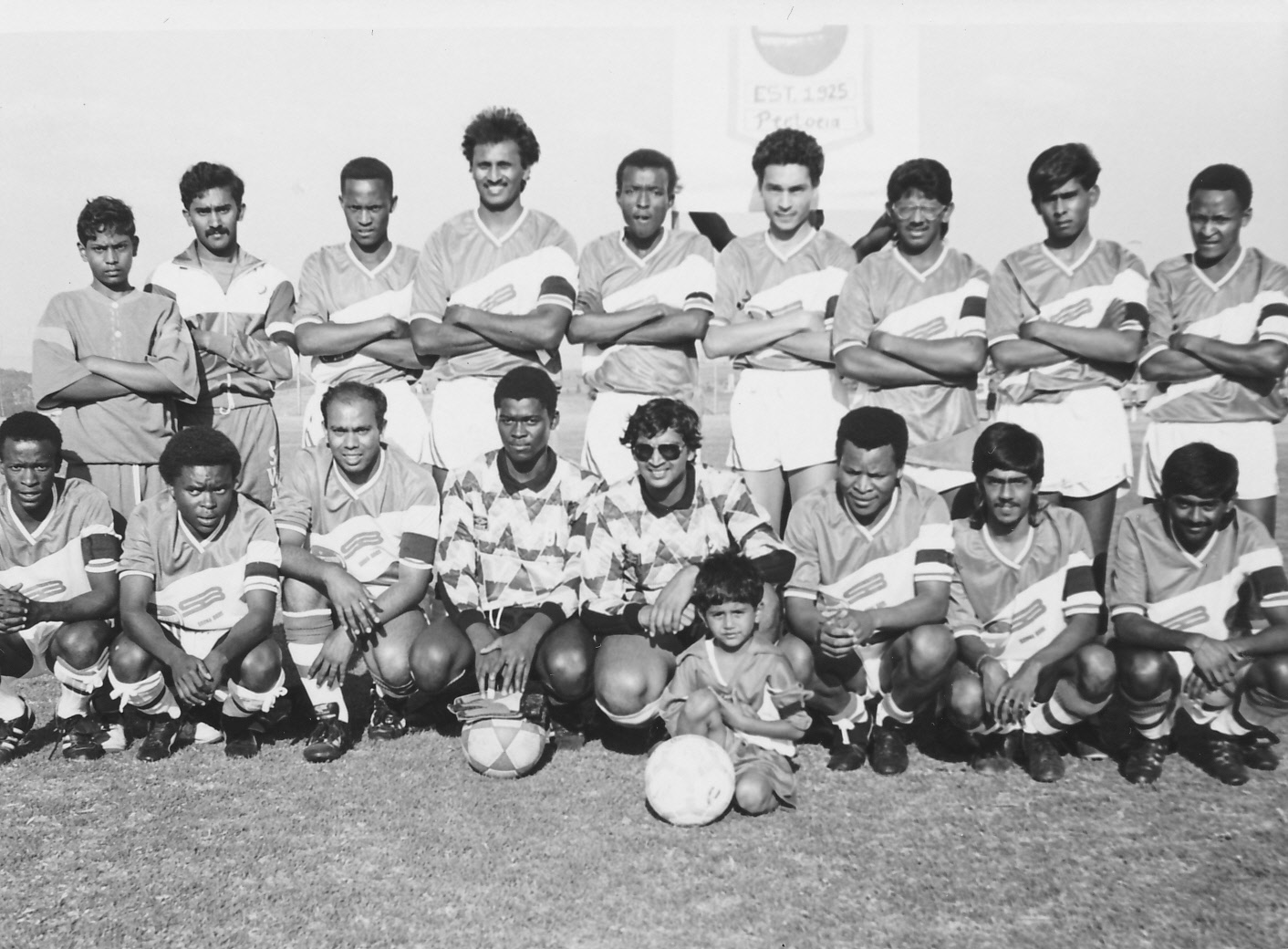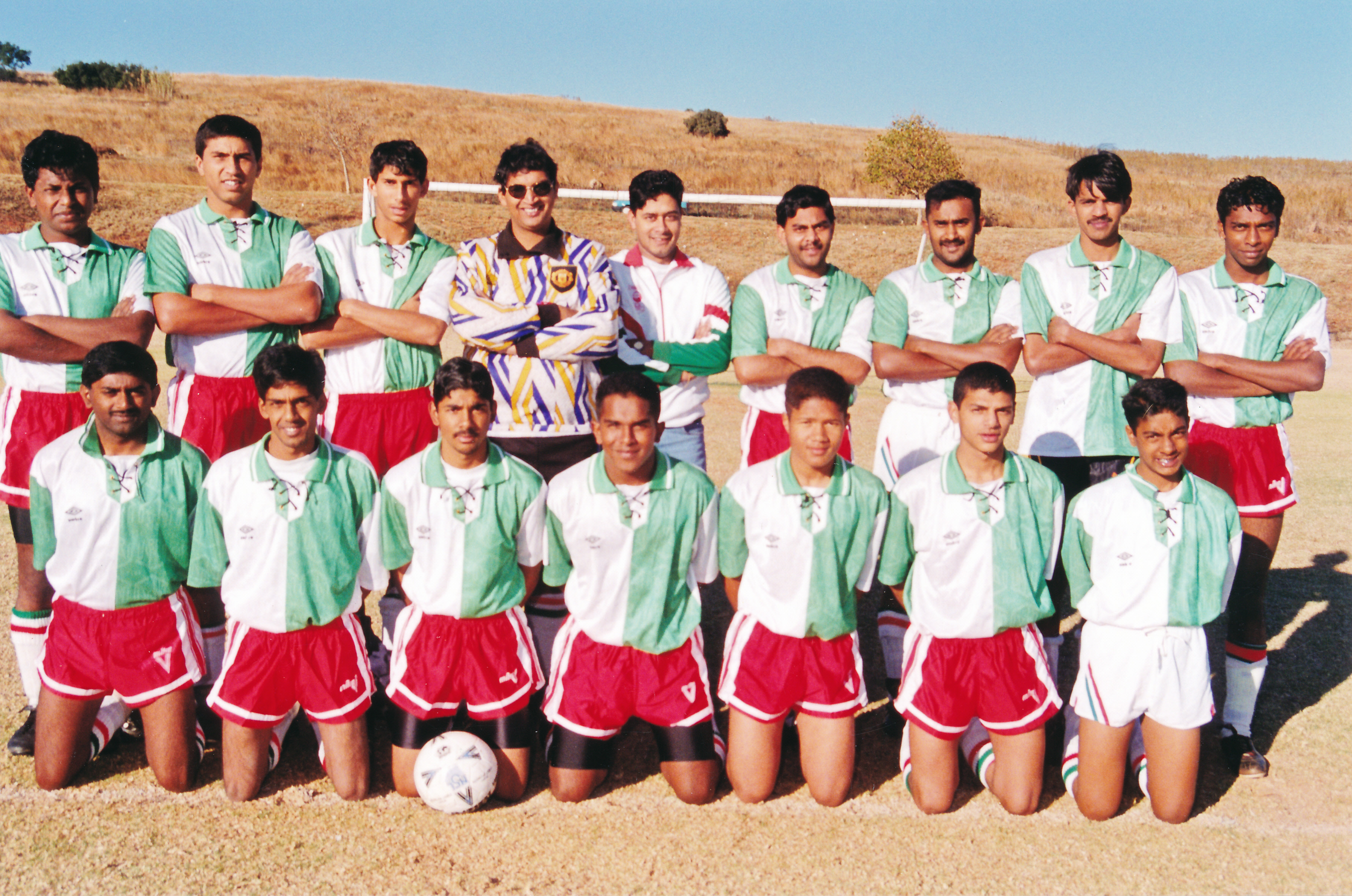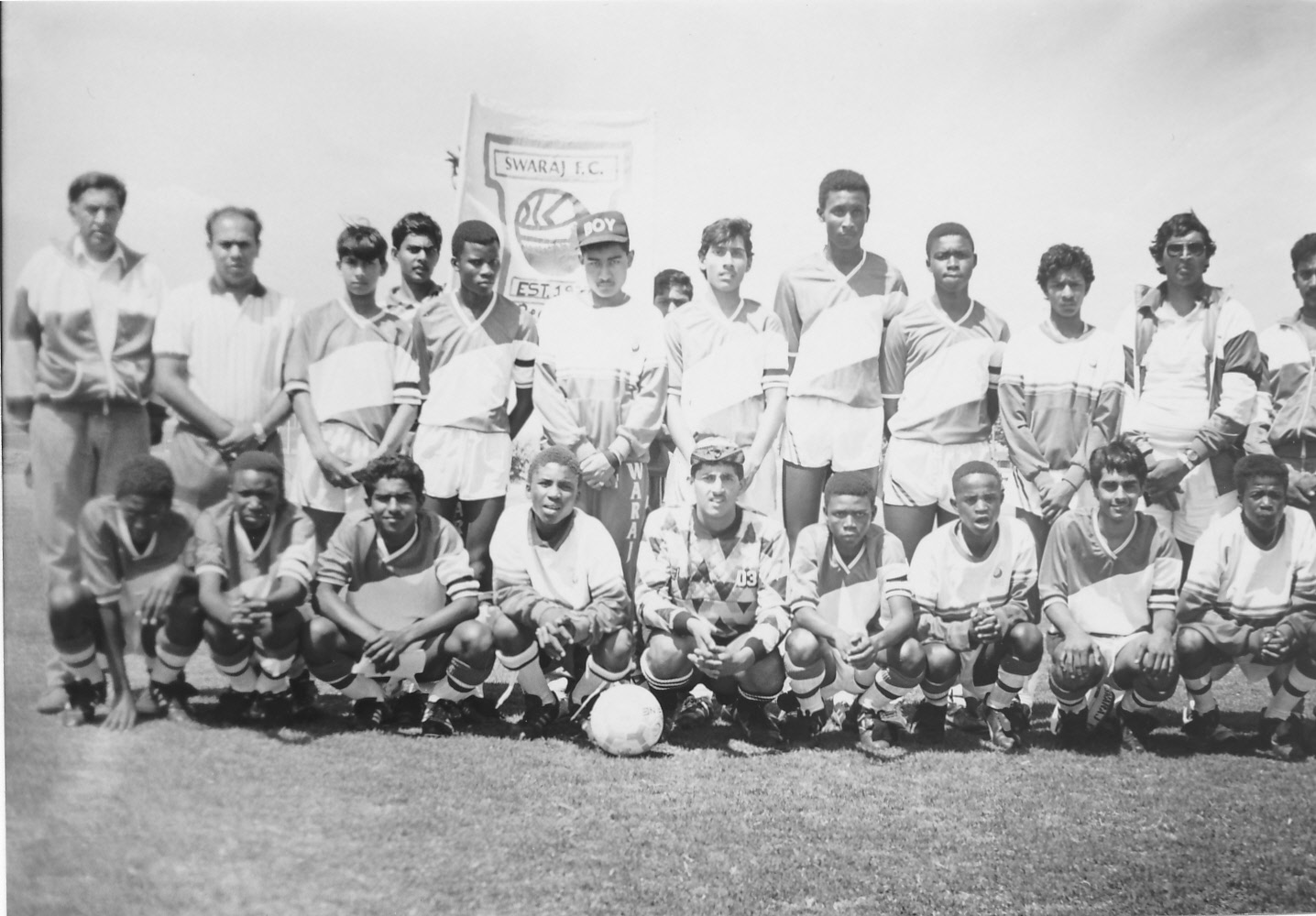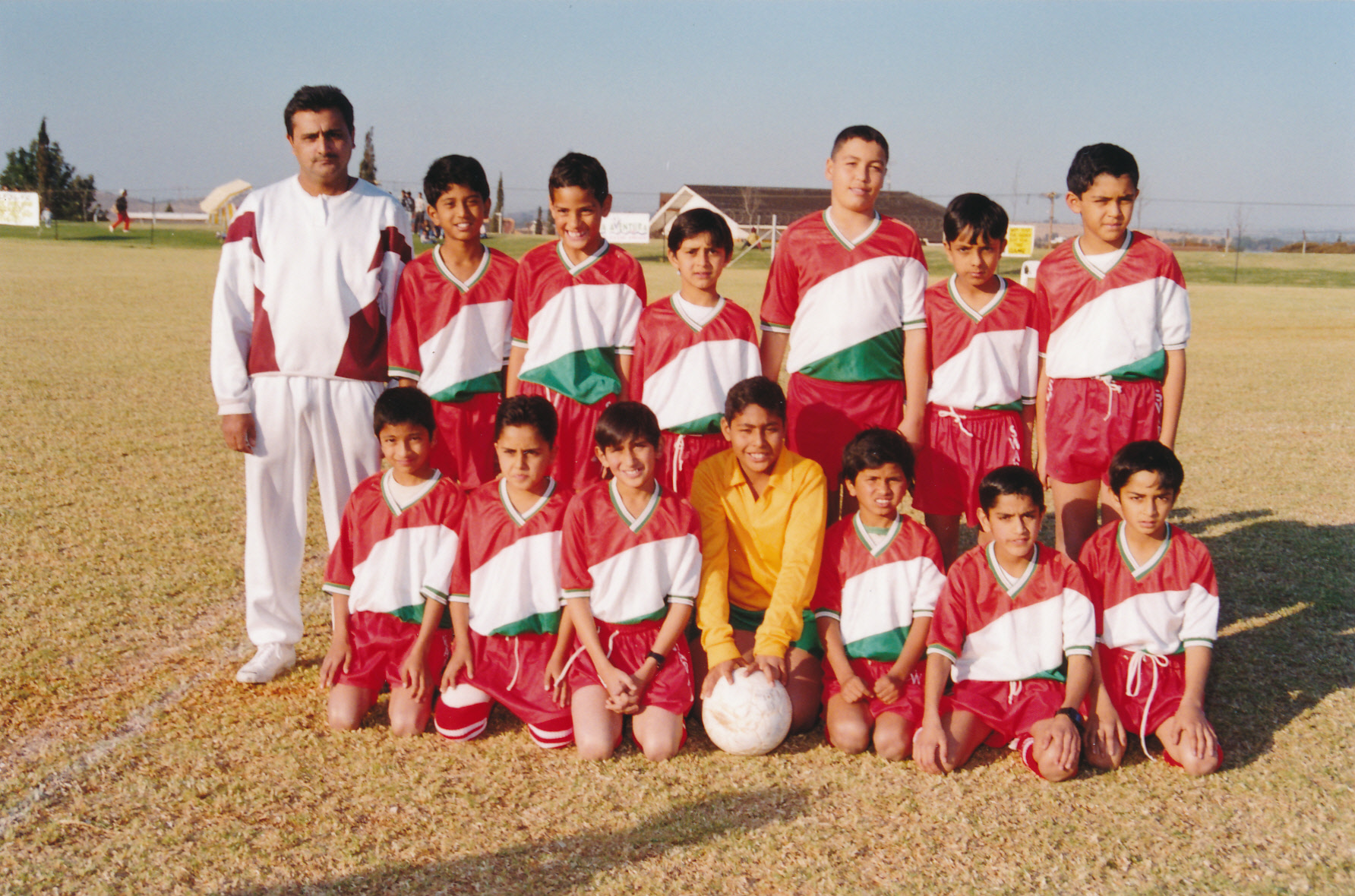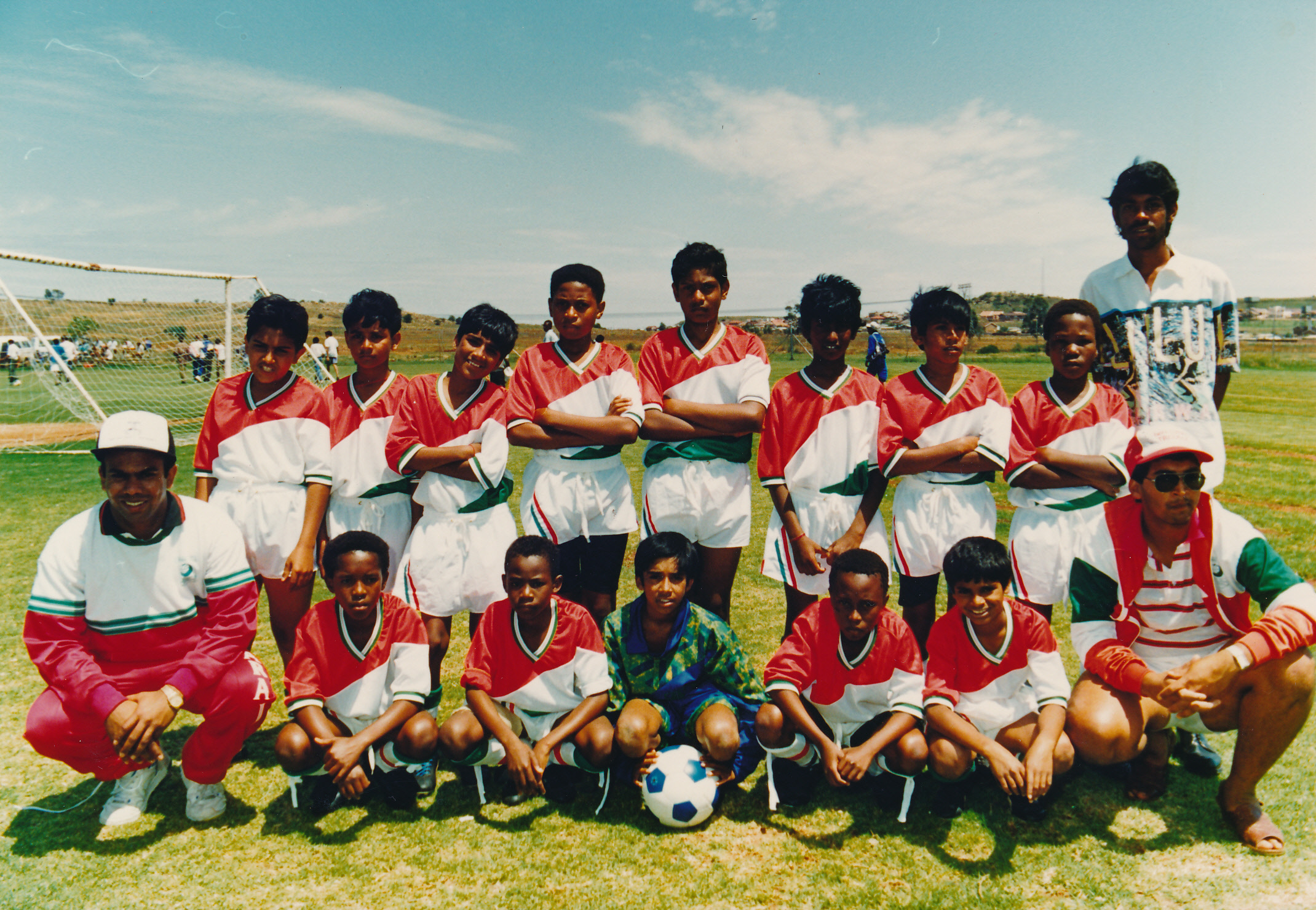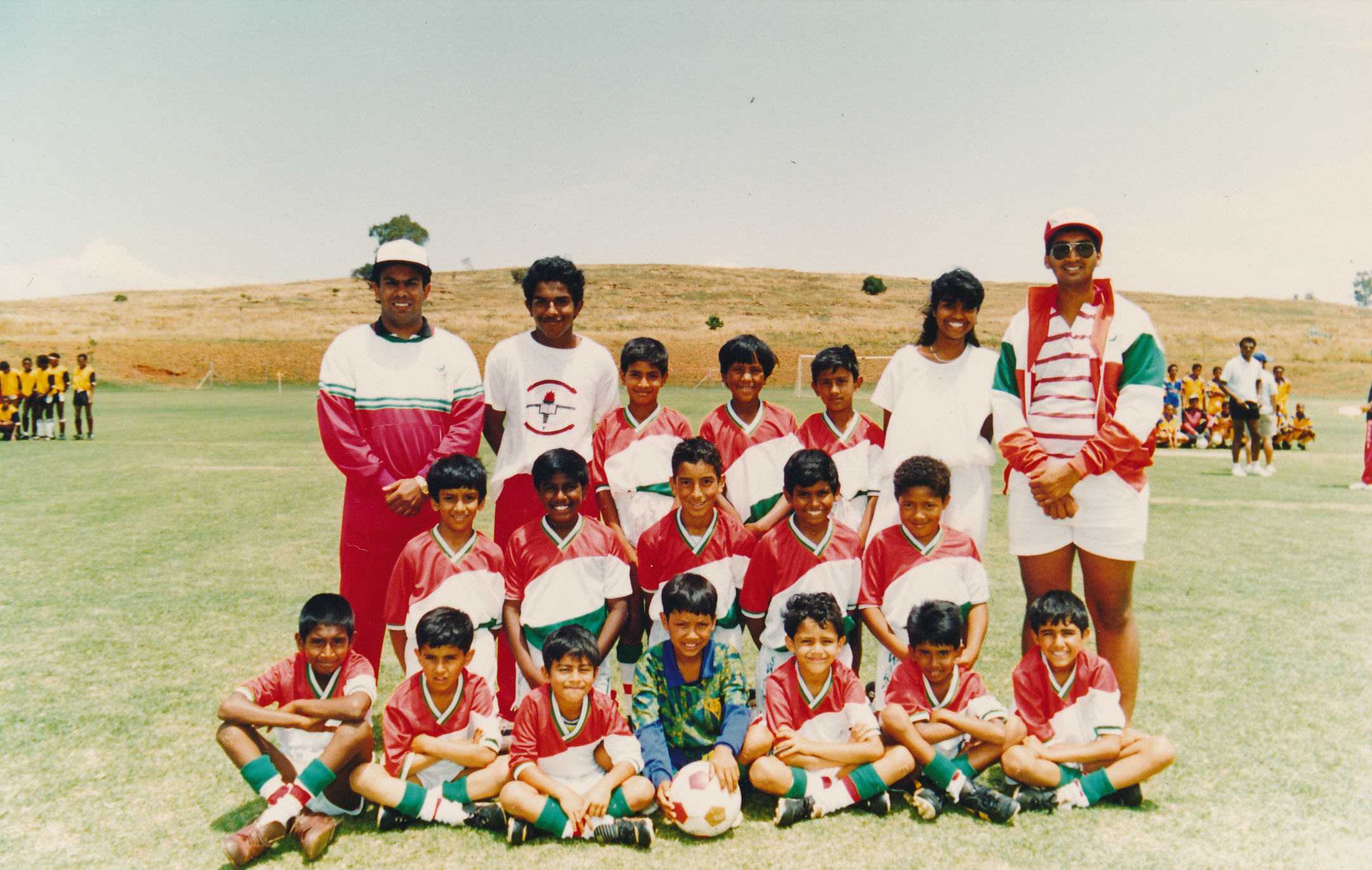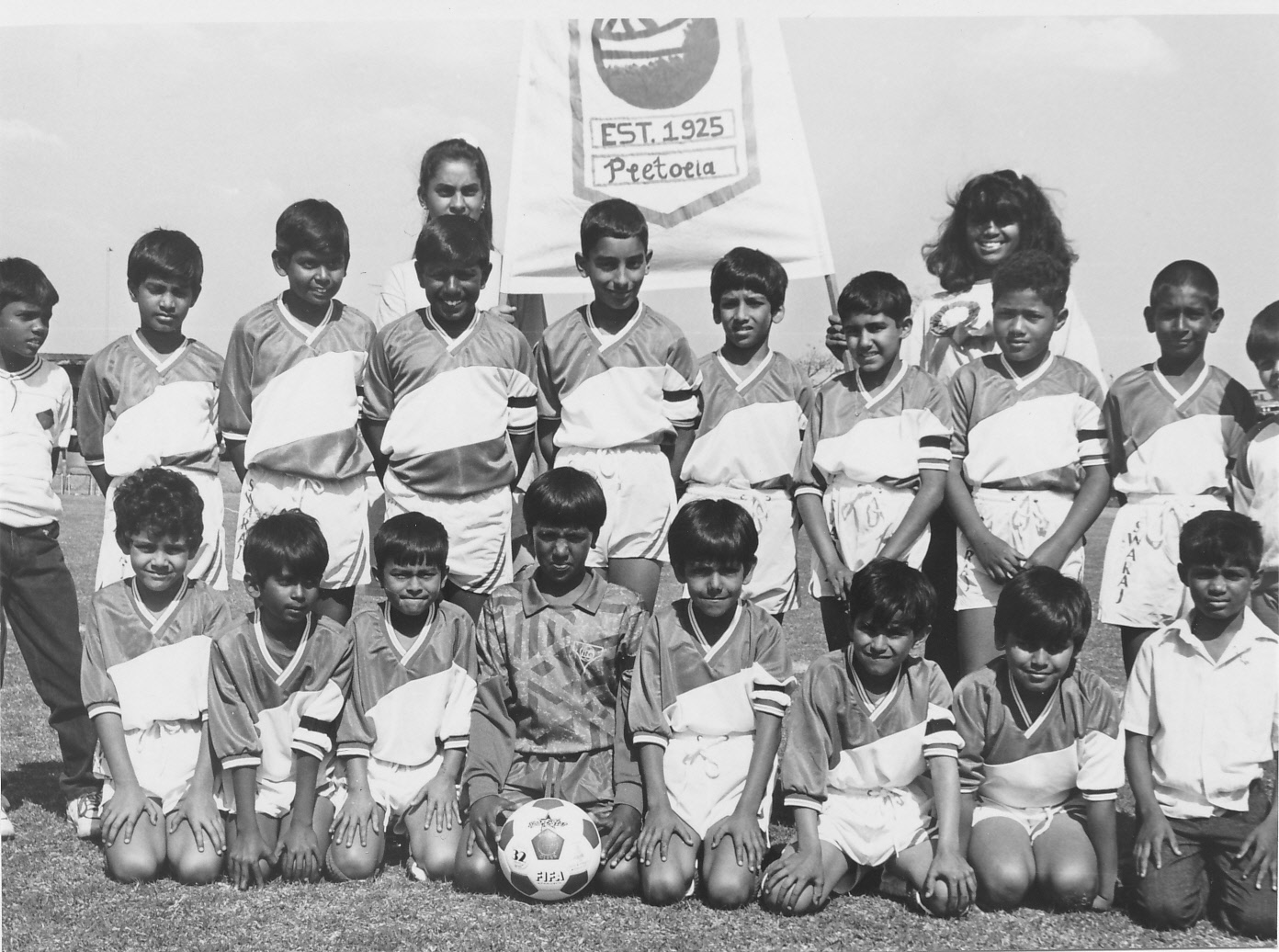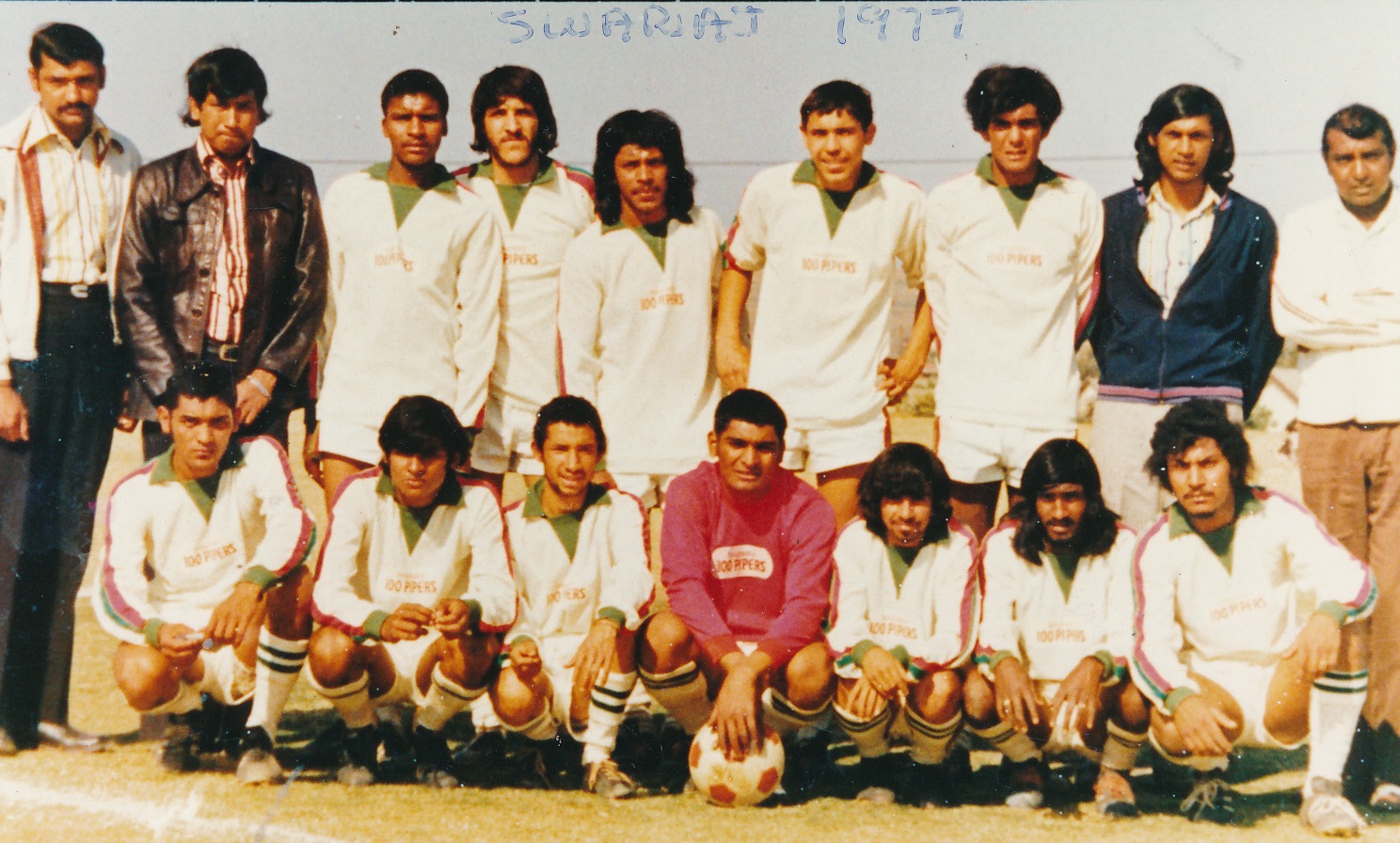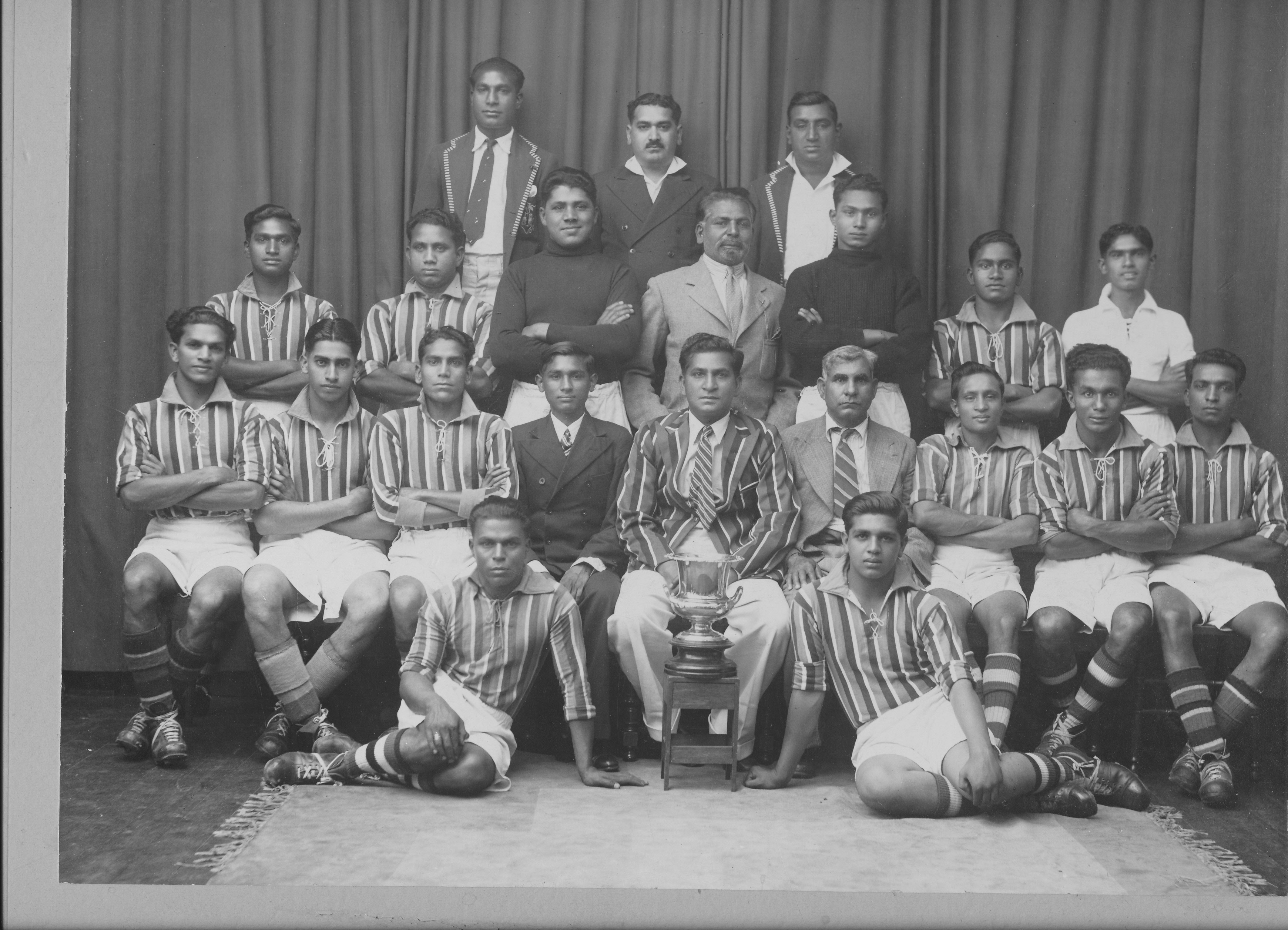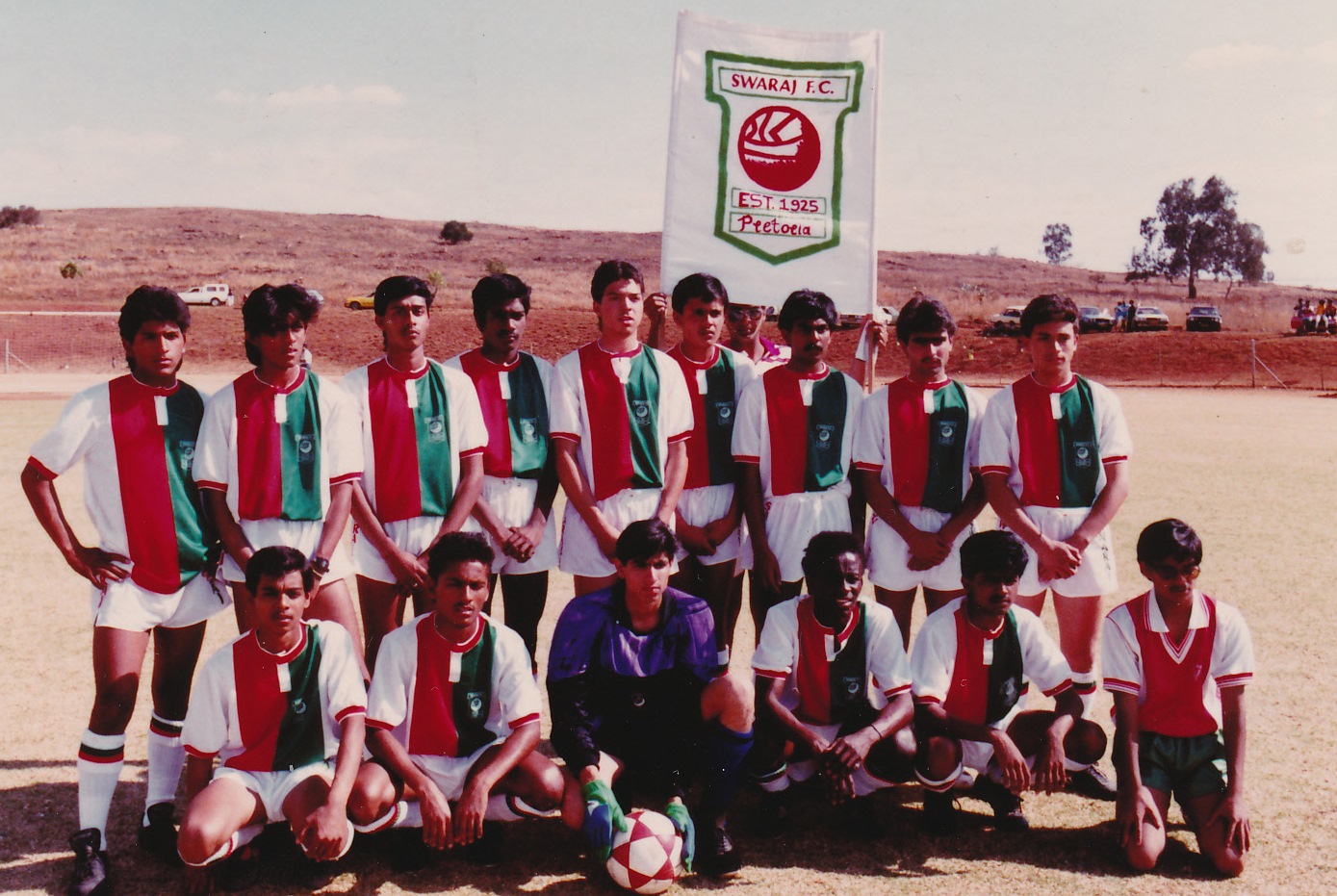News
Delfos FC Gold Senior Team – League Champions
Delfos FC Gold Senior Team – League Champions
LFA Promotional League 2023/2024 season
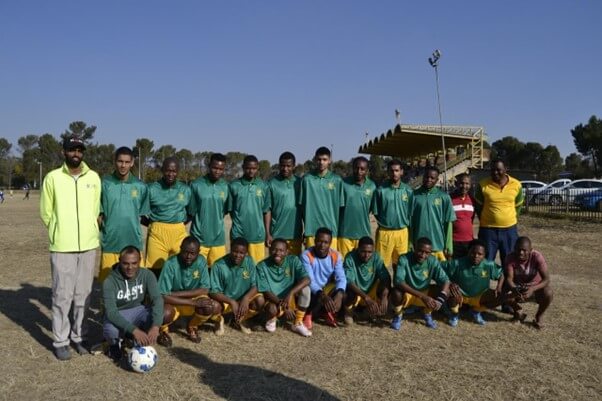
Following on last season’s very close 2nd place finish, the Delfos FC Gold team set their sights on the no.1 spot this year. Under the management of Nava Pillay and coach Raeez Bhana, the energy and single focus to achieving this goal could be seen from their first match for the season.
Living up to coach Raeez Bhana’s message for the year, “You don’t have to be the best you just have to do your best every week as a team”, the team worked together in every match to ensure that the goal was achieved
Manager Nava Pillay had this to say, “Following last season’s heart-wrenching 2nd place finish, our collective goal for this season, was to win the League and we have achieved it, now this goal has been upgraded to winning the promotion playoffs to join the 4th tier of South African Professional football, The SAFA Tshwane Men’s Regional League.”
The teams’ performance for season 2023/2024 was as follows:
| P | W | D | L | GF | GA | GD | PTS |
| 18 | 14 | 1 | 3 | 68 | 21 | 47 | 43 |
The highest goal scorer was Aslam With 20 goals, followed by Gino with 18 goals
Being crowned champions means Delfos FC qualify for the playoffs for the SAFA Tshwane Men’s Regional League (formerly SAB Castle League), the 4th Tier to Professional Football under SAFA to be played on Sat 27 & Sun 28 Jul 2024.
Delfos FC will represent the Laudium Football Association as Champions for season 2023/2024 at the playoffs and will be playing against the best football clubs of Tshwane, who were crowned champions of their respective Local football Associations.
The groups drawn are as follows:
| GROUP A | GROUP B | GROUP C | GROUP D |
| City Rocks Winterveld LFA | Berea Albion Football Association Pta | Nkadimeng Soshanguve LFA | Delfos FC Laudium FA |
| Lighthouse Eersterust FA | FC Benfica Mabopane LFA | Mamelodi PSG Mamelodi LFA | Junior Kings Hammanskraal LFA |
| TUT Ga-Rangkuwa Ga-rankuwa LFA | Zwashu Academy West-End LFA | The Bees Phelindaba LFA | Orchards Blue Birds Akasia LFA |
| Tokza Olievenbosch LFA |
Delfos FC has been grouped against the winners of Akasia LFA and Hammanskraal LFA. The match schedule is as follows:
Match 1 – Sat 27 Jul 2024
Delfos FC vs Junior Kings
11AM
Bana Fields – Mabopane
Match 2 – Sat 27 Jul 2024
Delfos FC vs Orchard Blue Birds FC
3PM
Bana Fields – Mabopane
This team has added to the illustrious 77year history of the club and we look forward to their performance against the best of Tshwane in the Playoffs scheduled.
Good Luck Delfos, make Laudium proud.
Statement on the Violence – 18 Jul 2021
This year the Delfos Football Club celebrates its 75th anniversary. We celebrate 75 years of hard work and dedication to building a better society in South Africa. Our aim has always been to establish a non-racial, non-sexist society founded on the values of equality, human dignity and the advancement of human rights and freedoms for all South Africans.
On the day that we celebrate the birthday of President Nelson Mandela, the recent acts of violence, looting and destruction of property in various parts of our country have made us acutely aware of the fact that there is so much more work to be done to achieve our aim of establishing a society of peace, respect and dignity; where poverty and hardship are a thing of the past.
We are extremely dismayed at the widespread lack of respect for law and order. We condemn those that have incited this violence and who have sought to engineer racial division amongst our people. We will not tolerate this political abuse of our people.
We appreciate that there are many factors that have contributed to the severity of the devastation that we have witnessed in the last weeks. We understand that the social and economic disparities in our country devastate the lives of millions of our neighbours, friends and family. However, the opportunistic use of this reality for selfish political gain is deplorable.
Now is the time for us to reignite our common South African heritage and character of hard work and determination to make the lives of all South Africans better. And to do so hand-in-hand; side-by-side with respect and dignity In unity.
Delfos Football club re-affirms our commitment to establish a non-racial, non-sexist society founded on the values of equality, human dignity and the advancement of human rights and freedoms for all South Africans and we will continue to do so as we move forward to our 100 year anniversary.
A Tribute to Dayalbhai Dheda Soma
WE SAY GOODBYE AND SALUTE OUR LEGEND TEACHER, ADMINISTRATOR, COMMUNITY ACTIVIST AND REVOLUTIONARY
DAYALBHAI DHEDA “UNCLE DIAR” SOMA
[18 OCTOBER 1937 – 21 APRIL 2021]
“Only a life lived in the service of others, is a life worth living” – Albert Einstein
Delfos Football Club are deeply saddened by the passing of our legend and stalwart Mr Dayalbhai Dheda Soma at the age of 83.
Our Condolences are extended to Aunty Logie, Beena, Jeeten and family. May his soul rest in peace.
Uncle Diar, Mr Soma, Sir, Uncle D – was known by many names, but was a principled man of unwavering singularity of dignity and morality.
Uncle Diar the footballer :–
Uncle Diar joined Delfos Football Club from All Bharats Football Club in 1955. He remained a member of our club from 1955, epitomising the values of commitment and loyalty.
He learnt his football on the dusty streets of Marabastad. Together with his brothers, he refined his skill and quickly became the epitome of a super fit, committed, determined sportsman. This work ethic was visible throughout his life – jogging around the streets of Laudium and Erasmia well into his 70s.
As a 19-year-old and vice-captain he achieved his first of many successes with Delfos when they won the Transvaal League in 1957.
Uncle Diar represented Delfos throughout the 1950’s,1960’s and 1970’s, winning numerous league and cup titles. Most of this success was alongside his fearsome strike partners and in concert with his dearest friends and confidants Gono Pillay, Nithia Moodley and Magan Ramjee.
After being posted to a teaching position in Lenasia, Uncle Diar travelled from Lenasia to Marabastad to ensure that he was available to play for Delfos over weekends. During this time, he also played for Athletico in Lenasia.
He represented the Pretoria District Football Association on numerous occasions in inter-district competition. Equally, Uncle Diar also represented Transvaal in the inter-provincial Sam China Cup on a number of occasions. In 1967, he led Delfos, playing as Northern Transvaal, in the Sam China Cup – narrowly losing the final to Southern Transvaal.
At the end of his playing career, Uncle Diar managed Delfos for many years. He was a determined taskmaster. He was steadfast in his training methods ensuring that every player was super fit and given a fair chance on the field. At the same time, he was a masterful tactician. This was no more evident than when he led the Transvaal team, as coach, to the inter-provincial tournament in 1974, which they won, scoring a record number of goals in the tournament.
Uncle Diar passionately believed in developing the youth in our community. In the 1970’s he and fellow teacher Dayal Gopal started the first Delfos junior programme. In so doing Delfos achieved great success in organising our youth and directing them towards sport. Again in 1998, when football was waning in our community, he urged Delfos to start a junior academy and then with his lifelong friends, Uncle Magan and Uncle Nithia, coached juniors daily. So determined were the “three legends” that they obtained their Safa coaching certificates while in their 60’s. So committed were they to our club and football that they never missed a game.
Uncle Diar the administrator:-
“Live your life to make the life of another better”- an ethos that was ingrained into the fabric of Delfos by our late president Gono Pillay. Under the tutelage of Gono Pillay and thereafter in his own right Uncle Diar worked tirelessly for decades to ensure that youngsters in our community had access to sport and sporting facilities.
He served on the executive of the PDIFA/PDFA for many years, volunteering his time and administrative skills for the benefit of our footballing community. In this capacity and under the drive and guidance of Gono Pillay, Uncle Diar and Gono Pillay successfully removed “Indian” from the Pretoria District Indian Football Association, turning the Pretoria District Football Association into one of the first truly non-racial sporting organisations under the banner of SACOS.
Uncle Diar served as the president of Delfos for decades and on the Gonoseelan Memorial Tournament committee. He served as the president of the PDFA for 8 years. He also served as the vice-president of the Transvaal Soccer Board and the North Eastern Transvaal Soccer Board. In each of these capacities, he was resolute in his belief and principles of non-racialism and non-sexism, equality, and dignity. Never one to shy away from a challenge or to say his piece, Uncle Diar fought tirelessly for equality and equal opportunity for all South Africans. He worked under extreme scrutiny of the apartheid regime to ensure that generation after generation were given an opportunity and the dignity to play organised sport.
Uncle Diar the teacher and activist:-
Teaching was not a job, but a calling for Uncle Diar. An honourable profession led by an honourable man. Generation after generation had the privilege of learning from Uncle Diar. A consummate professional, Uncle Diar ensured that thousands received a diligent and quality education.
Uncle Diar was a teacher for 41 years before retiring. He started his teaching career in a Primary School in Standerton. He taught at Trinity High School in Lenasia, Laudium High School and went to become the first principal of Lotus Gardens Primary School. He ended his teaching career lecturing at the then Transvaal College of Education.
He ensured that every student did not just receive a textbook education. He instilled in thousands a sense of self-worth, respect, and dignity. Through a tough but fair demeanour, he taught equality, humility, pride, and dignity.
True to his activist and revolutionary principle, Uncle Diar represented teachers as a representative for the SA Democratic Teachers Union (SADTU), fighting for teachers’ rights. For his efforts and contribution, he was honoured by Willie Madisha SADTU President and Thulas Nxesi now Minister of Labour.
Today a giant has fallen. The world is a better place because of Uncle Diar.
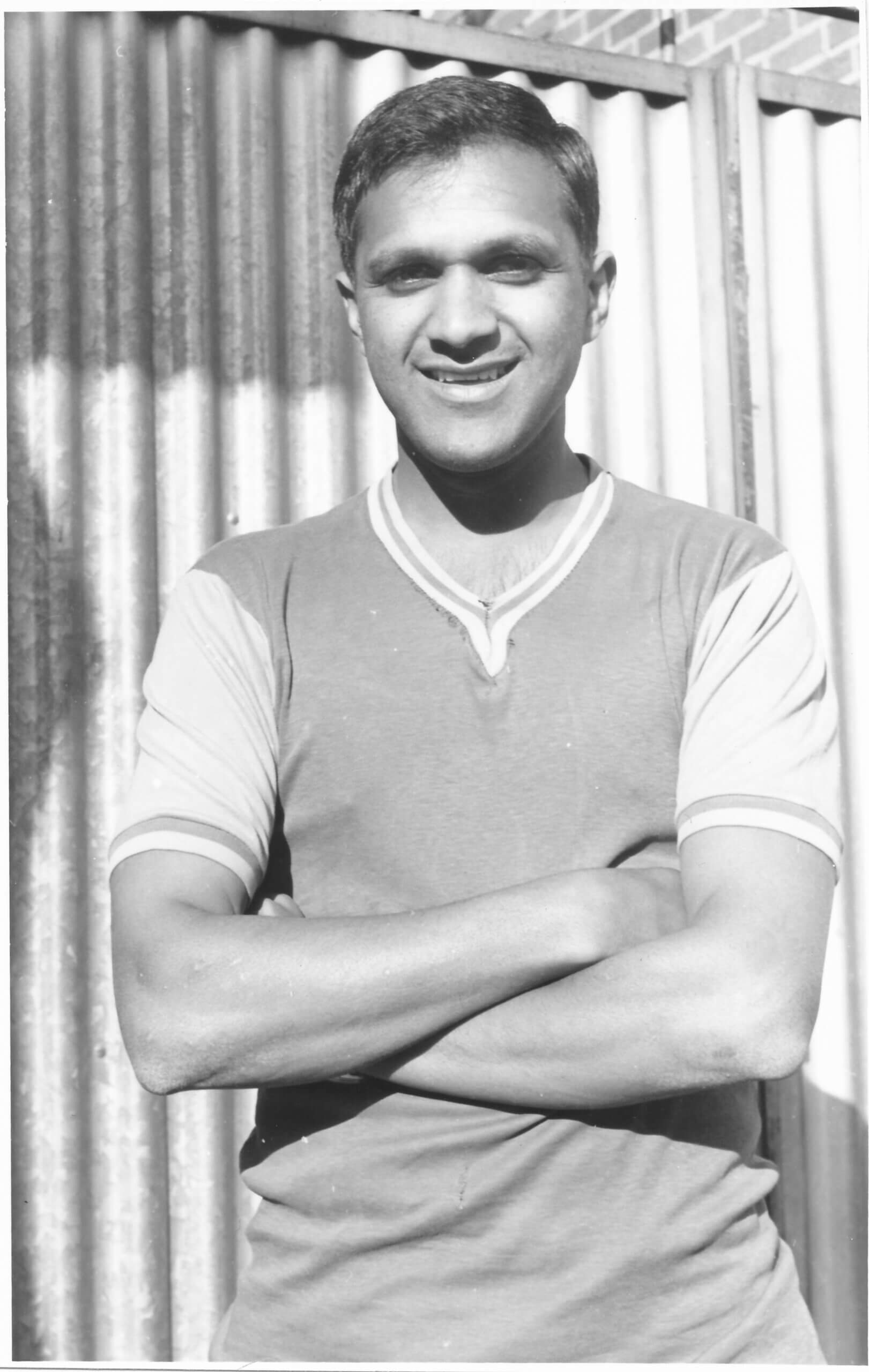 |
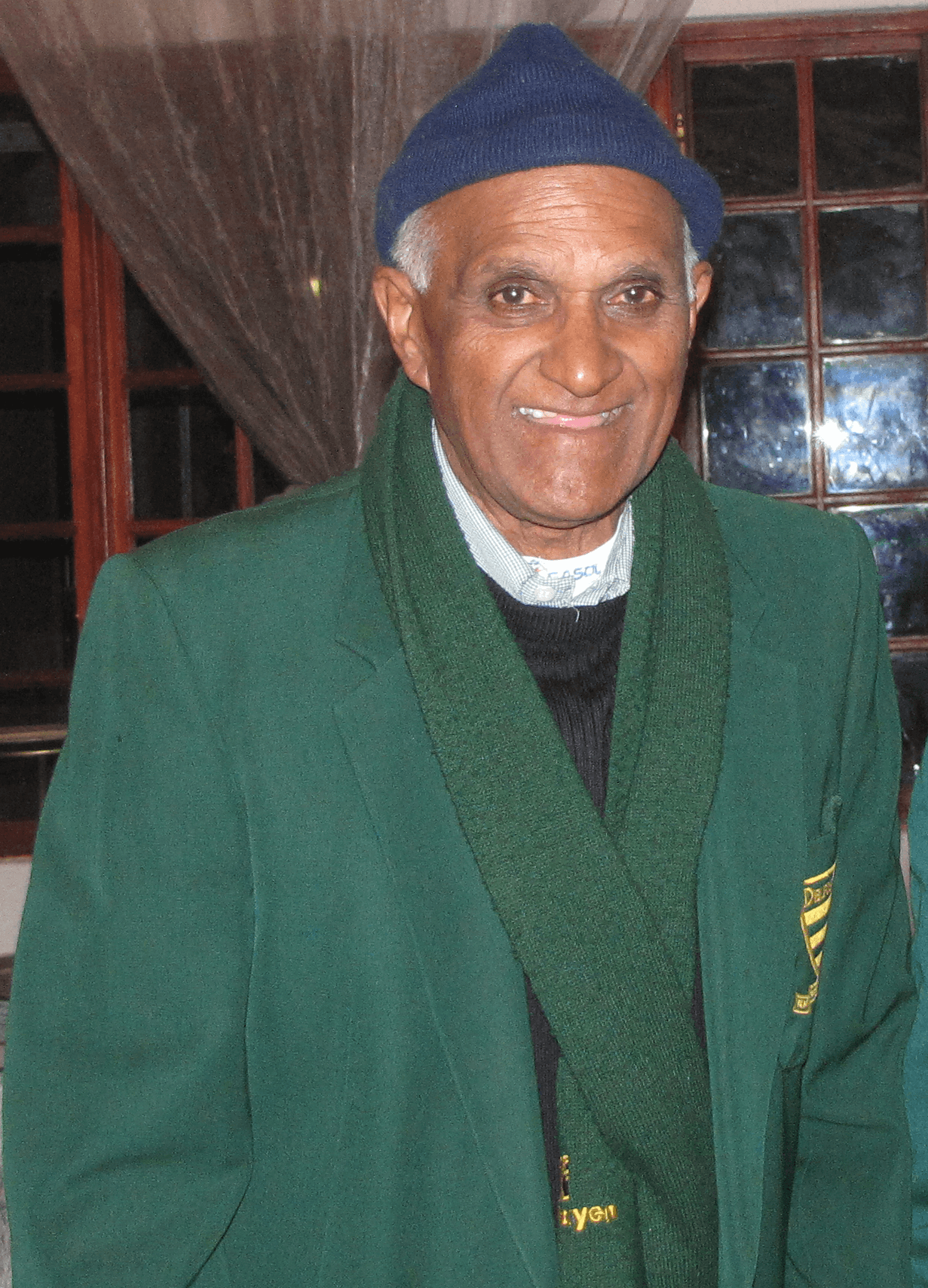 |
We are privileged and honoured to have known you. We thank you for loyal, determined service to our club and for your contribution to our community and our society.
We will miss you. South Africa will miss you.
A Tribute to Magan Ramjee
WE SAY GOODBYE AND REST IN PEACE TO OUR STALWART
MAGAN “UNCLE MAGS” RAMJEE
(15 May 1944 – 11 Jan 2021)
Delfos Football Club is deeply saddened by the passing of our legend and stalwart Mr Magan Ramjee at the age of 76 after being hospitalised, following a heart attack and by-pass surgery.
Our Condolences go out to the family of Mr Magan Ramjee. May his soul rest in peace.
Magan Ramjee was a quiet and unassuming person who was able to get along with everyone. He was able to connect with both young and old, was never short of a jovial comment or exciting story, especially of the ‘good old days’ and was always willing to assist where he could.
Uncle Mags, as he affectionately became known to everyone involved in football, young and old, joined Delfos FC in 1960 after a short stint with Sundowns FC. He remained a member of Delfos from 1960, epitomising the values of commitment, loyalty and unwavering passion for our club and the game.
Uncle Mags represented Delfos FC, as a player throughout the 1960s and 1970s. Although retired, his commitment to our club was clearly demonstrated when he was again called upon to join the player ranks in the mid-1980s. Throughout his career, Uncle Mags, achieved great success with Delfos. He represented the Pretoria District Football Association. Perhaps his greatest footballing achievement was representing Northern Transvaal in the Sam China Cup in 1967. He continued playing social football, into his 70’s, on Sundays with former retired footballers.
Uncle Mags made an even greater contribution to our club and football in our community off the field. He formed an integral part of the “three legends” with his lifetime friends, Nithia Moodley and Diar Soma. Together they inspired generation after generation of footballers.
Uncle Mags worked tirelessly for decades, ensuring that ordinary youngsters had the opportunity to play organised football. To the very end he was always on the grounds, offering advice and encouragement; passionately cheering on every Delfos player. Never one to shy away from hard work, Uncle Mags would always lend a helping hand, whether it was with training the juniors or meticulously ensuring that the Delfos Dinner Dance was a success.
The tireless work ethic was a character trait that personified Uncle Mags. He served Delfos in many capacities, most notably as treasurer and member of the Gonoseelan Memorial Tournament Organising Committee. He was instrumental in designing the current logo represented as a shield in Green and Yellow. He will always be remembered as someone who never sought fame or gratitude. He always very quietly and simply went about doing everything that needed to be done and always succeeding. He represented the club on many occasions at PDFA meetings in the 1970’s defending truth and justice, but never wanting to be in the limelight.
In later years this hard-working humanity saw Uncle Mags helping out members of the community, in his own understated manner. As a stalwart of the club, he truly contributed to the life and times until his untimely passing on Monday 11 January 2021.
He lived his life as our past president Gonoseelan Pillay urged – “Live your life to make the life of another better”.
We are proud and honoured to have known you.
An ardent, loyal giant has fallen. We will miss you, our stalwart.
Thank You for your unwavering Service to the Club.
Delfos Football Club
est 1946
2018 FIFA World Cup…
It Is In Your Hands To Make Of Our World A Better One For All – Nelson Mandela
Today marks the 100th anniversary of the birth of South Africa’s icon, hero and first ever democratically elected President. On this day we remember the global icon fondly known to us as Madiba.
(Source: https://www.nelsonmandela.org/content/page/biography)
Biography of Nelson Mandela
Rolihlahla Mandela was born into the Madiba clan in the village of Mvezo, in the Eastern Cape, on 18 July 1918. His mother was Nonqaphi Nosekeni and his father was Nkosi Mphakanyiswa Gadla Mandela, principal counsellor to the Acting King of the Thembu people, Jongintaba Dalindyebo. In 1930, when he was 12 years old, his father died and the young Rolihlahla became a ward of Jongintaba at the Great Place in Mqhekezweni1.
Hearing the elders’ stories of his ancestors’ valour during the wars of resistance, he dreamed also of making his own contribution to the freedom struggle of his people.
He attended primary school in Qunu where his teacher, Miss Mdingane, gave him the name Nelson, in accordance with the custom of giving all schoolchildren “Christian” names.
He completed his Junior Certificate at Clarkebury Boarding Institute and went on to Healdtown, a Wesleyan secondary school of some repute, where he matriculated.
Mandela began his studies for a Bachelor of Arts degree at the University College of Fort Hare but did not complete the degree there as he was expelled for joining in a student protest.
On his return to the Great Place at Mqhekezweni the King was furious and said if he didn’t return to Fort Hare he would arrange wives for him and his cousin Justice. They ran away to Johannesburg instead, arriving there in 1941. There he worked as a mine security officer and after meeting Walter Sisulu, an estate agent, he was introduced to Lazer Sidelsky. He then did his articles through a firm of attorneys – Witkin, Eidelman and Sidelsky.
He completed his BA through the University of South Africa and went back to Fort Hare for his graduation in 1943.
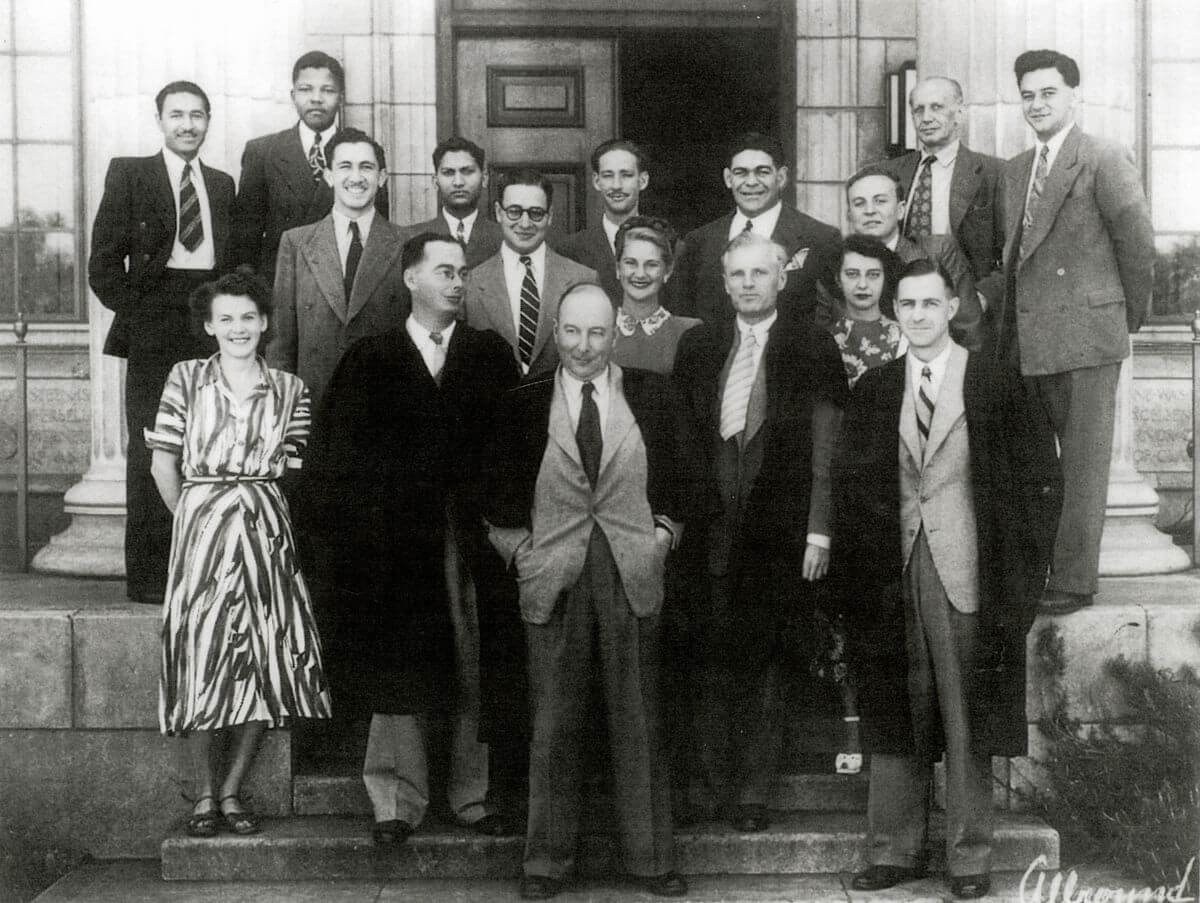
Nelson Mandela (top row, second from left) on the steps of Wits University. (Image: © Wits University Archives)
Entering politics
Mandela, while increasingly politically involved from 1942, only joined the African National Congress in 1944 when he helped to form the ANC Youth League (ANCYL).
In 1944 he married Walter Sisulu’s cousin, Evelyn Mase, a nurse. They had two sons, Madiba Thembekile “Thembi” and Makgatho, and two daughters both called Makaziwe, the first of whom died in infancy. He and his wife divorced in 1958.
Mandela rose through the ranks of the ANCYL and through its efforts, the ANC adopted a more radical mass-based policy, the Programme of Action, in 1949.
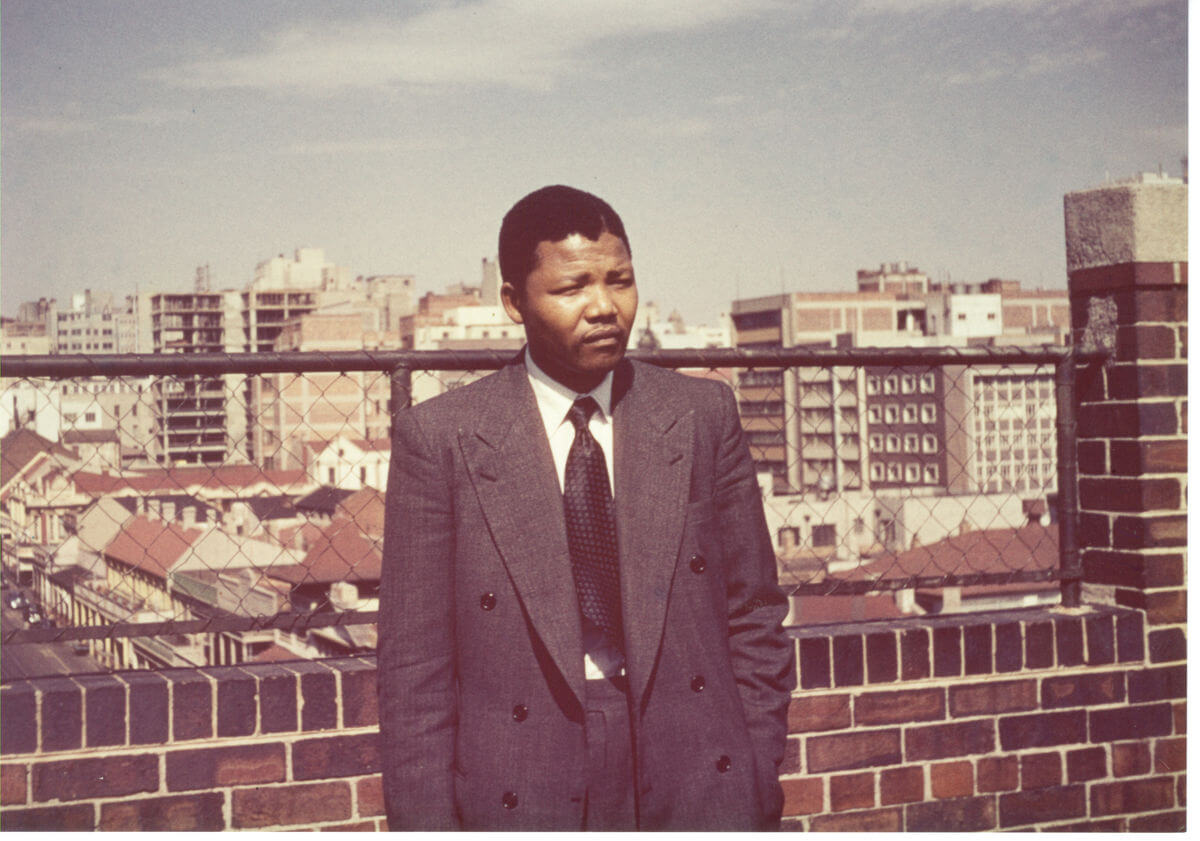
Nelson Mandela on the roof of Kholvad House in 1953. (Image: © Herbert Shore, courtesy of the Ahmed Kathrada Foundation)
In 1952 he was chosen as the National Volunteer-in-Chief of the Defiance Campaign with Maulvi Cachalia as his deputy. This campaign of civil disobedience against six unjust laws was a joint programme between the ANC and the South African Indian Congress. He and 19 others were charged under the Suppression of Communism Act for their part in the campaign and sentenced to nine months of hard labour, suspended for two years.
A two-year diploma in law on top of his BA allowed Mandela to practise law, and in August 1952 he and Oliver Tambo established South Africa’s first black law firm, Mandela & Tambo.
At the end of 1952 he was banned for the first time. As a restricted person he was only permitted to watch in secret as the Freedom Charter was adopted in Kliptown on 26 June 1955.
The Treason Trial
Mandela was arrested in a countrywide police swoop on 5 December 1955, which led to the 1956 Treason Trial. Men and women of all races found themselves in the dock in the marathon trial that only ended when the last 28 accused, including Mandela, were acquitted on 29 March 1961.
On 21 March 1960 police killed 69 unarmed people in a protest in Sharpeville against the pass laws. This led to the country’s first state of emergency and the banning of the ANC and the Pan Africanist Congress (PAC) on 8 April. Mandela and his colleagues in the Treason Trial were among thousands detained during the state of emergency.
During the trial Mandela married a social worker, Winnie Madikizela, on 14 June 1958. They had two daughters, Zenani and Zindziswa. The couple divorced in 1996.
Days before the end of the Treason Trial, Mandela travelled to Pietermaritzburg to speak at the All-in Africa Conference, which resolved that he should write to Prime Minister Verwoerd requesting a national convention on a non-racial constitution, and to warn that should he not agree there would be a national strike against South Africa becoming a republic. After he and his colleagues were acquitted in the Treason Trial, Mandela went underground and began planning a national strike for 29, 30 and 31 March.
In the face of massive mobilisation of state security the strike was called off early. In June 1961 he was asked to lead the armed struggle and helped to establish Umkhonto weSizwe (Spear of the Nation), which launched on 16 December 1961 with a series of explosions.
On 11 January 1962, using the adopted name David Motsamayi, Mandela secretly left South Africa. He travelled around Africa and visited England to gain support for the armed struggle. He received military training in Morocco and Ethiopia and returned to South Africa in July 1962. He was arrested in a police roadblock outside Howick on 5 August while returning from KwaZulu-Natal, where he had briefed ANC President Chief Albert Luthuli about his trip.
He was charged with leaving the country without a permit and inciting workers to strike. He was convicted and sentenced to five years’ imprisonment, which he began serving at the Pretoria Local Prison. On 27 May 1963 he was transferred to Robben Island and returned to Pretoria on 12 June. Within a month police raided Liliesleaf, a secret hideout in Rivonia, Johannesburg, used by ANC and Communist Party activists, and several of his comrades were arrested.
On 9 October 1963 Mandela joined 10 others on trial for sabotage in what became known as the Rivonia Trial. While facing the death penalty his words to the court at the end of his famous “Speech from the Dock” on 20 April 1964 became immortalised:
“ I have fought against white domination, and I have fought against black domination. I have cherished the ideal of a democratic and free society in which all persons live together in harmony and with equal opportunities. It is an ideal which I hope to live for and to achieve. But if needs be, it is an ideal for which I am prepared to die. ”
Speech from the Dock quote by Nelson Mandela on 20 April 1964
On 11 June 1964 Mandela and seven other accused, Walter Sisulu, Ahmed Kathrada, Govan Mbeki, Raymond Mhlaba, Denis Goldberg, Elias Motsoaledi and Andrew Mlangeni, were convicted and the next day were sentenced to life imprisonment. Goldberg was sent to Pretoria Prison because he was white, while the others went to Robben Island.
Mandela’s mother died in 1968 and his eldest son, Thembi, in 1969. He was not allowed to attend their funerals.
On 31 March 1982 Mandela was transferred to Pollsmoor Prison in Cape Town with Sisulu, Mhlaba and Mlangeni. Kathrada joined them in October. When he returned to the prison in November 1985 after prostate surgery, Mandela was held alone. Justice Minister Kobie Coetsee visited him in hospital. Later Mandela initiated talks about an ultimate meeting between the apartheid government and the ANC.
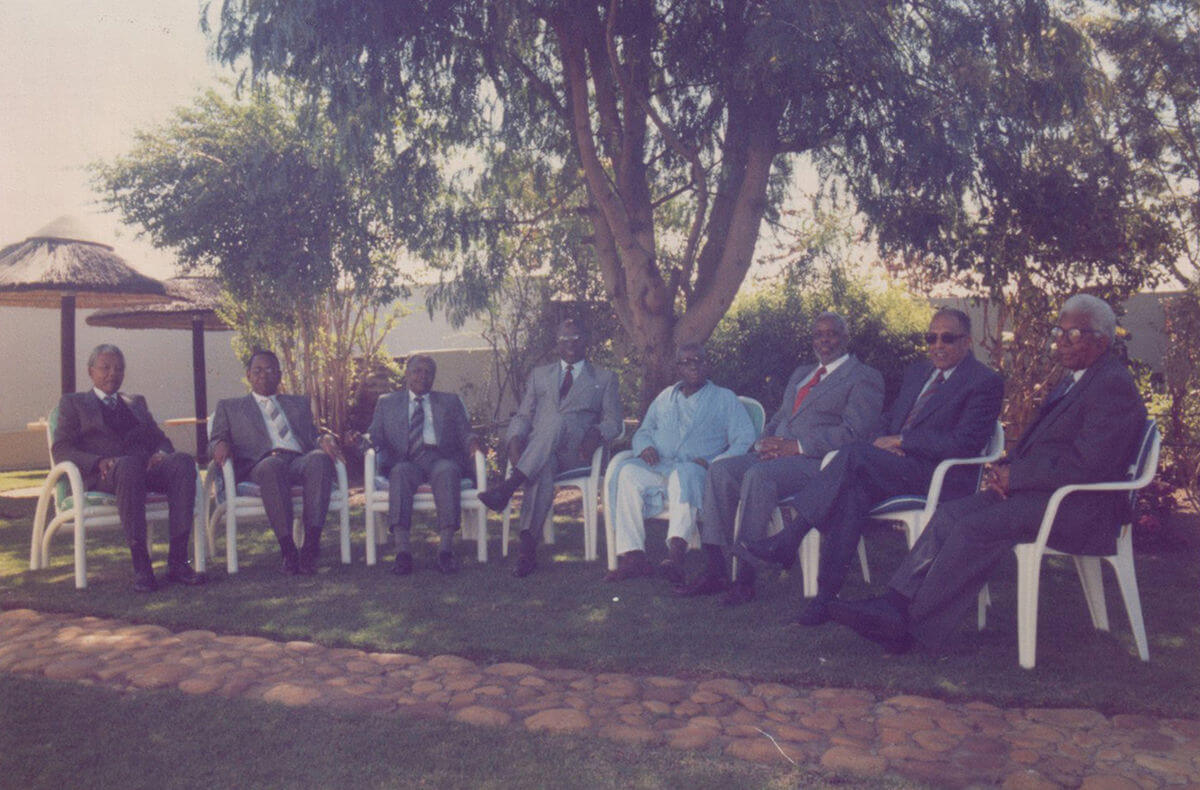
A picture captured during a rare visit from his comrades at Victor Verster Prison. (Image: © National Archives of South Africa)
Release from prison
On 12 August 1988 he was taken to hospital where he was diagnosed with tuberculosis. After more than three months in two hospitals he was transferred on 7 December 1988 to a house at Victor Verster Prison near Paarl where he spent his last 14 months of imprisonment. He was released from its gates on Sunday 11 February 1990, nine days after the unbanning of the ANC and the PAC and nearly four months after the release of his remaining Rivonia comrades. Throughout his imprisonment he had rejected at least three conditional offers of release.
Mandela immersed himself in official talks to end white minority rule and in 1991 was elected ANC President to replace his ailing friend, Oliver Tambo. In 1993 he and President FW de Klerk jointly won the Nobel Peace Prize and on 27 April 1994 he voted for the first time in his life.
President
On 10 May 1994 he was inaugurated as South Africa’s first democratically elected President. On his 80th birthday in 1998 he married Graça Machel, his third wife.
True to his promise, Mandela stepped down in 1999 after one term as President. He continued to work with the Nelson Mandela Children’s Fund he set up in 1995 and established the Nelson Mandela Foundation and The Mandela Rhodes Foundation.
In April 2007 his grandson, Mandla Mandela, was installed as head of the Mvezo Traditional Council at a ceremony at the Mvezo Great Place.
Nelson Mandela never wavered in his devotion to democracy, equality and learning. Despite terrible provocation, he never answered racism with racism. His life is an inspiration to all who are oppressed and deprived; and to all who are opposed to oppression and deprivation.
He died at his home in Johannesburg on 5 December 2013.
First Delfos FC 7evens Nights Series a success and Over 40’s want more…
The First, in what will become a regular feature in the Delfos FC calendar, the 7evens Night Series was a resounding success. The 7evens night series for Veterans (over 40’s) was inaugurated on Fri 20 April 2018 at the Laudium Stadium with the following 8 teams participating:
Aches & Pains
B7even
Delfos
Laud Old Boys
Maritzboro
No Ego
Santos
Young Eagles
The format of the competition was 7v7, with a round robin between 2 groups of 4 with the winners of each group playing in the finals. The finals were contested by Young Eagles and Aches & Pains. Aches & Pains went on to win the final match in a penalty shootout. Pictured below is the winning team, Aches, Pains and all smiles.
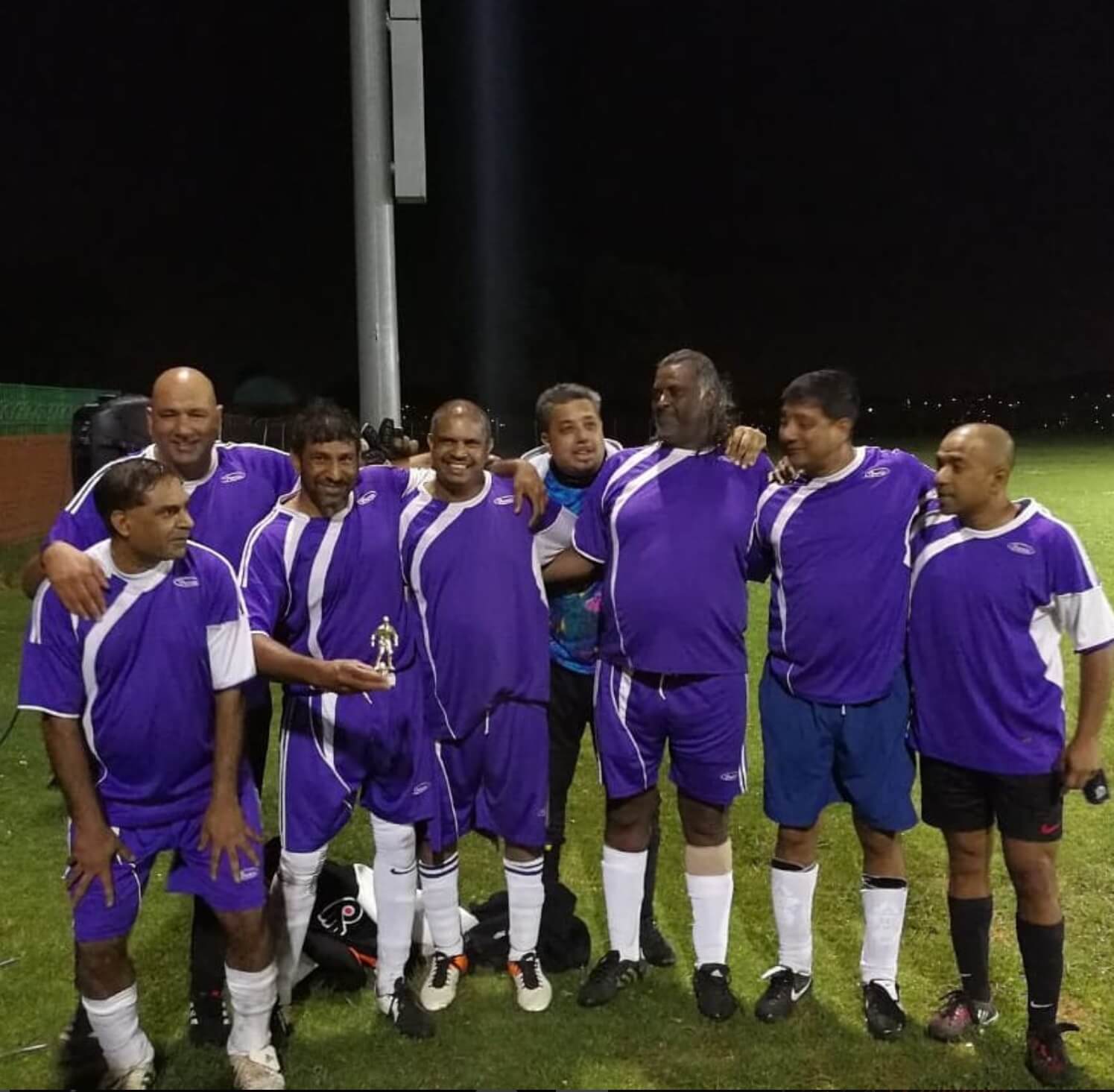
Gulzaar Cassim, Vilasen Naidoo (Captain), Jayanthie Aurakeasamy, Shaniel Baktawer, Ravi Pillay, “Boo”, Marlon Ponnen, Manogaran Naidoo, Not in picture Sudesh Mooloo
Congratulations to all the teams that participated in making it through the night, in particular Aches and Pains for winning the inaugural event. After that 1st event everyone that participated is sure to have felt the aches and pains the next day.
Following the event there was lots of feedback and comments and it is clear that the over 40’s want more, so Delfos FC will be hosting what is expected to be a monthly feast of veterans football (over 40’s), skills from yesteryear, friendly banter, laughter and lots more fun. Lookout out for details of our next event set for Friday 25 May 2018.
Why do we celebrate Human Rights Day on 21 March?
Source: https://www.parliament.gov.za/project-event-details/2
What are human rights?
Human rights are rights that everyone should have simply because they are human. In 1948, the United Nations defined 30 articles of human rights in the Universal Declaration of Human Rights. It established universal human rights on the basis of humanity, freedom, justice, and peace.
South Africa has included indivisible human rights in our own Bill of Rights, Chapter 2 of the Constitution of the Republic of South Africa, 1996. The articles of our Constitution can only be changed by a two-thirds majority in Parliament, which means it is difficult for anyone, including the government, to take away the basic rights of a citizen.
The Bill of Rights preserved in our Constitution is the cornerstone of our constitutional and representative democracy. The Constitution as our supreme law means that no laws may be passed that goes against it. The Bill of Rights also comprehensively addresses South Africa’s history of oppression, colonialism, slavery, racism and sexism and other forms of human violations. The Bill of Rights embeds the rights of all people in our country in an enduring affirmation of the democratic values of human dignity, equality and freedom.
Human Rights Day, 21 March
Human Rights Day in South Africa is historically linked with 21 March 1960, and the events of Sharpeville. On that day 69 people died and 180 were wounded when police fired on a peaceful crowd that had gathered in protest against the Pass laws. This day marked an affirmation by ordinary people, rising in unison to proclaim their rights. It became an iconic date in our country’s history that today we commemorate as Human Rights Day as a reminder of our rights and the cost paid for our treasured human rights.
Apartheid policies
In 1948 the Nationalist Party came to power in South Africa and formalised segregation in a succession of laws that gave the government control over the movement of Black people in urban areas. The Native Laws Amendment Act of 1952 narrowed the definition of Blacks with permanent residence in towns and cities. Legally, no Black person could leave a rural area for an urban one without a permit from the local authorities, and on arrival in an urban area, the person had to obtain a permit within 72 hours to seek work. The Reference Book, or Pass, included a photograph, details of place of origin, employment record, tax payments, and encounters with the police.
In 1956 women from all walks of life, protested against the racist Pass laws, when 20,000 women marched to the Union Building in Pretoria, singing “wathint’ abafazi, wathint’ imbokodo – you strike a woman, you strike a rock”.
Anti-Pass law campaign
The Pan Africanist Congress (PAC) proposed an anti-Pass campaign to begin on 21 March 1960. Black men gathered at Sharpeville without passes and presented themselves for arrest. The order was given to disperse, after which the Police opened fire on the crowd of men, women and children. Following the Sharpeville massacre, a number of black political movements were banned by the Nationalist government, but the resistance movement continued to operate underground.
Modern era
When South Africa held its first democratic election, with Nelson Mandela elected as its first democratic President, 21 March, Human Rights Day was officially proclaimed a public holiday.
On Human Rights Day, South Africans are asked to reflect on their rights, to protect their rights and the rights of all people from violation, irrespective of race, gender, religion, sexual orientation, whether they are foreign national or not – human rights apply to everyone, equally.
We must remain vigilant and report abuse and cruelty, such as human trafficking, child labour, forced labour and violence against women, children, and the aged and other vulnerable groupings of people.
What are your rights?
In terms of the Bill of Rights everyone has a right to life, equality and human dignity.
- All persons have a right to citizenship and security. Persons and groups are entitled to freedom of assembly, association, belief and opinion, and expression. They have the right to demonstrate, picket and petition; everyone has the right to be free from forced labour, servitude and slavery.
- All persons have a right to privacy and to exercise political rights; all have a right to access to information and just administration action. They have rights when arrested, detained and accused, and must have access to courts.
- All have a right to freedom of movement and residence and of trade, occupation and profession. In the workplace everyone has a right to engage in trade unions and labour movements. Anyone has the right to purchase property anywhere, and to a basic education. They have a right to language and culture and communities; and not least, freedom of religion and belief. The Bill of Rights also specifies the rights of persons belonging to cultural, religious or linguistic communities and the rights of children. In addition, there are specific laws to safeguard women and protect children.
- Protected rights include a healthy environment; housing, health care, food, water and social security.
Parliament’s Role in Human Rights Day
Parliament is guided by the values and principles of the Constitution. The tasks of Parliament are to represent and empower the people, and to facilitate meaningful and active involvement of civil society in its processes. The Constitutional functions of Parliament are to pass laws and oversee executive action. Parliament must ensure that democratic processes become well-known and that they reach all citizens of the country and that the civil liberties of every citizen is maintained.
Visiting Parliament
We are proud to invite local and international visitors to our Parliament, the receptacle and guardian of the legacy of human rights in South Africa. The Public Education Office offers free tours of Parliament, and the Public Relations Office assists members of the public wishing to observe debates from the galleries in the National Assembly and National Council of Provinces. Visitors can also attend Public Hearings or Committee meetings.
For more information contact the Public Education Office of Parliament.
Contact Person: Nhlanhla Mrwerwe
Telephone: (021) 403 2266
Fax: (021) 403 3817 / 403 3303
E-mail: tours@parliament.gov.za
You are what you eat…
Source: Coerver Performance Academy (https://mailchi.mp/428b1cdcc5bc/you-are-what-you-eat)

What should a soccer player eat?
All kids need to eat balanced meals and have a healthy diet. But should that balance change for kids who are involved in sports?
Kids need to eat the right amount and mix of foods to support that higher level of activity, but that mix might not be too different from a normal healthy diet. Eating for sports should be an extension of healthy eating for life.
Nutritional Needs of Young Athletes
Kids who eat healthy, well-balanced meals and snacks will get the nutrients needed to perform well in sports.
Kids and teens who are involved in all-day competitions or strenuous endurance sports (like rowing, cross-country running, or competitive swimming) that can involve 1½ to 2 hours or more of activity at a time, in particular, may need to consume more food to keep up with increased energy demands.
Most athletes will naturally eat the right amount of food their bodies need. But if you’re concerned that your child is getting too much or too little food, check in with your doctor.
Besides getting the right amount of calories, it takes a variety of nutrients to keep young athletes performing at their best:
- Vitamins and minerals: Kids need a variety of vitamins and minerals. Calcium and iron are two important minerals for athletes:
- Calcium helps build strong bones to resist breaking and stress fractures. Calcium-rich foods include low-fat dairy products like milk, yogurt, and cheese, as well as leafy green vegetables such as broccoli.
- Iron helps carry oxygen to all the different body parts that need it. Iron-rich foods include lean meat, chicken, tuna, salmon, eggs, dried fruits, leafy green vegetables, and fortified whole grains.
- Protein: Protein helps build and repair muscles, and most kids get plenty of it through a balanced diet. Protein-rich foods include fish, lean meat and poultry, dairy products, beans, nuts, and soy products. Too much protein can lead to dehydration and calcium loss.
- Carbohydrates: Carbs provide energy for the body. Some diet plans have urged weight-conscious adults to steer clear of carbs, but for a young athlete they’re an important source of fuel. There’s no need for “carb loading” (eating a lot of carbs in advance of a big game), but without carbs in their diet, kids will be running on empty. When you’re choosing carbs, look for whole-grain foods like whole-wheat pasta, brown rice, whole-grain bread and cereal, and plenty of fruits and vegetables.
We found a link for a good meal planner for an Academy level footballer, just click the button below to read more. Remember, everything in moderation, it’s never ideal to over do things! That being said, to succeed at the highest level takes sacrifice and getting our kids into good habits early will make things easier when they get the “Academy Level”.
Good luck in the games this weekend!
-The Coerver Team –
DELFOS FC SENIORS COMPLETE THE TREBLE
CLASS OF 2017
DELFOS FC SENIORS COMPLETE THE TREBLE
On 28 October 2017, the Delfos FC Seniors won the Steve Alexander Cup in a dramatic 1-0 victory over Highlands City. By this victory, the Delfos FC Seniors achieved what many thought to be an impossible dream – THE TREBLE.
The 2017 treble winning team won the FAP League, Challenge Cup and the Steve Alexander Cup.
The treble achievement has ensured that this team has written its name in the annals of football history. As far as we have been able to establish Delfos FC, is the first club to achieve the treble in the history of the Football Association of Pretoria [although there are unconfirmed reports of a similar achievement by Porto FC in the early 1990’s].
[BACK ROW L-R] Thillay Pillay, Imraan Khan, Kelly Montshiwa, Sohail Kamroodeen, Sithembiso Mahloko, Dumisani Kgatla, Krisen Padayachee, Shicaar Mooloo.
[MIDDLE ROW L-R] Sammy Maake, Reginald Mmutle, Sibusiso Mqululi, Wonder Mokgehle, Katlego Mabusela, Kabelo Mathibe, Rodney Kock, Ziyaad Moosa, Russell Ernest.
[FRONT ROW L-R] Kagiso Pitso, Wanda Rala, Mustapha Ali, Waleed Fortune, Keenan Pillay, Sam Maboko, Hector Mahlangu, Vuyo Kweza.
[NOT PRESENT] Lebogang Mokoena, Xolani Buthelezi, Jerry Maogale, Kesivan Chetty
This most remarkable achievement is best illustrated by the statistics for the season.
League
| P | W | D | L | GF | GA | Diff | Pts |
| 27 | 24 | 2 | 1 | 79 | 14 | 65 | 74 |
Challenge Cup (Total of 6 goals scored)
FINAL: Delfos FC beat Highlands City 2 – 0
Steve Alexander Cup (Total 12 goals scored)
FINAL: Delfos FC beat Highlands City 1 – 0
Delfos FC won the league 16 pts clear of second placed Red Devils. Throughout the season the team only lost 1 game. The team scored 92 goals at a ratio of almost 3 goals per game and conceded 17 goals.
Despite winning the league before the season ended, the camaraderie and teamwork developed over the season made them all want to win every game and set a record.
The current team etched itself into the illustrious 71 year history of the Delfos Football Club. They have emulated the success of the 1950’s team who were the PDFA and Transvaal League Champions, the team of 1987 that won the PDFA League and the Essops Cup and the team of 1990 that won the PDFA League and the Impala League the following year, having done so unbeaten.
Incidentally the team that achieved success in the 1980’s was coached by Diar Soma who turned 80 this year. Diar Soma was a player in the 1950’s winning teams. Thillay Pillay was player in the 1987 and 1990’s winning team and today is the coach of the FAP Senior team achieving the Treble.
Congratulations to the FAP Senior team. We look forward to a more challenging and reward season in 2018!
A salute to a Legend…
There is a saying in Delfos – live your life so that you make the life of another better. It is words that have been echoed by a former President of the club Mr Gonoseelan Pillay and is one that continues to embody the spirit of the volunteers in our club.
On 18 Oct 2017 a stalwart and volunteer in our club celebrated his 80th birthday. A milestone for anyone but importantly for someone who has been an integral part of our club for more than 60years of his life.
Diar D. Soma, also known as Uncle D, Uncle Diar, Tate, Sir is a legend in our club who joined our club in 1955 , 62 years ago.
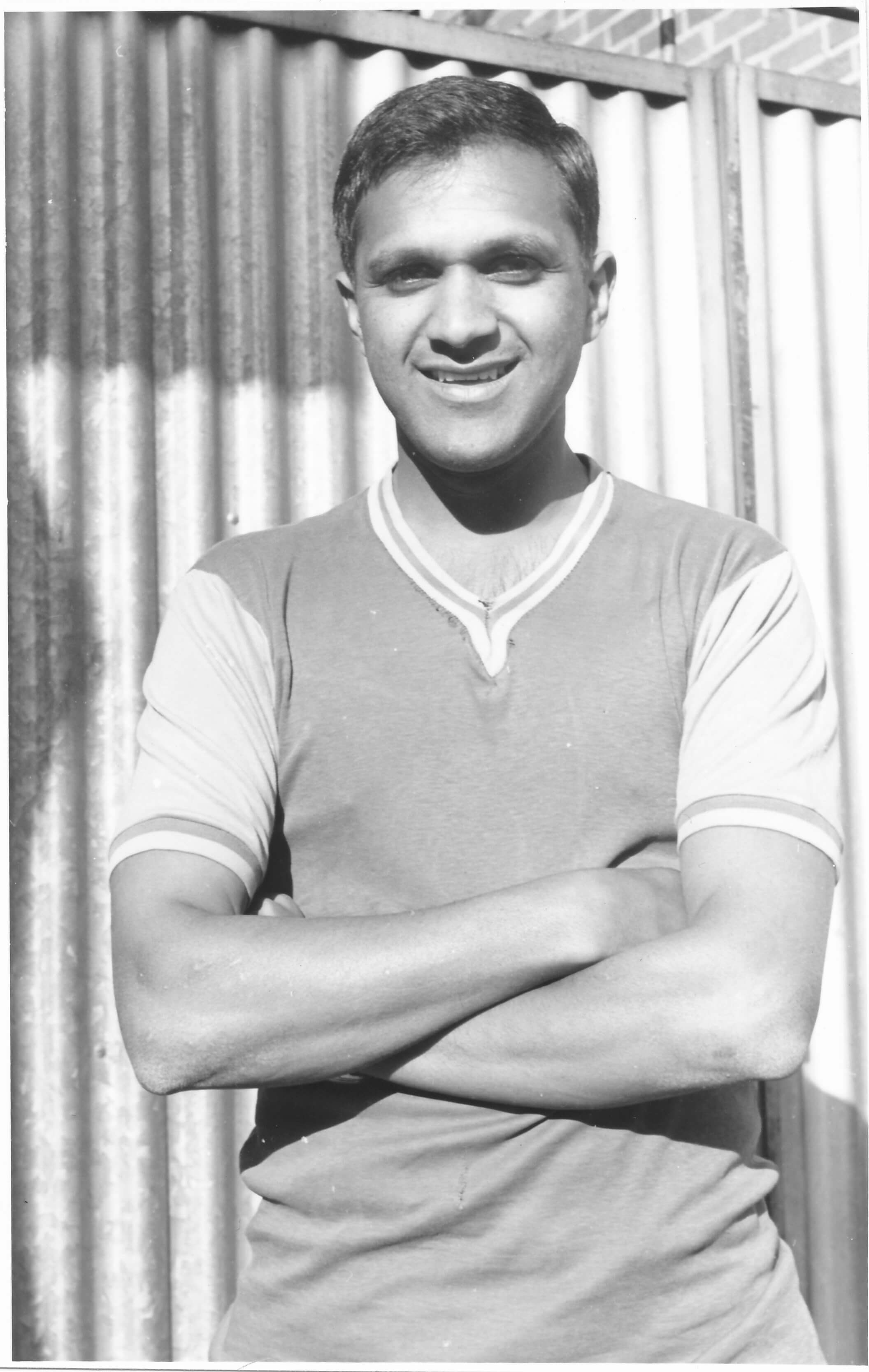 |
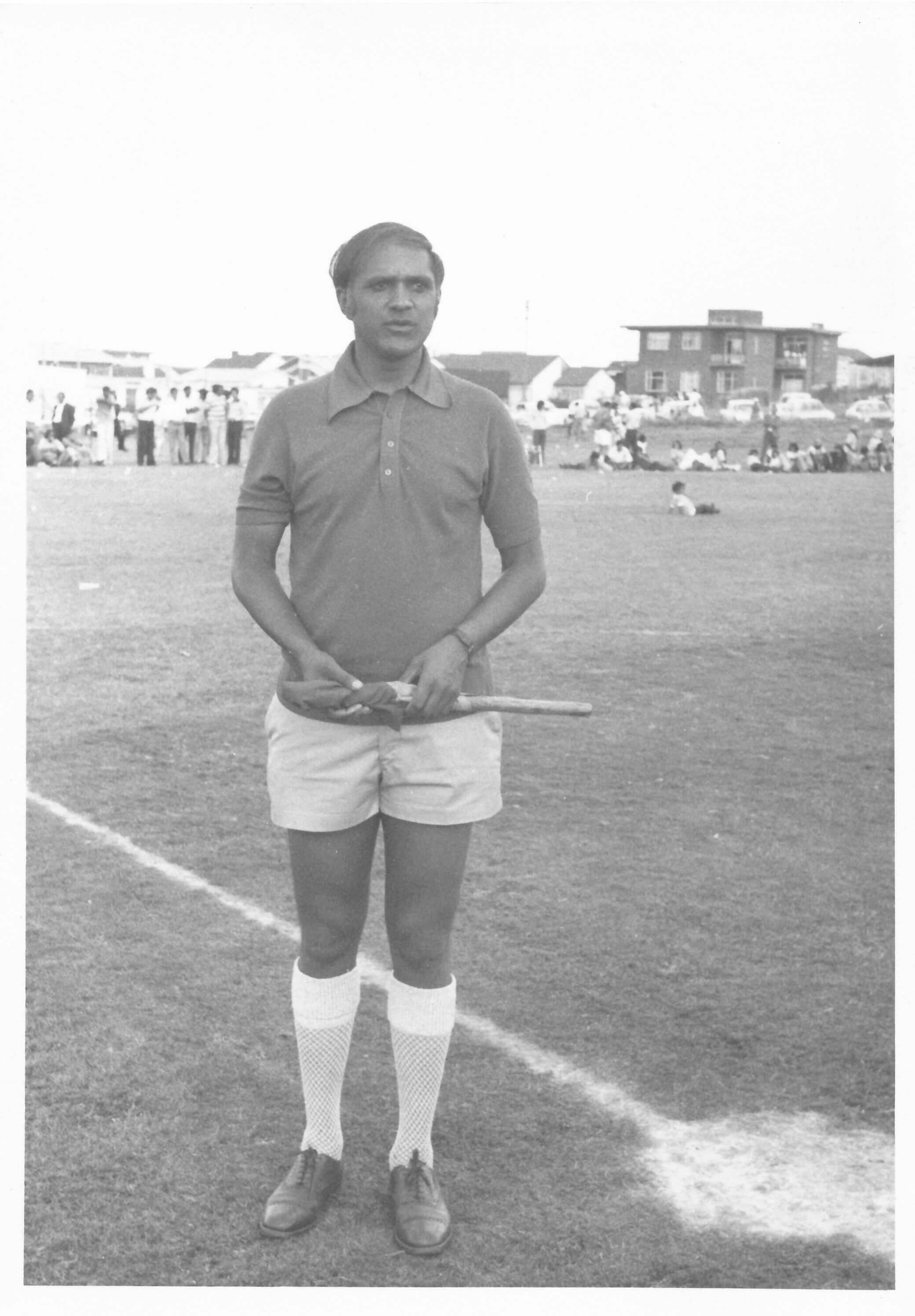 |
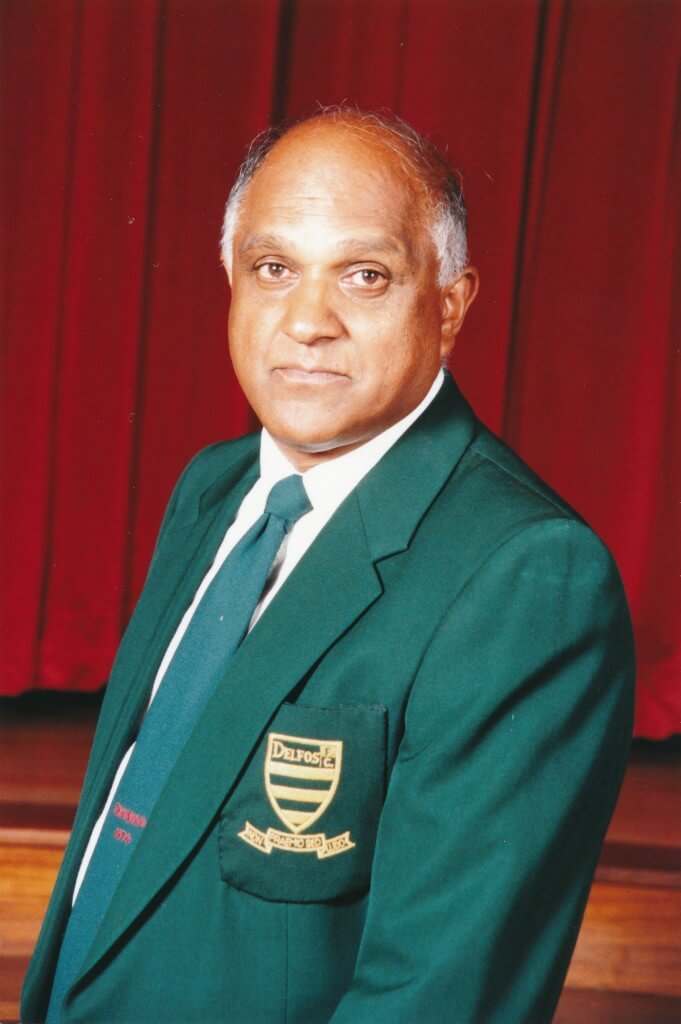 |
He has been a loyal and committed member for every minute, every day, every month and every year of those 62 years. He has unselfishly imparted his wisdom throughout this time without fear or favour. His commitment to our club is simply remarkable.
Today, he will often be seen at the grounds during training or games, home or away. You will find him in the stands cheering the players on, offering support and advise, enquiring about the club and the future and how we are doing.
This personality and principled commitment was not only one that was restricted to Delfos FC. A teacher by profession, he was a remarkable history teacher – whose influence on generation after generation is simply amazing. He taught history by subject, but principled righteousness by example.
He was the president of our club and the PDFA (now LFA) for decades. Under his leadership, during the most trying times of apartheid, football and sports in black communities flourished.
He is a principled man who fought tirelessly for the rights of all South Africans. Without any fear he stood up against an abhorrent system. Never afraid to speak his mind and articulate what was right. In his view there could never be normal football in an abnormal society.
He influenced generation after generation of sportsman in the way he trained, coached and led by example both as a player and a coach/manager. Stories of a tall, strong centre forward sprinting towards the opposition goals, striking fear in to all defenders and goalkeepers are legendary.
His achievements are as equally legendary. A professional footballer, he represented Transvaal in the Sam China Cups a number of times in the 1960’s. His achievement of the Transvaal team that won the inter-provincial tournament in the 1970s is what movies are made of, when they annihilated every other province. He also coached the Transvaal team in 1974. Besides the football so is his legendary comments – “powder puff” a phrase he regularly imparts to describe a poor soft attempt at shooting for goals.
Today he isn’t a tall or strapping gentleman as before – but his shadow and his commitment to the club is huge. At a recent awards evening held for U17 and Seniors of the Delfos Football Club, he was awarded a momento and given due recognition for his contribution to the club. Here is pictured receiving the award from his long time friend and fellow footballer, Magan Ramjee
Uncle D, congratulations on your 80th Birthday. We wish you many more years to come.
“Not for the Glory, But for the Game”
Why do some people call it soccer?
Known to most of the rest of the world as football, or “fútbol,” the beautiful game is almost exclusively referred to as soccer in the United States, but many Americans may be surprised to learn that our outlier moniker actually originated across the pond.
Games played by kicking, hitting, throwing or carrying a ball have been around for thousands of years, but in the mid-to-late-19th century many sports—such as baseball, soccer, and American football—codified their rulebooks into the forms we recognize today. Modern soccer was born in 1863, when representatives from several English schools and clubs got together to standardize a single set of rules for their matches. They dubbed their new organization the Football Association, and their version of the game became known as “Association Football.” The word association was used to distinguish their specific sport from other popular games of the day such as “rugby football.”
The word soccer comes from a slang abbreviation of the word association, which British players of the day adapted as “assoc,” “assoccer” and eventually soccer or soccer football. (The habit of adding –er to nicknames in British vernacular is frequently attributed to Oxford students of that period, and can be found in other sporting slang such as “rugger” for rugby.)
The parallel names soccer and football (or the combined soccer football) were used more or less interchangeably to refer to association football until well into the 20th century, at which point football emerged as the dominant name in most parts of the world. However, in countries where another football variety was already popular—such as America and Australia—the name soccer stuck around.
Source: http://www.history.com/news/ask-history/why-do-some-people-call-it-soccer?cmpid=Social_FBPAGE_HISTORY_20150607_189480786&linkId=14759488
Squad of 96’ inducted into Hall of Fame
21 August 2017 – The South African Hall of Fame hosted one of the biggest Gala Induction Dinners on Sunday, 20 August at Sun City where the 1996 Africa Cup of Nations (AFCON) Bafana Bafana winning squad was officially inducted into the Hall of fame.
The golden generation that lifted Africa’s most sought-after trophy gathered earlier in the day for a round of golf before heading off to the gala dinner that was also attended by SAFA President, Dr Danny Jordaan, Dr Irvin Khoza, Dr Molefi Olifant, Mr. Kaizer Motoung and legendary South African footballer, Jomo Sono.
Ahead of the Hall of fame induction, Dr Jordaan delivered a memorable speech that took the players and guests down memory lane where the former African champions played a significant role in uniting what was a divided nation through football.

Coach of the squad, Clive Barker who also qualified the nation for its first ever FIFA World Cup back in 1998 thanked SAFA for making the effort of recognizing the achievements of the players during a very difficult time in the country.
“These players achieved what no other country could have ever managed under trying times. We were a united force and that played a huge role in us conquering Africa. Till today, I am proud of the class of 96’ and happy that some of those heroes are still serving the country through football” said Barker.
SAFA – Stop the violence
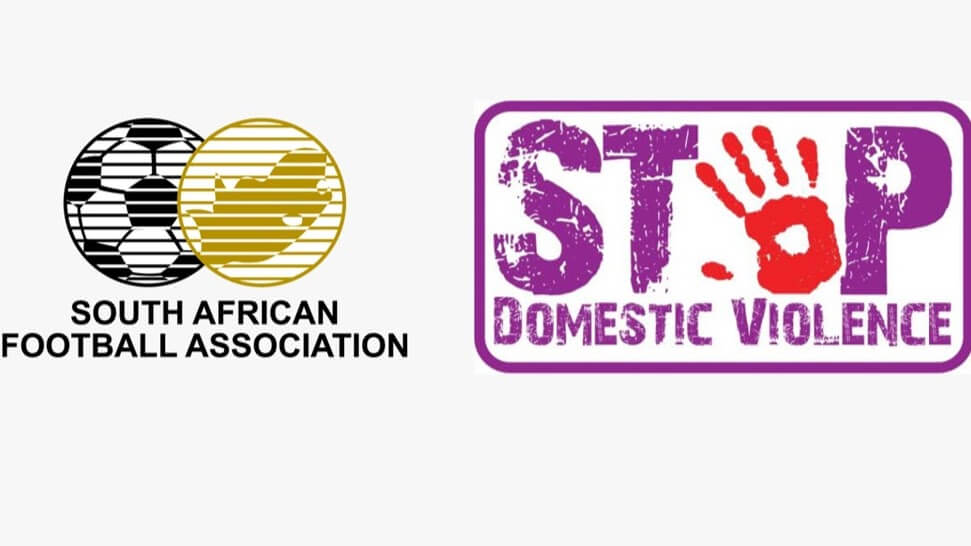
The South African Football Association (SAFA) is deeply saddened by the never-ending stream of reports of heinous violence being committed against women and children on a daily basis.
We are informed by the UN Commission on the Status of Women (CSW) that 1 out of 3 women around the world have been subjected to gender-based violence at some point in their lives – a shocking statistic indeed!
“violence against women is understood as a violation of human rights and a form of discrimination against women and shall mean all acts of gender-based violence that result in, or are likely to result in, physical, sexual, psychological or economic harm or suffering to women, including threats of such acts, coercion, etc.” —(CSW)
Football is a simple game that requires a skill that not many can perform in equal measure on the field of play. The discipline to run with the ball at your feet while dodging opponents who are constantly trying to take it away from you is a skill that takes many years to perfect. However, once learned and executed successfully, it builds confidence, strengthens self-esteem and respect for those who battle to take the ball away from you all the time.
Playing as part of a team also instils a sense of belonging and develops deep respect for those who try to take the ball away from you all the time. Discipline, respect, teamwork and emotional strength are therefore hallmarks of the game.
The Association is therefore saddened by attempts of elements in our society who deny women and children their dignity, who prey on the most vulnerable and who disrespect our core values of respect for one another at all times.
This Association views any other traits such as violence and disrespect and contempt for life as the most abhorrent forms of behaviour that does not belong in our sport.
SAFA calls on the millions of football players and supporters in our country to take a stand against violence against the most vulnerable members of our society, especially women and children. This is the time that we should not just pay lip service but stand up and take an active stand against gender violence and child abuse, support civil society and government efforts to rid our society of this scourge.
We kindly call on all our football clubs around the country to observe a moment of silence in upcoming matches in defiance of those who perpetrate these evils deeds and adopt a year-round programme of reminding our people that violence has no place in our society and that the football community will do everything to stop it. Please join our communities in the fight against violence!
Score a goal against gender violence and child abuse!
20 Years ago today…
Bafana mark 20th anniversary
(Source: Supersport.com website: http://www.supersport.com/football/bafana/news/160202/Bafana_mark_20th_anniversary)
r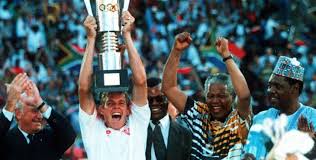
The 3rd of February marks the 20th anniversary since Bafana Bafana lifted the coveted Africa Cup of Nations trophy on home soil with a heart-stopping 2-0 win over Tunisia at a packed FNB Stadium.
With South African Football Association (SAFA)’s Vision 2022 in full throttle, Technical Director and the man who led the country to that historic win, Neil Tovey, says the country is heading back to the top and implored everyone to embrace the ambitious idea.
“When we took to the field, little did we know we were creating a piece of history on the day, history that would define this country for years to come.
“We took to the field with no pressure at all and our intention was just to win the game. We never knew it would take ages to repeat the same feat but with Vision 2022, I am glad and hopeful that we are headed back to the top again,” said Tovey.
The former Bafana Bafana captain said 1996 was the greatest moment of his sporting career and thinking about receiving the trophy from the late Father of the Nation, Nelson Mandela, still gives him goosebumps.
“Images of the team receiving the trophy and celebrating the win are still idolised across the continent and the globe and one cannot ask for a better sporting memory.”
Winning coach Clive Barker says memories of 1996 come once in a lifetime and his only regret is the passing on of Sizwe Motaung and John ‘Shoes’ Moshoeu.
“I would have loved the two to be part of the 20th anniversary of this great sporting feat as they both played pivotal roles in that achievement. I remember vividly Shoes playing as a man possessed in the semifinal win over Ghana which earned him the man-of-the-match award,” remembers Barker.
“It was tremendous for the country, more so with rugby having won the World Cup a year earlier. But it was the first win over Cameroon that set the tone for the entire tournament.
“All in all, we had a special bunch of players, a group of players that was intent on achieving something for the country. In all this however, we must not forget the role played by the late Nelson Mandela in encouraging the players – he literally was the 12th player during the tournament,” added Barker.
Safa President Dr Danny Jordaan also recalled the 1996 win and promised the nation that the good times are around the corner once again.
“If one looks at the way our junior teams have performed on the continent, one will believe that Vision 2022 is the bedrock on which future success will be built.
“Our under-17s qualified for the World Cup in Chile, our under-20s won the Commonwealth Cup in Russia and missed the World Cup in New Zealand by a whisker and the under-23s are off to the 2016 Rio Olympics together with Banyana Banyana.
“The future is looking bright again and our national teams are beginning to compete with major players on the globe,” said the Safa President.
Dr Jordaan also revealed that the entire squad, the technical team and support staff will be honoured later this year at a gala dinner. The details will be announced soon.
1996 Africa Cup of Nations
Qualified Teams:
1. Algeria
2. Angola
3. Burkina Faso
4. Cameroon
5. Ivory Coast
6. Egypt
7. Gabon
8. Ghana
9. Liberia
10. Mozambique
11. Nigeria (defending champions)
12. Sierra Leone
13. South Africa (hosts)
14. Tunisia
15. Zaire
16. Zambia
BAFANA BAFANA’S 1996 ROAD TO GLORY
GROUP A
Saturday, 13 January 1996
Venue: Soccer City, Johannesburg
South Africa (2) 3 (P Masinga 14 Williams 37 Moshoeu 55)
Cameroon 0
Ref: Said Belqoba (Morocco)
SA: (4-4-2) Andre Arendse – Sizwe Motaung, Mark Fish, Neil Tovey (C), David Nyathi – Doctor Khumalo, Eric Tinkler, Linda Buthelezi (Helman Mkhalele 58th), John Moshoeu – Mark Williams (Shaun Bartlett 70th), Phil Masinga (August Makalakalane 82nd)
Coach: Clive Barker
Saturday, 20 January 1996
Venue: Soccer City, Johannesburg
South Africa (0) 1 (Williams 57)
Angola 0
Ref: Ferid Boucetta (Tunisia)
SA: (4-4-2) Andre Arendse – Sizwe Motaung, Mark Fish, Neil Tovey (C), David Nyathi – Doctor Khumalo (Lucas Radebe 76th), Eric Tinkler, Linda Buthelezi (Helman Mkhalele 71st), John Moshoeu – Mark Williams (Shaun Bartlett 88nd), Phil Masinga
Coach: Clive Barker
Wednesday, 24 January 1996
Venue: Soccer City, Johannesburg
South Africa 0
Egypt (1) 1 (El Kass 7)
Ref: Lucien Bouchardeau (Niger)
SA: (4-4-2) Andre Arendse – Sizwe Motaung, Mark Fish, Neil Tovey (C), David Nyathi – August Makalakalane (John Moshoeu 39th), Eric Tinkler, Lucas Radebe (Zane Moosa 76th), Helman Mkhalele – Mark Williams, Phil Masinga (Shaun Bartlett 71st)
Coach: Clive Barker
QUARTER-FINAL
Saturday, 27 January 1996
Venue: Soccer City, Johannesburg
South Africa (0) 2 (Fish 72 Moshoeu 85)
Algeria (0) 1 (Lazizi 84)
Ref: Ali Bujsaim (United Arab Emirates)
SA: (4-4-2) Andre Arendse – Sizwe Motaung, Mark Fish, Neil Tovey
(C), Lucas Radebe – Doctor Khumalo (Helman Mkhalele 79th), Eric Tinkler, Linda Buthelezi, John Moshoeu – Mark Williams (Shaun Bartlett 76th), Phil Masinga
Coach: Clive Barker
SEMI-FINAL
Wednesday, 31 January 1996
Venue: Soccer City, Johannesburg
South Africa (1) 3 (Moshoeu 22, 87 Bartlett 46)
Ghana 0
Ref: Gamal El Ghandour (Egypt)
SA: (4-4-2) Andre Arendse – Sizwe Motaung, Mark Fish, Neil Tovey
(capt), Lucas Radebe – Doctor Khumalo, Eric Tinkler, Linda Buthelezi (John Moeti 76th), John Moshoeu – Mark Williams, Shaun Bartlett (Daniel Mudau 84th)
Coach: Clive Barker
FINAL
Saturday, 3 February 1996
Venue: Soccer City, Johannesburg
South Africa (0) 2 (Williams 72, 74)
Ref.: Charles Massembe (Uganda)
SA: (4-4-2) Andre Arendse – Sizwe Motaung, Mark Fish, Neil Tovey
(C), Lucas Radebe – Doctor Khumalo, Eric Tinkler, Linda Buthelezi (Helman Mkhalele 51st), John Moshoeu – Shaun Bartlett, Phil Masinga (Mark Williams 65th)
Coach: Clive Barker
Young Eagles FC celebrate 50th…

On behalf of the Executive and members of the Delfos Football Club, we extend our heartiest congratulations to the President Mr. Shan Rangasamy, the Chairman Mr. Prenash Ramjas, the Executive and the Young Eagles FC membership on the celebration of the clubs 50th Anniversary.
This is a milestone for the club that was borne out of Laudium during the apartheid era.
There have been many fine football players and administrators to have come out of the Young Eagles football club. Numerous players were selected to represent the Pretoria District Football Association and the then Transvaal (Gauteng) at provincial competitions over the years. A most notable achievement of the club was having been crowned Transvaal Soccer Board League Champs in 1983.
Young Eagles also made an application to play in the South African Soccer Federation professional ranks, however, sadly for football, the rest of South Africa would not see Young Eagles showcase their talent and charismatic football at the highest level of non-racial football.
In the past, names like Mr. Vella Pillay and others were ardent exponents of youth development and the current efforts of the likes of Prenash Ramjas, Shan Rangasamy and Dyalan Chinsammy at the Little League level in the Laudium FA are testament to this.
Delfos is proud to associate itself with Young Eagles Football Club and has enjoyed many years of competitive football.
50 Years of selfless service to the community of Laudium and Gauteng must be commended. Thank you for keeping football alive and competitive this past 50 years.
May the club be blessed with many more fruitful years.
Young Eagles FC through the years…
We dug through our archives and found the pictures below of Young Eagles through the various decades. (Slideshow with 5 sec interval)
Swaraj FC 90th Anniversary…
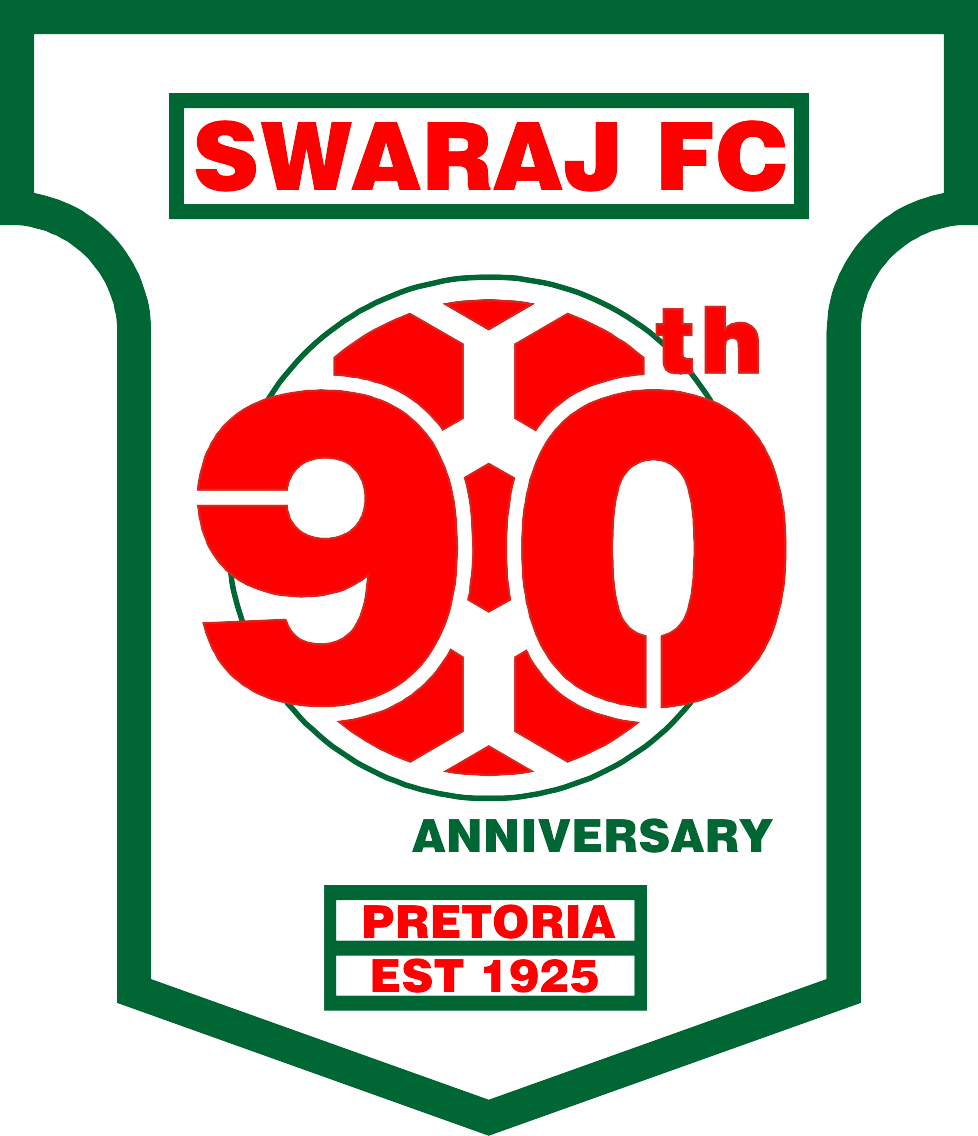
About Swaraj Football Club
Background
Swaraj Football Club was formed in 1925 in Asiatic Bazaar (Pretoria), also known as “Marabastad”. Swaraj FC has played under the auspicious of the Pretoria District Football (PDFA) for most of its existence. In 1997 an executive decision was made to register the club to the Football Association Pretoria (FAP). In 1999 Swaraj FC returned to the Pretoria District Football Association now known as the Laudium Football Association (LFA).
Swaraj FC Commitment
The officials of Swaraj FC has pledged to promote amateur football in an association who practices our values of non-racial and non-discrimination.
Swaraj FC Motto
The Swaraj motto is “Our strength lies our youth”. We firmly believe that any future begins by developing the youth. Swaraj has aggressively adopted this motto.
Swaraj FC Colours
Since its establishment in 1925 Swaraj FC’s colours was and still is RED, GREEN and WHITE. Rumour has it that the original Swaraj colours were suppose to be orange, green and white as Swaraj colours were to represent the colours of the Indian flag and commemorate the independence of India, which was awarded in 1925. Red was chosen over orange as it proved challenging to acquire soccer attire in the colour orange. It is believed that there is significant truth in this rumour as the word “Swaraj” means FREEDOM.
At the 2004 Swaraj AGM a proposal, by Mr. Sanjay Baktawar, to amend the constitution was received. One of the amendments to constitution included introducing Swaraj away colours. It was decided that the Swaraj away colours would be orange, green and white. Currently Swaraj FC plays in a home strip of RED, GREEN & WHITE and an away strip of ORANGE, GREEN & WHITE.
Swaraj FC Special achievements
Like any other club there has been trophies and league cups that Swaraj has won. However not many amateur clubs can boast having Springbok players in their midst. Swaraj FC has had during its existence 3 players selected for the South African Indian XI (then known as Springboks), ie.
- In 1934/5 Mr. Kanabathy (Bavoo) Moodley
- In 1952 Mr. Rajendrin Krishnan
- In 1958 Mr. Nithia (Dick) Moodley
Swaraj FC has also played in leagues of statue namely the Federation and TSB Leagues.
Swaraj FC through the years…
We dug through our archives and found the pictures below of Swaraj through the various decades. (Slideshow with 5 sec interval)
Congratulations Swaraj FC, well done for keeping football in Laudium alive and giving back to the community this past 90 years.
From the executive and members of Delfos Football Club.
60th Anniversary of Freedom Charter
Extracted from http://www.anc.org.za/show.php?id=72
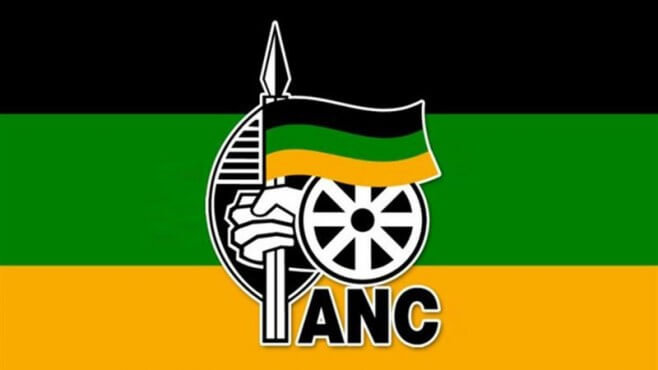
The Freedom Charter was the statement of core principles of the South African Congress Alliance, which consisted of the African National Congress and its allies the South African Indian Congress, the South African Congress of Democrats and the Coloured People’s Congress. It is characterized by its opening demand; The People Shall Govern!
In 1955, the ANC sent out fifty thousand volunteers countrywide to collect ‘freedom demands’ from the people of South Africa. This system was designed to give all South Africans equal rights. Demands such as “Land to be given to all landless people”, “Living wages and shorter hours of work”, “Free and compulsory education, irrespective of colour, race or nationality” were synthesized into the final document by ANC leaders including Z.K. Mathews and Lionel ‘Rusty’ Bernstein.
The Charter was officially adopted on June 26, 1955 at a Congress of the People in Kliptown.
The Freedom Charter
As adopted at the Congress of the People, Kliptown, on 26 June 1955
We, the People of South Africa, declare for all our country and the world to know:
that South Africa belongs to all who live in it, black and white, and that no government can justly claim authority unless it is based on the will of all the people;
that our people have been robbed of their birthright to land, liberty and peace by a form of government founded on injustice and inequality;
that our country will never be prosperous or free until all our people live in brotherhood, enjoying equal rights and opportunities;
that only a democratic state, based on the will of all the people, can secure to all their birthright without distinction of colour, race, sex or belief;
And therefore, we, the people of South Africa, black and white together equals, countrymen and brothers adopt this Freedom Charter;
And we pledge ourselves to strive together, sparing neither strength nor courage, until the democratic changes here set out have been won.
The People Shall Govern!
Every man and woman shall have the right to vote for and to stand as a candidate for all bodies which make laws;
All people shall be entitled to take part in the administration of the country;
The rights of the people shall be the same, regardless of race, colour or sex;
All bodies of minority rule, advisory boards, councils and authorities shall be replaced by democratic organs of self-government .
All National Groups Shall have Equal Rights!
There shall be equal status in the bodies of state, in the courts and in the schools for all national groups and races;
All people shall have equal right to use their own languages, and to develop their own folk culture and customs;
All national groups shall be protected by law against insults to their race and national pride;
The preaching and practice of national, race or colour discrimination and contempt shall be a punishable crime;
All apartheid laws and practices shall be set aside.
The People Shall Share in the Country`s Wealth!
The national wealth of our country, the heritage of South Africans, shall be restored to the people;
The mineral wealth beneath the soil, the Banks and monopoly industry shall be transferred to the ownership of the people as a whole;
All other industry and trade shall be controlled to assist the wellbeing of the people;
All people shall have equal rights to trade where they choose, to manufacture and to enter all trades, crafts and professions.
The Land Shall be Shared Among Those Who Work It!
Restrictions of land ownership on a racial basis shall be ended, and all the land re-divided amongst those who work it to banish famine and land hunger;
The state shall help the peasants with implements, seed, tractors and dams to save the soil and assist the tillers;
Freedom of movement shall be guaranteed to all who work on the land;
All shall have the right to occupy land wherever they choose;
People shall not be robbed of their cattle, and forced labour and farm prisons shall be abolished.
All Shall be Equal Before the Law!
No-one shall be imprisoned, deported or restricted without a fair trial; No-one shall be condemned by the order of any Government official;
The courts shall be representative of all the people;
Imprisonment shall be only for serious crimes against the people, and shall aim at re-education, not vengeance;
The police force and army shall be open to all on an equal basis and shall be the helpers and protectors of the people;
All laws which discriminate on grounds of race, colour or belief shall be repealed.
All Shall Enjoy Equal Human Rights!
The law shall guarantee to all their right to speak, to organise, to meet together, to publish, to preach, to worship and to educate their children;
The privacy of the house from police raids shall be protected by law;
All shall be free to travel without restriction from countryside to town, from province to province, and from South Africa abroad;
Pass Laws, permits and all other laws restricting these freedoms shall be abolished.
There Shall be Work and Security!
All who work shall be free to form trade unions, to elect their officers and to make wage agreements with their employers;
The state shall recognise the right and duty of all to work, and to draw full unemployment benefits;
Men and women of all races shall receive equal pay for equal work;
There shall be a forty-hour working week, a national minimum wage, paid annual leave, and sick leave for all workers, and maternity leave on full pay for all working mothers;
Miners, domestic workers, farm workers and civil servants shall have the same rights as all others who work;
Child labour, compound labour, the tot system and contract labour shall be abolished.
The Doors of Learning and Culture Shall be Opened!
The government shall discover, develop and encourage national talent for the enhancement of our cultural life;
All the cultural treasures of mankind shall be open to all, by free exchange of books, ideas and contact with other lands;
The aim of education shall be to teach the youth to love their people and their culture, to honour human brotherhood, liberty and peace;
Education shall be free, compulsory, universal and equal for all children; Higher education and technical training shall be opened to all by means of state allowances and scholarships awarded on the basis of merit;
Adult illiteracy shall be ended by a mass state education plan;
Teachers shall have all the rights of other citizens;
The colour bar in cultural life, in sport and in education shall be abolished.
There Shall be Houses, Security and Comfort!
All people shall have the right to live where they choose, be decently housed, and to bring up their families in comfort and security;
Unused housing space to be made available to the people;
Rent and prices shall be lowered, food plentiful and no-one shall go hungry;
A preventive health scheme shall be run by the state;
Free medical care and hospitalisation shall be provided for all, with special care for mothers and young children;
Slums shall be demolished, and new suburbs built where all have transport, roads, lighting, playing fields, creches and social centres;
The aged, the orphans, the disabled and the sick shall be cared for by the state;
Rest, leisure and recreation shall be the right of all:
Fenced locations and ghettoes shall be abolished, and laws which break up families shall be repealed.
There Shall be Peace and Friendship!
South Africa shall be a fully independent state which respects the rights and sovereignty of all nations;
South Africa shall strive to maintain world peace and the settlement of all international disputes by negotiation – not war;
Peace and friendship amongst all our people shall be secured by upholding the equal rights, opportunities and status of all;
The people of the protectorates Basutoland, Bechuanaland and Swaziland shall be free to decide for themselves their own future;
The right of all peoples of Africa to independence and self-government shall be recognised, and shall be the basis of close co-operation.
Let all people who love their people and their country now say, as we say here:
THESE FREEDOMS WE WILL FIGHT FOR, SIDE BY SIDE, THROUGHOUT OUR LIVES, UNTIL WE HAVE WON OUR LIBERTY
No to XENOPHOBIA…
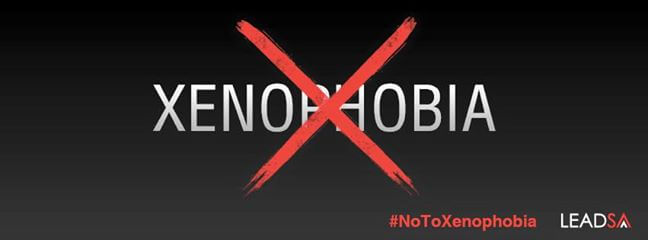
Delfos Football Club, condemns the recent attacks and acts of violence on nationals from other countries.
We call on all sports organisations and community organisations to “SAY NO TO XENOPHOBIA” and “STOP THE VIOLENCE” against our fellow human being.
In the words of our country’s greatest hero, Nelson R. Mandela: We say no to Xenophobia and any or all forms of oppression against another human being.
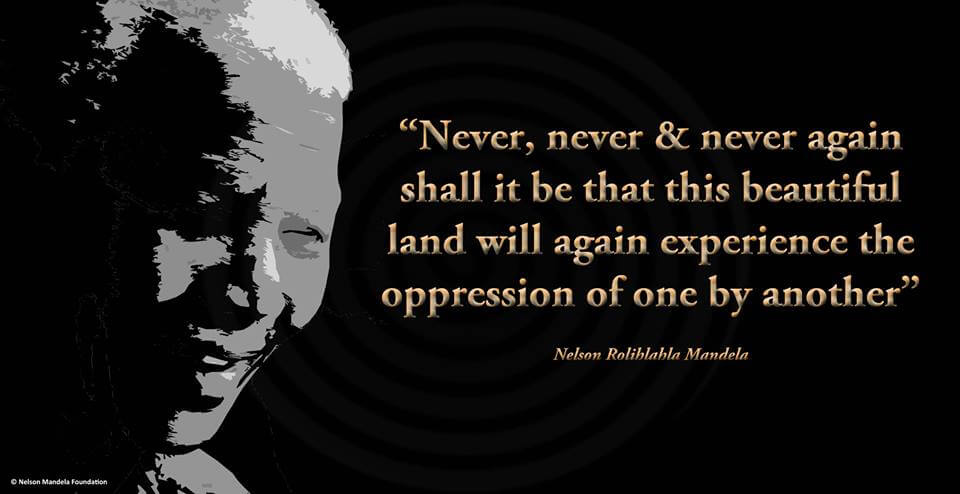
Future of football is Development…
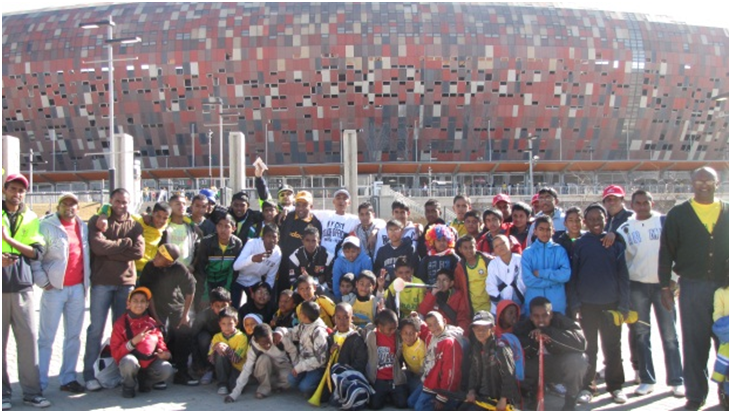
Junior excursion to Soccer City
We have always believed that the survival of any club whether amateur or professional hinges on it’s ability to develop football at grass-roots level.
FIFA’s main objectives for football development include: (http://www.fifa.com/aboutfifa/footballdevelopment/index.html)
- To develop the game for all and everywhere in the best possible conditions with and through its 209 member associations
- To promote football’s values of team play and discipline as well as education, health and well-being
- To reduce the gap between the strong and the weak and keep the uncertainty of the result
The nationwide Grassroots Development Programme assisted by FIFA was established to introduce the game to boys and girls between 6 – 12 years old. The main objective of the programme is to bring the game to the people and let as many people play and enjoy football. In addition it aims to show the positive values of football, such as respect, fair play and teamwork.
Since the 1980’s Delfos has been involved in promoting the development of Junior Soccer in Laudium. Our contribution towards such development was the establishment of the Delfos Junior academy in 1999. We had done this type of work in the past when we noticed how our young boys were idle after school hours and so we began coaching juniors at the Laudium Stadium. We were surprised at the response we received from juniors as well as parents.
To ensure that the youngsters are getting the latest in coaching, 4 of our members have been certified as coaches at grassroots level, with a further 6 planned to be certified this year at grassroots level and 3 at UEFA C Level. This is in line with the SAFA Technical Master plan and follows a development plan as follows:
- Phase – Fundamental stage (6-10 years)
- Phase – Learning to train (10-12 years)
- Phase – Training to train (12-14 years)
- Phase – Training to compete (14-16 years)
- Phase – Training to win (16-19 years)
Delfos Football Club is fortunate that due to it’s long history and ongoing commitment to football in Laudium it has been able to develop loyal members who are eager to volunteer their services when called upon to do so. We currently have established under 7, 9, 11, 13, 15 and 17 age divisions. Each division has its own coach/manager. Our coaching programme is run on Tuesday and Thursday evenings from 6pm to 7pm under floodlights when the stadium comes alive with juniors enjoying their football coaching.
Attach pic from training!!!

